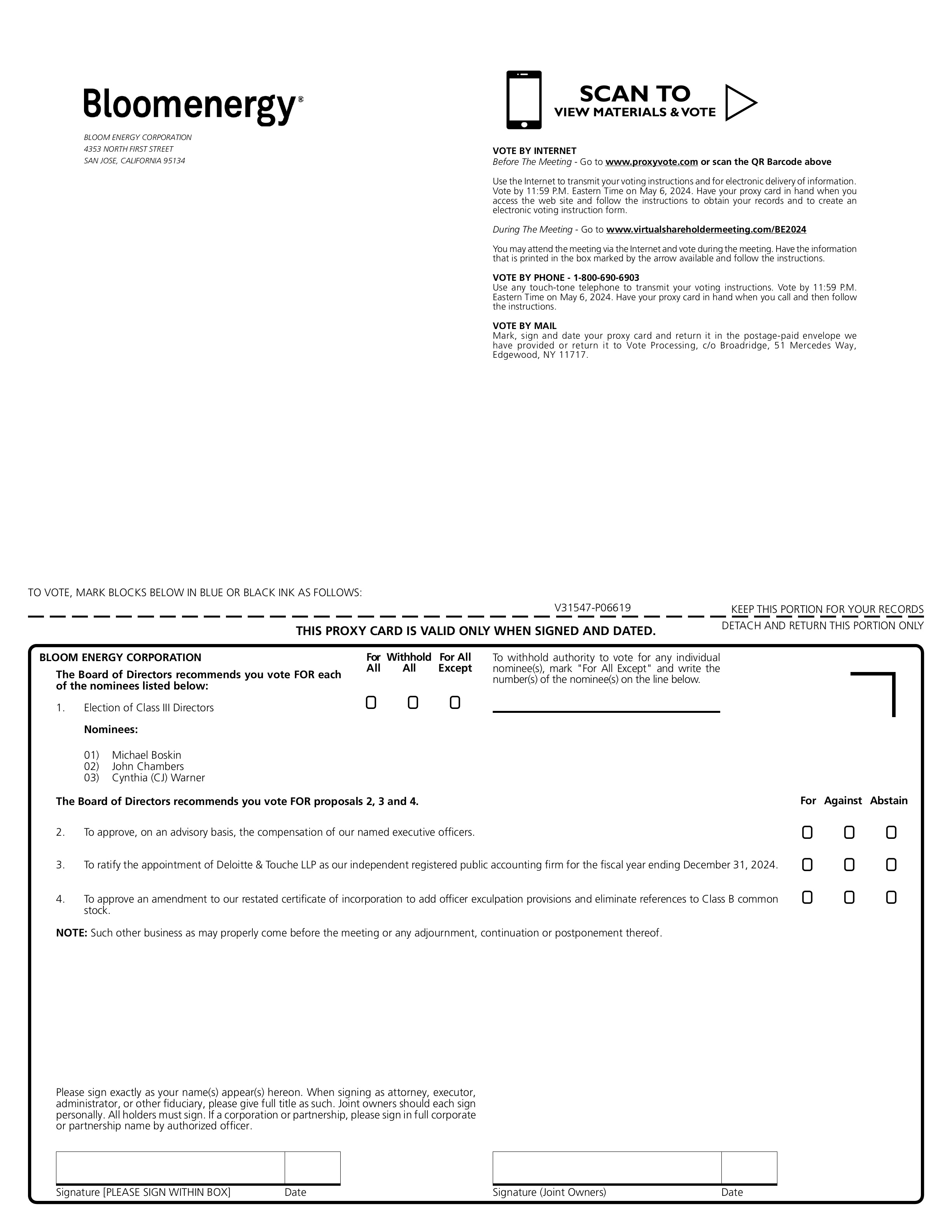0001664703PRE 14AFALSE00016647032023-01-012023-12-31iso4217:USDxbrli:pure00016647032022-01-012022-12-3100016647032021-01-012021-12-3100016647032020-01-012020-12-310001664703ecd:PeoMemberbe:EquityAwardsReportedValueMember2023-01-012023-12-310001664703ecd:PeoMemberbe:EquityAwardAdjustmentsMember2023-01-012023-12-310001664703ecd:PeoMemberbe:EquityAwardsGrantedDuringTheYearUnvestedMember2023-01-012023-12-310001664703ecd:PeoMemberbe:EquityAwardsGrantedInPriorYearsUnvestedMember2023-01-012023-12-310001664703be:EquityAwardsGrantedDuringTheYearVestedMemberecd:PeoMember2023-01-012023-12-310001664703ecd:PeoMemberbe:EquityAwardsGrantedInPriorYearsVestedMember2023-01-012023-12-310001664703ecd:PeoMemberbe:EquityAwardsThatFailedToMeetVestingConditionsMember2023-01-012023-12-310001664703be:EquityAwardsValueOfDividendsAndOtherEarningsPaidAdjustmentMemberecd:PeoMember2023-01-012023-12-310001664703ecd:NonPeoNeoMemberbe:EquityAwardsReportedValueMember2023-01-012023-12-310001664703ecd:NonPeoNeoMemberbe:EquityAwardAdjustmentsMember2023-01-012023-12-310001664703ecd:NonPeoNeoMemberbe:EquityAwardsGrantedDuringTheYearUnvestedMember2023-01-012023-12-310001664703ecd:NonPeoNeoMemberbe:EquityAwardsGrantedInPriorYearsUnvestedMember2023-01-012023-12-310001664703be:EquityAwardsGrantedDuringTheYearVestedMemberecd:NonPeoNeoMember2023-01-012023-12-310001664703ecd:NonPeoNeoMemberbe:EquityAwardsGrantedInPriorYearsVestedMember2023-01-012023-12-310001664703ecd:NonPeoNeoMemberbe:EquityAwardsThatFailedToMeetVestingConditionsMember2023-01-012023-12-310001664703ecd:NonPeoNeoMemberbe:EquityAwardsValueOfDividendsAndOtherEarningsPaidAdjustmentMember2023-01-012023-12-31
UNITED STATES
SECURITIES AND EXCHANGE COMMISSION
Washington, D.C. 20549
SCHEDULE 14A
Proxy Statement Pursuant to Section 14(a) of the
Securities Exchange Act of 1934 (Amendment No. )
| | | | | |
☑ Filed by the Registrant | ☐ Filed by a party other than the Registrant |
CHECK THE APPROPRIATE BOX:
| | | | | |
| |
| | |
| ☑ | Preliminary Proxy Statement |
| |
| ☐ | Confidential, for Use of the Commission Only (as permitted by Rule 14a-6(e)(2)) |
| | |
| ☐ | Definitive Proxy Statement |
| | |
| ☐ | Definitive Additional Materials |
| | |
| ☐ | Soliciting Material under §240.14a-12 |
Bloom Energy Corp.
(Name of Registrant as Specified In Its Charter)
(Name of Person(s) Filing Proxy Statement, if other than the Registrant)
PAYMENT OF FILING FEE (CHECK ALL BOXES THAT APPLY):
| | | | | |
| |
| | |
☑ | No fee required |
| | |
| ☐ | Fee paid previously with preliminary materials |
| | |
| ☐ | Fee computed on table in exhibit required by Item 25(b) per Exchange Act Rules 14a-6(i)(1) and 0-1 1 |
| | | | | |
| |
| Letters To Our Stockholders |
| |
| | | | | | | | | | | |
| | | |
| | | |
It's time to embrace systemic transformation across the energy landscape, and Bloom is ready and able to contribute. We come to you this year with renewed optimism that our collective ambition to transition the energy sector will help us overcome the challenges that lie ahead. Distributed technologies, including our innovative solutions, will propel the next stage of energy sector growth, and Bloom is ready to meet the challenge. KR Sridhar Founder, Chairman and Chief Executive Officer |
| |
Dear Stockholder,
It is my privilege to invite you to our annual stockholder meeting. We look forward to discussing our achievements in 2023, a pivotal year in Bloom Energy’s history, and our ongoing efforts at helping to solve the most pressing energy challenges faced by companies around the world. We are extremely proud of the progress we are making at Bloom Energy. We continue to build our company with a focus on revenue growth, profitability, and balance sheet strength, while continuing to advance our world class technology and customer solutions. In 2023, we achieved an important milestone with profitability in non-GAAP operating income, supported by strong demand for our products, a growing order book, and we overachieved on our cost reduction targets. We are incorporating artificial intelligence (“AI”) into our operations, from supply chain to service. We expect our data-driven mindset, in combination with AI, to lead to greater performance improvements and faster technology innovation. As we continue to expand our global presence, we are making huge strides to deliver solutions that reduce carbon footprints while improving air quality in the communities in which we operate. With the strength of our balance sheet, our technological advancements, and our orderbook of more than $12 billion in product and service revenue, we are well positioned to execute in 2024 and beyond.
As part of our commitment to innovation and our unique understanding of customers’ power needs, we expanded Bloom’s product suite, building on our solid oxide fuel cell platform, with two new solutions that unlock new markets and applications for us. The first is our Combined Heat and Power (“CHP”) solution, which can provide both net-zero steam for hard-to-decarbonize industrial processes as well as net-zero cooling for infrastructure, including data centers. The second is our Be Flexible™ load following solution, which provides a much-needed economical and sustainable solution for variable electricity load and demand, with up to 50% cost savings, 50% carbon reduction at reduced load, and 5x faster power ramp versus legacy solutions like diesel generators or gas turbines. Our Be Flexible solution can solve pain points for utilities for their in-front-of-the-meter applications and for customers such as AI data centers, EV charging stations, or large industrial and commercial sites for their behind-the-meter applications.
Bloom Energy’s Solutions
At Bloom Energy, we have spent the past two decades continuously innovating new solutions that can help
companies and governments address the challenges of power availability and reduced emissions.
Our Energy Servers are designed to deliver reliable electricity in microgrid configuration to customers who can’t afford power outages. Our system operates at very high availability due to its modular and fault-tolerant design, which includes multiple independent power generation modules that can be concurrently serviced while the system provides uninterrupted power from the other modules. Our Energy Servers also have the proven resiliency to withstand weather events, and other grid outages. Contrast that to the grid, which is still grappling with the increasing frequency and duration of outages caused by a number of systemic and hard to mitigate causes.
Our systems can be installed much faster than either new transmission lines or any form of large-scale power generation. This ‘Time to Power’ value proposition is particularly meaningful for manufacturers, data centers, hospitals, and retailers, especially as the local grid is increasingly unable to provide the additional power to support their growth or onshoring goals. Bloom Energy solutions can be operational in months, whereas other power providers and the grid itself are often unable to serve customers for a period of years.
The Bloom Electrolyzer opens new markets, partnerships, and geographies for us. The fifteen years of expertise we have accumulated from building, installing, and operating fuel cell systems is being leveraged to advance the electrolyzer systems we can deploy. In 2023, we deployed the world’s largest solid oxide electrolyzer at NASA’s Ames Research Center, located in Mountain View, California. At its high efficiency, the Bloom Electrolyzer uses less electricity to produce hydrogen than other electrolyzers, potentially lowering the overall cost of producing hydrogen, a critical factor in accelerating the transition to hydrogen as a fuel. The Idaho National Laboratory (“INL”) analyzed the efficiency of the Bloom Electrolyzer in producing hydrogen from electricity and steam from a nuclear facility and concluded that it was the most efficient electrolyzer that they had ever tested.
Tomorrow’s Energy Landscape
Digital transformation, AI, electric vehicles, the onshoring of manufacturing, and the electrification of everything are all increasing demand for electricity at a rate not seen in decades. By some estimates, these trends may drive demand for electricity up to ten times more than the average annual growth rate that utilities have experienced
during the past four decades. The nationwide forecast for electricity demand shot up from 2.6% to 4.7% growth over the next five years, with grid planners now forecasting a peak demand growth of 38 gigawatts (“GW”) in the next four years alone, requiring rapid planning and construction of new generation and transmission. In California, the lack of generating capacity regularly leads to emergency declarations and requests for residents and businesses to reduce their load and even export power from onsite resources, including the growing fleet of dirty diesel generators. To serve California’s surging energy demand with solar and wind alone, the required amount of storage, transmission, and capacity additions are projected to drive wholesale electricity rates up an additional 65%. In Asia, there are projections that total energy consumption will double from 2020 to 2050, driven by increasing populations and fast-growing economies. As utilities are increasingly unable to meet the surging demand for power, customers will need distributed solutions, independent of the grid, to ensure their power needs can be met with reliability, efficiency, and affordability.
In addition to rapid demand growth, the grid is now facing resiliency challenges as well as shortages of power generation and transmission infrastructure. Threats to grid resiliency include extreme weather events (with more than 20 incidents in the U.S. causing $1 billion or more in damages each in 2023), aging transmission and distribution systems, a wave of retiring generation assets (from both fossil and nuclear fuel sources), and unprecedented load growth that is far outpacing the installation of new renewable resources. In the last 10 years, all new renewable power capacity installed in the U.S. produced less electrical energy than the deficit created by retired coal and nuclear power plants. On the transmission side, while the National Renewable Energy Laboratory estimates that 90,000 miles of high-voltage transmission lines are needed to meet the projected demand growth, less than 700 miles were built in 2022.
For all of these reasons, energy security and power availability are top-of-mind for governments and the CEOs and boards of major companies. We see this reflected in our inbound inquiries and in the conversations that our sales teams are having with customers.
Data Centers: Powering AI
No industry better illustrates the confluence of these supply and demand dynamics than data centers. A recent report by Morgan Stanley estimates that Generative AI power demand will reach 224 terawatt hours by 2027, equivalent to more than 75% of total global data center power use in 2022. This market may not be served by the grid alone, but also by alternative power solutions such as Bloom’s Energy Server. In key data center markets like Northern Virginia and Silicon Valley, the capacity of the local grid has fallen far short of the growing demands of the data center industry.
Bloom’s Energy Server is flexible, rapidly deployable, and scalable. For the past year, Bloom has been engaged with several leading companies in the AI space, actively working with CEOs and their technical teams on design configurations and implementation scenarios for greenfield data center projects where the utility companies have made it clear that they cannot be counted on to provide power in the next several years. Based on this work, and in the absence of reliable and timely power from the grid, we believe Bloom represents
customers' best alternative for fast, flexible, and scalable power. The market in this sector is rapidly evolving, and we will have better visibility on timing as the year progresses, but as I look ahead, I see the data center space as our most exciting growth opportunity.
Energy for the Future
When I joined world leaders, energy executives, and NGO principals in Dubai last November for the United Nations Climate Change Conference, COP28, it was clear there is increasing positive momentum to collaborate to solve global energy needs and climate problems. While progress sometimes appears slow, we are dealing with the huge task of aligning the interests of the world’s biggest industry with the energy consumption needs of more than 8 billion people. The results from this year’s conference show a step change in the willingness of these important stakeholders to harness supply and demand forces to gain further alignment and equilibrium. I have never been more confident that we at Bloom can play an essential role in this transition to lower carbon and zero carbon energy at a global scale.
In the U.S., we must take swifter action at the state and federal levels to ensure clean energy supply growth, including efforts to alleviate the interconnection bottleneck and encourage more distributed energy solutions and microgrids. The good news is that Bloom Energy provides solutions to this potent mix of challenges. Policymakers have long discussed the promise of distributed technologies, now their time has come. Customers that require lower carbon and resilient energy today with the flexibility to move to net-zero solutions in the future are turning to Bloom Energy. Our future-proof platform offers these distributed technologies in a rapidly deployable “time-to-power” offering that unlocks multiple pathways to net zero. In a world challenged by cost and complexity, our Bloom Energy Server and Electrolyzer products provide important answers to these needs. Bloom's efficient, flexible, and resilient solutions available today offer some of the most pragmatic near-term generation options to reduce cost, increase resilience, reduce greenhouse gas emissions, improve air quality, and better conserve water and land, as are the innovative operating models they enable.
It's time to embrace systemic transformation across the energy landscape, and Bloom is ready and able to contribute. We come to you this year with renewed optimism that our collective ambition to transition the energy sector will help us overcome the challenges that lie ahead. Distributed technologies, including our innovative solutions, will propel the next stage of energy sector growth, and Bloom is ready to meet the challenge. Our optimism – indeed, our momentum – will continue to be motivated by our culture’s guiding principles: Be Bold, Be Agile, and Be Inspired. This is the heartbeat of Bloom. Our leadership team is inspired every day by the work of our talented colleagues. We are eager to share our story with you at our annual meeting. I look forward to seeing you there.
Most respectfully yours,
KR Sridhar
Founder, Chairman and Chief Executive Officer
[ ], 2024
Dear Stockholder,
On behalf of the Board of Directors, I am pleased to invite you to the 2024 Annual Meeting of Stockholders. As your lead independent director and having spent almost 40 years investing in energy innovation, it is a privilege to work closely with KR Sridhar, our Chairman and CEO, my fellow Board members, and our senior management team as the Company continues to innovate and advance its solid oxide fuel cell platform to provide solutions to address the energy transition to a decarbonized world.
Our Company had a successful year in 2023. We achieved record revenue, increased our margins, and expanded our core Energy Server product with two new offerings – CHP, our baseload solution with heat capture, and Be Flexible™, our baseload solution with load following. We also strengthened our balance sheet, invested in our people, and enhanced our governance practices.
During the past year, we worked with the Company’s leadership team to complete the sunsetting of the Company’s dual-class shares, giving an equal voice to all stockholders. We also oversaw the restructuring plan intended to scale the business, support the Company’s strategic priorities, and drive multi-year growth.
I am very proud of the Company’s commitment to sound governance practices and the highly-qualified Directors who bring their strong and unique set of skills, perspectives, and experiences as they conduct the Board’s governance and oversight responsibilities. Our Board is comprised of an experienced and diverse group of individuals with qualifications spanning executive leadership, global operations, finance, human capital management, emerging technologies, public policy, strategic business development, sustainability, and the energy industry. I encourage you to review Proposal 1 beginning on page 16 for our Director profiles. As the world transitions to a net-zero carbon energy system and the Company evolves to meet the challenges of this transition, so does our Board. We believe our Board currently reflects the right mix of skills and experiences to guide the Company as we navigate through the energy transition and scale for the future. Through our ongoing Board refreshment process, we will maintain a balance of diverse skills, backgrounds, experiences, and tenure among our Directors. We are focused on ensuring the Board continues to provide effective oversight of business strategy and execution and helps advance our evolving and growing business. In 2023, we welcomed CJ Warner to the Board, a seasoned energy executive with an engineering background and more than 40 years of senior leadership and global operating experience in both traditional and renewable energy; she brings valuable skills and perspectives to the Board as we scale globally, introduce new product solutions, and advance our business development efforts.
The global energy market is vast, dynamic, and can appear slow-moving. But the big themes persist… rapid growth in demand for electricity, broad-based undersupply, and the need for carbon reduction. Today, as always, Bloom Energy is poised to fill the void. As your Lead Independent Director, I am actively engaged with Bloom’s Chairman and CEO, KR Sridhar, helping the Company remain strategically positioned to successfully grow the business.
Over the past year, to foster transparent and effective two-way communication, we continued our ongoing dialogues with stockholders. We value your input and consider it an important part of our governance process. We look forward to continuing our engagement in 2024.
On behalf of my fellow Directors, we are grateful for your support and thank you for your interest and investment in Bloom Energy.
| | | | | |
| Sincerely, Jeffrey Immelt Lead Independent Director [ ], 2024 |
| | | | | |
| |
| Notice of Annual Stockholder Meeting |
| |
| | | | | | | | | | | | | | | | | |
| WHEN
May 7, 2024
9:00 A.M. Pacific Time | | WHERE
Via live audio webcast at
www.virtualshareholdermeeting.com/BE2024 | | RECORD DATE
March 12, 2024 |
Meeting Agenda
| | | | | | | | |
| Proposal | Board Recommendation | More Information |
| | |
| | |
1. To elect the three Class III directors named in the Proxy Statement. | each director nominee | |
| | |
| | |
2. To approve, on an advisory basis, the compensation of our named executive officers, as described in the Proxy Statement. | | |
| | |
| | |
3. To ratify the appointment of Deloitte & Touche LLP as our independent registered public accounting firm for the fiscal year ending December 31, 2024. | | |
| | |
| | |
4. To approve an amendment to our restated certificate of incorporation to add officer exculpation provisions and eliminate outdated references to Class B common stock | | |
| | |
Stockholders will also transact any other business that may be properly brought before the 2024 Annual Meeting or any adjournment, continuation, or postponement thereof.
Who Can Vote and Attend. Holders of our Class A common stock at the close of business on the Record Date can attend the meeting online and vote on the proposals. Whether or not you expect to attend, we encourage you to read the Proxy Statement and vote using one of the methods described below as soon as possible so that your shares may be represented at the meeting.
Your Vote is Very Important. Holders of Class A common stock are entitled to one vote per share. If you are a registered holder and have questions regarding your stock ownership, you should contact our transfer agent, Equiniti Trust Company, LLC through its website at https://equiniti.com/us/ast-access/individuals or by phone at 1-800-937-5449.
Mailing Date. On or about [ ], 2024, we will mail to most stockholders a Notice of Internet Availability of Proxy Materials with instructions on how to access our proxy materials, including our Proxy Statement and Annual Report.
Meeting Disruptions. In the event of a technical malfunction or other situation that the meeting chair determines may affect the ability of the meeting to satisfy the requirements for a meeting of stockholders to be held by means of remote communication under the Delaware General Corporation Law, or that otherwise makes it advisable to adjourn the meeting, the chair of the meeting will convene the meeting at 9:30 a.m. Pacific Time on the date specified above and at our address at 4353 North First Street, San Jose, CA 95134 solely for the purpose of adjourning the meeting to reconvene at a date, time, and physical or virtual location announced by the meeting chair, and we will post information regarding the announcement on the investors page of our website at https://investor.bloomenergy.com.
By Order of the Board of Directors,
Shawn M. Soderberg
Chief Legal Officer and Corporate Secretary
[ ], 2024
How to Vote
| | | | | | | | | | | | | | | | | |
| BY INTERNET
Before the Meeting:
www.proxyvote.com During the Meeting:
www.virtualshareholdermeeting.
com/BE2024 | | BY TELEPHONE
1-800-690-6903 | | BY MAIL
Mark, sign, date, and promptly mail the enclosed proxy card or voting instruction form (if received) |
| | |
|
Important Notice Regarding the Availability of Proxy Materials for the Annual Meeting to be held on May 7, 2024. The Notice, Proxy Statement, and 2023 Annual Report on Form 10-K are available at www.proxyvote.com. |
|
| | | | | |
| |
Bloomenergy | 2024 Proxy Statement | 1 |
| | | | | | | | | | | | | | | | | |
Letter to Our Stockholders from Our Chairman and CEO | | | | |
| | | | Frequently Requested Information | |
Letter to our Stockholders from
Our Lead Independent Director | | | |
| | | |
| | | | | |
| | | | |
| | | | | |
| | | | |
| | | | | |
| | | | |
| | | | | |
| | | | |
| | | | | |
| | | | |
| | | | | |
| | | | |
| | | | | |
| | | | | |
| |
| | | |
| | | | |
| | | | | |
| | | | | |
| | |
| | | | | |
| | |
| | |
| | |
|
|
| | | | |
| | | | | |
| | | | | |
| | | | |
| | | | | |
| | | | |
| | | | |
| | | | | |
| | | | | |
| | | | | |
| | | | |
| | | | | |
| | | | | |
| | | | | |
| | | | | |
| | | | |
| | | | | |
| | | | | |
| | | | |
| | | | | |
| | | | |
| | | | | |
| | | | |
| | | | | |
| | | | |
| | | | | |
| | | | |
| | | | | |
| | | | |
Certain statements in this Proxy Statement, other than statements of historical fact, including estimates, projections, statements relating to our business plans, objectives and expected operating results, statements regarding our environmental and other sustainability plans and goals, and the assumptions upon which those statements are based, are “forward-looking statements” within the meaning of the Private Securities Litigation Reform Act of 1995, Section 27A of the Securities Act of 1933, as amended, and Section 21E of the Securities Exchange Act of 1934, as amended (the “Exchange Act”). In some cases, forward-looking statements may be identified by terms such as “believe,” “project,” “expect,” “anticipate,” “estimate,” “intend,” “strategy,” “future,” “opportunity,” “plan,” “may,” “should,” “will,” “would,” “will be,” “will continue,” “will likely result,” and similar expressions. Forward-looking statements are based on current expectations and assumptions that are subject to risks, uncertainties, and other factors, including those identified in our Annual Report on Form 10-K for the year ended December 31, 2023, filed with the U.S. Securities and Exchange Commission (“SEC”) and other subsequent documents we file with the SEC, which may cause actual results and outcomes to differ materially from the forward-looking statements. We undertake no obligation to update or revise publicly any forward-looking statements, whether as a result of new information, future events, or otherwise. Any standards of measurement and performance made in reference to our environmental and other sustainability plans and goals are developing and based on assumptions that continue to evolve, and no assurance can be given that any such plan, initiative, projection, goal, commitment, expectation, or prospect can or will be achieved. The inclusion of information related to our environmental and other sustainability goals and initiatives is not an indication that such information is material under the SEC’s standards. Website references throughout this document are provided for convenience only, and the content on the referenced websites is not incorporated by reference into this document.
| | | | | |
| |
2 | Bloomenergy | 2024 Proxy Statement |
Company Overview
Our leading solid oxide platform for distributed power generation and hydrogen production is changing the future of energy.
The Future of Energy Starts Here
| | | | | | | | | | | | | | | | | | | | | | | | | | | | | | | | | | | | | | | | | |
| | | | | | | | | | | | | |
Our Mission To make clean, reliable energy affordable for everyone in the world. Our Values Changing the future of energy is no small task, but our diverse group of thinkers, solvers, and dreamers are up to the challenge. Driven by a shared passion for our planet, our employees help design, produce, and distribute unique energy solutions that transform how we power our world. To achieve our mission of energy abundance without compromises, we strive to: BE Bold: We challenge the status quo using a data-driven approach to exceed our customers’ needs and solve their most complex problems. BE Inspired: Our compassion for our planet pushes us to deliver world-leading energy solutions. Our compassion and desire to do the right thing establishes trust and delivers excellence across the products we build and the customers we serve. BE Agile: We learn quickly and embrace entrepreneurship to adapt nascent ideas into best-in-class products that can enable a scalable, low-cost energy transformation. These shared values are what power our team to create a better, more sustainable future. | | Our Value Proposition |
| An unwavering passion for creating a clean, healthy, and energy abundant world. |
| Bloom Energy empowers businesses and communities to responsibly control and manage their energy and choose their path to decarbonization. |
| | | | | | | | | | | | |
| | | | | | | | | | | | |
| Resilient Uninterrupted power without compromise. | Predictable A fixed power price and high power quality. | Sustainable Addressing both the causes & consequences of climate change. | Deployable Bloom can deploy in a matter of months and reduce customers’ time to power. |
| Empowering the Future Our fuel flexible, upgradable future-proof energy generation platform unlocks multiple pathways to a net-zero future. |
| | | | | | | | | | | | |
| | | | | | | | | | | | |
| Electrolyzers We’re pioneering solid oxide technology to produce clean hydrogen using less electricity. | Hydrogen Fuel We’re leveraging our proven Energy Server technology to generate carbon-free electricity from hydrogen. | Waste to Energy With our proven Energy Server, we’re harnessing the power of greenhouse gases to create clean energy from methane. |
| | | | | | | | | | | | |
| Microgrids We have powered sites through thousands of power outages and enable customers to expand their operations in grid constrained locations. | Carbon Capture When fueled by natural gas, our Energy Server produces a pure stream of CO2, paving the way for efficient carbon capture. | Combined Heat & Power By adding Heat Capture, total system efficiency can reach efficiency > 90% and improve economics. |
| | | | | | | | | | | | |
| | Be Flexible By combining our load following inverters with the right level of redundancy and battery storage, Bloom’s Be FlexibleTM solution can match the customer's load profile, with the ability to ramp fast and sustain the customer's load dynamic. |
| | | | | | | | | | | | |
| | Reliability Modular design allows our Energy Server to reach up to 99.999% reliability and is available to serve critical customer loads. |
| | | | | | | | | | | | |
| Our innovations have set a path to achieve not only meaningful carbon reductions within our own operations, but also the decarbonization of energy across the globe in dozens of sectors. |
|
| | | | | | | | | | | | | |
| | | | | | | | | | | | | |
| | | | | |
| |
Bloomenergy | 2024 Proxy Statement | 3 |
A Resilient, Energy Conversion Platform Designed for a Net-Zero Future
Our modular, scalable, and configurable solid oxide platform is capable of providing a variety of sustainable power solutions: from the generation of zero-carbon electricity to the production of clean hydrogen. We continue to evolve and expand our offerings as we pursue our mission to make clean, reliable energy affordable for all.
Microgrids
Bloom’s Microgrid and Advanced Bloom Microgrid offerings have grown to become an important solution to an increasingly unreliable centralized power grid. Our microgrids do not depend on transmission lines or the larger distribution system, eliminating the risk of being cut off from power due to natural disasters and have proven resilient during hurricanes, earthquakes, fires, and more. These microgrids can be installed alongside batteries and solar panels to increase flexibility and reliability. Globally, more than 170 Bloom microgrids maintain power supply for hospitals, supermarkets, data centers, high-tech manufacturers, university campuses, and more.
Waste to Energy
The solid oxide fuel cells in the Energy Server provide an electrochemical pathway to convert methane in natural gas or biogas directly into electricity without combustion. We have pioneered the cleanup of biogas as fuel on-site for our Energy Server operation, without the need for pipeline-quality biomethane. On-site biogas use avoids the release, combustion, or flaring of harmful methane. When the Energy Server uses treated biogas as a fuel, it has a similar emission profile as natural gas but a lower, and potentially even negative, lifecycle carbon intensity.
Carbon Capture Utilization & Storage (“CCUS”)
When operating on hydro-carbon fuel like natural gas, the non-combustion nature of Bloom’s Energy Server product generates a relatively pure stream of CO2 devoid of nitrogen oxides, sulfur oxides, and other impurities that are difficult or expensive to separate. Pairing the Energy Server with existing exhaust processing technologies, we can isolate a highly purified stream of CO2 that can be used or sequestered more economically than traditional forms of power generation. CCUS can partially or fully mitigate emissions from natural gas depending on the specific sequestration or utilization technologies and methods being used. When carbon capture is paired with biogas energy generation (bioenergy to carbon capture or “BECCS”) projects, complete or even negative carbon emissions can be achieved.
Combined Heat and Power
The Bloom Energy Server can be enhanced with mechanical exhaust adapters to allow for easy integration to combined heat and power (“CHP”) systems. The high temperature cathode exhaust from the Energy Server can be channeled, allowing the resulting exhaust heat to be
available for use. Once captured, this high temperature heat can be utilized in various applications to further increase the overall combined thermal and electrical efficiency of the system.
Be FlexibleTM
Be Flexible offers customized solutions to address variable power generation needs (when grid connected) or dynamic loads (when grid independent). From supporting the grid operators in smoothing out power oscillations caused by renewable penetration, to taking on challenging load profiles when powering critical loads in a grid independent configuration, Be Flexible is a feature that shifts the classical paradigm by which fuel cells were considered baseload generators only and positions them as the best choice for demanding applications such as AI data centers or EV charging. Our Be Flexible solution is intentionally designed with the flexibility to adapt and meet the unique needs of our customers.
Hydrogen Fuel
As production of hydrogen becomes ubiquitous, Bloom’s Energy Server is hydrogen ready. The Energy Server can operate on a combination of blended hydrogen and natural gas or 100% hydrogen. Bloom’s Energy Server products present a highly-reliable, zero-carbon, or renewable power generation option for customers.
Electrolyzers
Using the same solid oxide platform as our Energy Server, the Bloom Electrolyzer is designed to produce scalable and cost-effective hydrogen solutions more efficiently than proton exchange membrane and alkaline solutions. Our modular design makes the Bloom Electrolyzer ideal for use with both nuclear and renewable power feedstocks and can be sited flexibly to efficiently serve a variety of industrial, transport, and power sector off takers. Because of high operating temperatures and innovation, the Bloom Electrolyzer requires less energy to break up water molecules, thus producing hydrogen more cost effectively.
Reliability
The modularity of the Bloom Energy Server allows for the design of highly reliable configurations suited to a specific site’s reliability and availability needs. Our base model has exceptional reliability through high levels of Mean Time between Failure (“MTBF”) and with concurrent maintenance has low Mean Time to Repair (“MTTR”). High MTBF and low MTTR results in very high availability of power to the customer’s load. Bloom’s base Energy Server for grid-parallel systems has a 99.9% availability which is at par with utility standards. Adding redundancy over our base Energy Server model results in higher availability to the order of 99.999% suited to meet the most critical load requirements on the market.
| | | | | |
| |
4 | Bloomenergy | 2024 Proxy Statement |
Products Designed with Reliability and Sustainability in Mind
No Combustion:
Unlike traditional power generation technologies Bloom does not require combustion, eliminating harmful criteria pollutants
Commercial Trends
There are many factors driving demand for our solid oxide technology across the energy landscape, including:
| | | | | |
| |
Energy security and resilience is now a strategic imperative | The rising frequency of power disruptions caused by more severe natural disasters and extreme weather in recent years underscores a critical need for greater grid resilience. In an increasingly electrified world, power supply and reliability are critical. |
| |
| |
| Centralized systems are facing challenges with increased load demands | According to the North American Electric Reliability Corporation’s (“NERC”) 2022 Long-Term Reliability Assessment, more than half of the U.S. has a high or elevated risk of insufficient electricity supply over the next five years. With increasing penetration of intermittent generation, grid operators are finding it harder to match supply and demand. |
| |
| |
Customers are looking for energy solutions that are flexible and clean | Commercial and industrial customers need technologies that can support their growing and variable energy needs. AI data centers and EV charging stations, for example, will cause significant load growth while also needing solutions that can meet their peak energy demands. These solutions also have to reduce emissions today while positioning them for a net-zero future. |
| |
| |
| Hydrogen is key to a net-zero future | Clean hydrogen is gaining considerable attention as a flexible zero-carbon fuel and energy storage medium. It can be stored and utilized in various industrial, transportation, and power generation applications. We believe clean hydrogen will be a critical factor in the energy industry of the future. |
| |
| | | | | |
| |
Bloomenergy | 2024 Proxy Statement | 5 |
Financial Highlights
| | | | | | | | | | | | | | | | | | | | |
| Revenue | | | Product & Service Revenue | | | Product & Service Backlog |
| | | | | | |
| | | | | | |
| | | | | | |
| | | | | | |
| | | | | | |
| Gross Margins | | | Non-GAAP Gross Margins | | | |
| | | | | | |
| | | | | | |
| | | | | | |
| | | | | | |
| | | | | | |
| | | | | |
| |
6 | Bloomenergy | 2024 Proxy Statement |
2023 Business Highlights
| | | | | | | | |
| | |
| Demonstrated Bloom Electrolyzer capability: We held a successful demonstration of our Bloom Electrolyzer technology, producing 2.4 metric tonnes of hydrogen per day. Our 4 megawatt (“MW”) Bloom Electrolyzer is a high-temperature, high-efficiency unit, producing 20-25% more hydrogen per MW than commercially demonstrated lower temperature electrolyzers such as proton electrolyte membrane (“PEM”) or alkaline. Idaho National Lab testing has shown the Bloom Electrolyzer to be the most efficient technology available at the time of testing. | |
| | |
| | |
| Strengthening our balance sheet: Our market reach continues to grow, with revenues for 2023 setting a new company record of $1.33 billion, up 11% from 2022. Our focus on cost reductions helped us improve our gross margins to 14.8%, up from 12.4% in 2022 (non-GAAP gross margins were 25.8%, up from 23% in 2022). Our product and service backlog, a key indicator of future growth, grew to $12 billion at the end of 2023, up from $10 billion in 2022. In May, we issued the 3% Green Convertible Senior Notes due June 2028 with an aggregate principal amount of $632.5 million, We also consolidated our production facilities in California at our Fremont, California multi-gigawatt factory. | |
| | |
| | |
| Expanded our relationship with SK ecoplant: In December, we expanded our partnership with SK ecoplant through an incremental purchase commitment of 250MW through 2027 and we extended the timing of delivery of the remaining take-or-pay commitment under the original agreement and changed it to a minimum purchase agreement. | |
| | |
| | |
| Successfully expanded into new international markets: In August, we commissioned a 10MW Energy Server in Taiwan and we also expanded our presence in Asia with a signed contract in Thailand. During 2023, our business development teams completed new market entry milestones in Germany, the United Kingdom, and Northern Europe. | |
| | |
| | |
| Deployed first Fuel Cell CHP plant in Europe: Our versatile energy platform, with its Combined Heat and Power (“CHP”) solution, utilizes a high temperature (>350°C) exhaust stream for industrial steam production and absorption chilling. In partnership with Cefla, we deployed the first fuel cell co-generation plant in Europe to address gas reduction goals in the EU. | |
| | |
| | |
| Indispensable technology in the data center and AI market: The data center market is facing significant growth and power challenges due to the increase of AI and EV loads. Due to our ability to deliver clean, reliable, and onsite power in months instead of years, this sector has become an important component of our pipeline. With the recent announcement of our Be Flexible offering, our products are well-positioned to serve this market with dynamic load following, power stability, and the modularity and fuel flexibility to advance the data center market into the hydrogen-fueled infrastructure of the future. | |
| | |
| | | | | |
| |
Bloomenergy | 2024 Proxy Statement | 7 |
Introduction
The health and well-being of our people, our communities, and our planet matter greatly to Bloom Energy. While our focus is firmly established, our formal processes, strategies, and governance concerning sustainability matters continue to evolve. We are actively engaged in dialogue with various stakeholders regarding their interest in our performance regarding corporate responsibility and sustainability. Our Board of Directors and the Nominating, Governance, and Public Policy Committee (the “Nominating Committee”) of the Board oversee the sustainability program.
We are also committed to transparency with respect to our sustainability initiatives. Since 2021, we have issued an annual Task Force on Climate-related Financial Disclosures (“TCFD”), Sustainability Accounting Standards Board (“SASB”), and Global Reporting Initiative (“GRI”) aligned Sustainability Report. In April 2024, we plan to publish our fourth Sustainability Report, which will be available on our website at bloomenergy.com/sustainability, and provides more information regarding greenhouse gas emissions, workforce diversity reporting, and other topics. Please note that our 2024 Sustainability Report is not a part of our proxy solicitation materials.
| | | | | |
| |
8 | Bloomenergy | 2024 Proxy Statement |
2023 Sustainability Highlights
| | | | | | | | | | | | | | | | | | | | | | | |
Climate | | | Waste | | | Governance | |
| | | | |
| | | | | | | |
992,481 tonnes of avoided carbon emissions from our fuel cell projects 60,000 tonnes of avoided carbon emissions from our certified gas program | | 3,559 tonnes of material recycled through our repair and overhaul operations 99% recycling or reuse rate of our product materials at end of life | | Physical Climate Risks quantified through our first forward scenario exercise and integrated into our enterprise risk management (“ERM”) program |
| | | | | | | |
| | | | | | | |
| Air Quality | | | Supply Chain | | | Community | |
| | | | |
| | | | | | | |
$19-42 million savings to local health-care systems throughout the U.S. by emissions avoided from our non-combustion technology | | 96% of suppliers responded to our conflict minerals supplier survey up from 92% in 2022 | | $337,000 raised through expansion of our Bloom Energy Stars & Strides Community Run/Walk |
| | | | | | | |
| | | | | | | |
| Water | | | Product | | | Employees | |
| | | | |
| | | | | | | |
39 billion gallons of water withdrawal avoided from central station power plants nationally | | 90% Combined efficiency available from our new CHP solution 4MW Bloom electrolyzer demonstration deployed, the world’s largest solid oxide installation | | 66% of U.S. employees are ethnically diverse 10 years of manufacturing excellence in Delaware celebrated |
| | | | | | | |
| | | | | |
| |
Bloomenergy | 2024 Proxy Statement | 9 |
Living Our Purpose
Now, more than ever before, people are looking for purposeful and fulfilling work. At Bloom, we recognize the importance of communicating our mission clearly, living our core values, and connecting our employees to our purpose. This means addressing climate change and its impacts, changing the future of energy by leading the
world’s energy transition and how we power the world, underscoring the important role our employees have in advancing our mission and making the world a better place, as well as doing the right thing for the greater good of our society and our stakeholders.
Taking Care of Our Employees
Our achievements are possible thanks to our global workforce of skilled and diverse workers. We are dedicated to creating a workplace, everywhere in the world, where our employees feel valued and engaged in meaningful work. Just as our people support and advance our mission, we aim to foster a culture of innovation, respect, collaboration, and transparency that enables our employees to thrive and grow their connection to Bloom’s purpose. To attract and build a strong, diverse talent pipeline, we partner with local communities, universities, and industry groups. We strive to maintain a safe, inclusive, and engaging workplace, with opportunities for
our employees to grow in their careers, supported by strong compensation, benefits, and health and wellness programs.
At Bloom, we communicate our mission clearly, live our core values, and connect our employees to our purpose: to make clean, reliable energy affordable for everyone in the world. Building solutions to address decarbonization and energy security requires us to have an employee base that is committed to working in an innovative and collaborative manner and requires management to create a safe, welcoming environment with clear communication of priorities and company direction.
Talent Acquisition and Development
To attract, retain, and diversify our exceptionally talented workforce, we continue to evolve our hiring strategies, track our progress, and hold ourselves accountable to advancing global diversity. These efforts are led by our Human Resources department and overseen by the Board. An important part of our talent acquisition strategy centers on recruiting candidates from underrepresented groups through targeted advertising and localized events.
We have enhanced our talent program through the introduction of a comprehensive Talent Management System designed to link performance and contribution to business results, enabling each employee to make a direct connection between their contributions and the success of Bloom. This comprehensive program includes goal setting, monthly check-ins, feedback solicitation, self-assessments, and an annual contribution assessment conversation meant as much as an opportunity to have career development discussions as to provide constructive feedback. Our Talent Management System provides employees with the resources required to
achieve their goals and engage in meaningful feedback discussions with their managers, leading to development, exposure to new experiences, and real-time learnings.
In 2023, we continued our Effective Interviewing course for hiring managers and interviewers, and provided a series of global employee learning sessions to support our employees’ ability to effectively engage with their managers.
At Bloom, we invest in our employees' progress. This past year we launched Bloom Energy University, an enterprise learning system designed to empower our people and increase their career advancement. The program is designed to promote engagement and equip employees with the skills to help Bloom build a cleaner, more energy-abundant world. In 2023, close to 300 employees went through a management development program and 216 individual contributors went through a series of online trainings. We also held regular Be Inspired sessions to help with business literacy and technology learnings.
| | | | | |
| |
10 | Bloomenergy | 2024 Proxy Statement |
Promoting Inclusion and Diversity
Since our founding, we have been committed to advancing inclusion and diversity across our organization. We endeavor to foster a work environment that values each person and contribution while promoting diversity of thought, positive engagement, and productivity. We recognize that having a multi-faceted team—with a wide array of knowledge, skills, life and professional experience, and viewpoints—fuels our innovation and growth. One of our greatest strengths is the diversity of our employees, and we believe diverse leaders serve as role models for our inclusive workforce.
We continuously evolve our hiring strategies, track our progress, and hold ourselves accountable to advancing global diversity. We seek to hire employees from a broad pool of talent with diverse backgrounds, perspectives, and abilities, and we believe diverse leaders serve as role models for our inclusive workforce. Our Effective Interviewing course for hiring managers and interviewers covers unconscious bias.
Our continued engagement with organizations that partner with diverse communities have been essential to our efforts to increase women, veteran, and minority representation in our workforce. At the end of 2023, ethnic minorities represented 66% of the Bloom U.S. population and 43% of the leadership population (Directors and above). Bloom Energy Women Leaders (“BEWL”) is an employee group aiming to create and encourage a Bloom culture where women leaders thrive. BEWL is open to all employees and consists of members from all levels of leadership. Women at Bloom represent 25% of the population and BEWL is one example of the efforts the company is engaging in to increase the percentage of women in leadership positions (15%).
| | | | | |
| FEMALE EMPLOYEES | 2023 |
| All Employees | 25 | % |
| Directors and above | 15 | % |
| |
| ETHNICALLY DIVERSE | 2023 |
| All Employees (US only) | 66 | % |
| Directors and above | 43 | % |
We partner with several veteran search firms to identify talent leaving the military. At the end of 2023, 7% of our workforce has a military background, including 33% in the Service organization. In Delaware, we have worked with the Dover Air Force base and the Delaware National Guard for hiring events. Bloom was awarded the Warrior Friendly Business award for 2023 by the Delaware National Guard. Our continued engagement with organizations that work with diverse communities has been vital to our efforts to increase women and minority representation in our workforce. Our “Careers at Bloom Silicon Valley” campaign targets recruiting diverse talent from underserved communities for hourly manufacturing roles. To promote inclusivity, we advertise our jobs in multiple languages and participate in community job fairs giving equal access to opportunities.
In line with our mission, in 2023 we also launched the inaugural Colin Powell - Bloom Energy Innovation Fellowship. We partnered with City College of New York Colin Powell School for Civic and Global Leadership to identify a dozen summer interns. These are students from underrepresented minorities, with the majority of them being the first to attend college in their family. We also have partnerships with a number of historically black colleges and universities, including Delaware State University and Howard University.
| | | | | |
| |
Bloomenergy | 2024 Proxy Statement | 11 |
Our Board at a Glance (learn more on page 23) | | | | | | | | | | | | | | | | | | | | | | | | | | |
Name and Primary Occupation | Career Highlights | Age | Director Since | Committees | Other Current Public Company Boards |
| AC | CC | NC |
| Continuing Class I Directors |
| Mary K. Bush President Bush International, LLC Independent | •30+ years advising U.S. corporations and foreign governments •Held several Presidential appointments in banking and international finance | 75 | 2017 | C* | | | 1 |
| | | | | | | | |
| | | | | | | | |
| KR Sridhar Founder, Chairman & CEO Bloom Energy | •20+ years at Bloom Energy as Founder, Chairman & CEO •Former Professor of Aerospace and Mechanical Engineering •Former advisor to NASA | 63 | 2002 | | | | 1 |
| Continuing Class II Directors |
| Jeffrey Immelt Lead Independent Director Venture Partner New Enterprise Associates, Inc. Former Chairman & CEO General Electric Independent | •15+ years leading GE as CEO/Chair •Named one of the “World’s Best CEOs” 3x by Barron’s •Former Chair of the President’s Council on Jobs and Competitiveness under the Obama Administration | 68 | 2019 | | C | | 3 |
| | | | | | | | |
| | | | | | | | |
| Eddy Zervigon CEO Quantum Xchange Independent | •Former CPA at PwC •15 years as a Managing Director at Morgan Stanley where he worked with us during our early growth stages •CEO of Quantum Xchange, a cybersecurity company | 55 | 2007 | M* | | C | - |
| | | | | | | | |
| Nominees for Election as Class III Directors |
| Michael J. Boskin Professor of Economics & Hoover Institution Senior Fellow Stanford University Independent | •50+ years as Stanford University faculty member •Former chairman of the President’s Council of Economic Advisors •20+ years on ExxonMobil board | 78 | 2019 | M | | M | 1 |
| | | | | | | | |
| | | | | | | | |
| John T. Chambers Founder & CEO JC2 Ventures Former Chairman & CEO Cisco Independent | •20+ years leading Cisco Systems as CEO/ Chair •Global Ambassador of the French Tech •Named a “Best-Performing CEO in the World” from Harvard Business Review and received the “Edison Achievement Award for Innovation.” | 74 | 2018 | | M | | - |
| | | | | | | | |
| | | | | | | | |
| Cynthia (CJ) Warner Former President and CEO Renewable Energy Group Independent | •Former President and CEO of Renewable Energy Group, a leading international producer of low carbon, bio-based diesel •Named “Director of the Year, Corporate Governance” by the Corporate Directors' Forum in 2023 and “Alumni of the Year, 2023” by Vanderbilt University | 65 | 2023 | M* | | M | 2 |
| | | | | | | | |
| | | | | | | | | | | |
| AC | Audit Committee | C | Chair |
| CC | Compensation and Organizational Development Committee (“Compensation Committee”) | M | Member |
| NC | Nominating Committee | * | Audit Committee Financial Expert |
| | | | | |
| |
12 | Bloomenergy | 2024 Proxy Statement |
We maintain an engaged and attentive Board. All directors attended at least 75% of all Board and committee meetings during the period in which he or she was on the Board or committee in 2023, with an average attendance of 99%.
| | | | | | | | | | | |
| 5 | 5 | 4 | 4 |
Board Meetings. Directors also participated on calls in between formal meetings. | Audit Committee Meetings | Compensation and Organizational Development Committee Meetings | Nominating, Governance and Public Policy Committee Meetings |
Board Composition (learn more on page 16) Our directors reflect a range of tenures and diverse experiences that support our strategy with relevant expertise.
| | | | | | | | | | | |
Tenure (non-employee directors) | Diversity | Independence | Age |
| | | |
| | | |
Director Experience (learn more on page 17) When selecting directors to join our Board, we seek candidates with:
| | | | | | | | | | | |
| 100% | 100% | 100% | 100% |
| of Directors | of Directors | of Directors | of Directors |
| | | |
Extraordinary Leadership Qualities | High Personal and Professional Integrity and Ethics | Diversity of Thought | Demonstrated Experience in Strategy, Risk Management, and Driving Change and Growth |
| | | | | |
| |
Bloomenergy | 2024 Proxy Statement | 13 |
Governance Practices (learn more on page 30) Our corporate governance practices are designed to support effective Board oversight, the execution of our strategy, and alignment with stockholder interests, including:
Stockholder Engagement (learn more on page 44) We engage with our stockholders on both the portfolio management and stewardship sides. On the portfolio management side, our investor relations team, CEO, and CFO regularly communicate with stockholders and attend conferences. We also host an Investor Conference to share our vision and plans with investors. On the stewardship side, our management team proactively interacts with our stockholders throughout the year to better understand their perspectives on significant issues. The feedback from these meetings, and from our stockholder engagement in general, is shared with our Board and the relevant Board committees.
Stockholder Engagement in Calendar Year 2023
| | | | | | | | | | | |
| Conferences | Bloom Investor Conference | Proactively Contacted for 1-on-1 Meetings | Topics Discussed |
| | | |
9 | 60 | >50% of unaffiliated Shares | Financial Performance Strategic Positioning Operational Priorities Corporate Governance Executive Compensation Sustainability Initiatives |
| Conferences | Investors |
| |
| |
>200 Firms | 3-Hour |
Global | Showcase Event |
| | | |
| | | | | |
| |
14 | Bloomenergy | 2024 Proxy Statement |
Executive Compensation Highlights (learn more on page 54) Our 2023 executive compensation program emphasized pay for performance. Highlights included:
•Emphasis on Performance-Based Incentives. A majority of the target compensation provided to our named executive officers (“NEOs”) was performance-based and varied based on the achievement of certain operating and financial metrics.
•Challenging Performance Objectives. The Compensation Committee set rigorous goals for our annual cash incentive (“ACI”) plan, which would only be met if we performed at a high level. Based on our performance in 2023, our continuing NEOs received payouts at 81% of their target.
•3-Year Performance Periods for Performance Share Units (“PSUs”). The Compensation Committee introduced long-term PSUs with a 3-year performance period (“LPSUs”), representing at least half to two-thirds of total target equity compensation for our NEOs, based on 3-year Product and Service Revenue compound annual growth rate (“CAGR”) and 3-year average non-GAAP Gross Margin.
•Equity Incentives to Reward Near-Term Operational Execution. In addition to the LPSUs with financial goals, a small portion of equity granted to our NEOs – approximately 8% of the total target equity compensation – was awarded in the form of PSUs with a 1-year performance period based on the achievement of pre-specified operational goals (“APSUs”).
| | | | | |
| |
Bloomenergy | 2024 Proxy Statement | 15 |
| | | | | | | | |
| | |
| PROPOSAL 1 | |
| | |
| | |
Election of Directors |
| | |
 The Board of Directors unanimously recommends a vote FOR the election to the Board of Directors of each of the Class III director nominees, Michael Boskin, John Chambers, and Cynthia (CJ) Warner, each for a three-year term. The Board of Directors unanimously recommends a vote FOR the election to the Board of Directors of each of the Class III director nominees, Michael Boskin, John Chambers, and Cynthia (CJ) Warner, each for a three-year term. |
Our Board Structure. Our Board is divided into three classes, each with staggered three-year terms. As a result, only one class of directors is elected at each annual meeting, with the other two classes continuing for the remainder of their respective three-year terms. Each director’s term will continue until their successor is elected and qualified, or until their earlier death, resignation, or removal. The Board has seven members.
Nominees. The Nominating Committee and the Board have carefully considered the qualifications of the nominees and believe they are well qualified to serve on the Board. The nominees possess considerable professional and business experience, and as a group, they have the appropriate skills to exercise their oversight responsibilities.
If a Nominee is Unable to Serve. The nominees have consented to being named as nominees in the Proxy Statement and have agreed to continue serving as directors, if elected. If any nominee becomes unavailable to serve for any reason before the election, which is not anticipated, your proxy authorizes management to vote for another person nominated by the Board or the Board may reduce its size.
Vote Required. Directors will be elected by a plurality of votes cast. That means the three nominees receiving the highest number of votes will be elected. Withhold votes and broker non-votes, if any, will not affect the outcome of the vote.
Board Composition
Board Membership Criteria
The Nominating Committee is responsible for reviewing the skills and experiences desired in directors, in light of the company’s current business conditions, short- and long-term strategic initiatives, and existing competencies and experience on the Board. They also make recommendations regarding the size and composition of the Board.
All directors should have the following attributes:
•The highest personal and professional integrity, ethics, and values, consistent with our Global Code of Business Conduct and Ethics, available on Bloom’s website at www.bloomenergy.com
•A commitment to building stockholder value
•Familiarity with and respect for corporate governance requirements
•Sufficient time to carry out duties as a director
•An appreciation for and an ability to work in a collegial manner with a diversity of backgrounds, experiences, and thoughts
•Has professional skills and experience that align with the needs of Bloom’s current and long-term business strategy and complements the experience represented on the Board.
| | | | | |
| |
16 | Bloomenergy | 2024 Proxy Statement |
Director Skills and Experience
The Board has identified key skills and experiences that are important to be represented on the Board as a whole, in light of the Company’s business strategy and expected future business needs. Listed below are the skills and experience our Board considers important to effectively oversee our current and long-term business strategy, execution, and risk management, including the unique challenges we face as a developer, manufacturer, and provider of new, innovative technology and products in the complex, policy-driven, regulated energy industry that is undergoing substantial change. The table below summarizes how these key skills and experiences are linked to the Company’s core business needs and priorities.
| | | | | | | | | | | |
| | | |
| Public Company
Board Experience | Experience as a board member of another publicly traded company As a relatively new public company, we aspire to high governance standards and seek to have directors with a broad knowledge of corporate governance practices, board management, relations between the board and senior management, agenda setting, and succession planning. This experience supports our goal of board and management accountability, transparency, and protection of stockholder interests. | |
| | | |
| | | |
| Senior
Leadership | Experience serving as the Chief Executive Officer or other senior leadership role of an organization Serving in senior leadership positions, including as CEO, provides a demonstrated record of leadership and a a practical understanding of enterprise structure, operations and management, strategy, risk and risk management, and the methods to drive change and growth. As a company that has and should continue to undergo evolving strategies and growth, leadership experience in a large or complex organization provides experience and expertise to our management team in leading, developing, and scaling the company. | |
| | | |
| | | |
| Global Business/
International | Experience doing business internationally Growing our business outside the U.S. is a key part of our strategy for growth as a global provider of technology solutions for energy. Directors with global business or international experience provide valuable perspectives on diverse business environments, economic conditions, and culture, | |
| | | |
| | | |
| Financial/
Accounting/
Capital Markets | Experience or expertise in financial accounting and reporting, the financial management of an organization, or experience in corporate borrowing and capital markets We seek to have directors with an understanding of accounting, finance, and financial reporting processes to monitor and assess our operating and strategic performance as often characterized in financial metrics and to ensure robust controls and accurate financial reporting as these are critical to our success. We currently have three directors who qualify as audit committee financial experts (per SEC rules) and we expect all of our directors to be financially knowledgeable. Our capital structure and operations include the use of debt instruments and financing arrangements and we regularly engage in project finance to enable our customer’s use of our Energy Servers and other project development. It is important for our directors to have an understanding of the capital markets, financing, and energy project finance structures to advise on, and oversee, our project finance and corporate finance activities. | |
| | | |
| | | | | |
| |
Bloomenergy | 2024 Proxy Statement | 17 |
| | | | | | | | | | | |
| | | |
| Manufacturing/
Operations | Experience in manufacturing, supply chain, and fully integrated companies We both develop and manufacture our products, and supply chain management, factory automation, and global development of our manufacturing and related operations is critical to our ability to scale, achieve operating leverage, and grow. Directors with experience in these areas, particularly with large, global, fully integrated companies, provide valuable perspectives as our manufacturing footprint expands. | |
| | | |
| | | |
| Sales and
Marketing | Experience selling and marketing products globally and through direct and indirect channels It is imperative to our growth that we attract new customers, develop new channel partnerships, and expand the sales and marketing of Energy Servers and our new products into new territories and markets. Directors with experience in the strategy and mechanics of sales, customer acquisition and retention, marketing, channel and partnership models, and building brand awareness can support out efforts to grow our customer and channel partnership base and develop our brand. | |
| | | |
| | | |
| Human Capital
Management | Experience in developing, retaining, and rewarding employees in a global, fully integrated engineering and manufacturing organization We operate in a highly competitive employment market and we hire employees with diverse skills. Directors with experience in attracting, motivating, developing, and retaining qualified personnel in office, manufacturing, and engineering environments and succession planning are particularly important to our future success. In addition, ensuring we continue to evolve our compensation structure, employee practices, and our culture is critical to our global expansion and directors with experience or expertise in compensation practices, organizational design, and managing a diverse employee base provide valuable perspectives to our management team. | |
| | | |
| | | |
| Government/
Public Policy/
Regulatory | Experience working in a heavily regulated industry or an industry heavily influenced by policy and with regulatory and government organizations The energy industry is heavily regulated and directly affected by governmental actions and decisions. Our operations require compliance with a variety of regulatory requirements in numerous countries and involve relationships with various governmental entities throughout the world. Directors with government expertise at the federal and state level and experience developing and implementing policy will help us work constructively with governments around the world, which is critical as we attempt to develop legislation and a regulatory framework to enable adoption of our technology both in the U.S. and in select international markets. Directors who have experience working within a regulatory framework assist the Board with its oversight responsibilities regarding Bloom’s legal and regulatory compliance and its engagement with regulatory authorities. | |
| | | |
| | | |
| Energy | Knowledge or experience in the company’s specific industry Directors with energy industry experience can share with us their insight with respect to strategic and operational matters related to the complex, heavily regulated, and constantly changing energy industry. This includes experience in both the retail and wholesale energy markets and experience with both distributed generation and utilities as we seek to expand both in the U.S. and in select international markets. Knowledge of the competitive landscape provides valuable perspective as we consider partnerships and alliances in our go-to-market activities. | |
| | | |
| | | | | |
| |
18 | Bloomenergy | 2024 Proxy Statement |
| | | | | | | | | | | |
| | | |
| Strategic
Business
Development | Experience driving strategic direction and growth of an organization The energy market is in the middle of a massive transition as countries move to a zero carbon environment. As a provider of innovative power generation and other products for the energy market, the applications and products we chose to develop, the partnerships we engage in, and the product markets and territories we sell in are all strategic decisions we engage in on a regular basis. Directors who have experience developing future direction around new product development, new product markets and territories in an evolving market, and engaging in strategic decision making around future direction and evolution of a business can help guide both the Board and management team in conducting the required diligence and decision-making processes and practices to best enable strategic business development. | |
| | | |
| | | |
| Emerging
Technology/
Business Models | Experience developing a successful market adaptation of a new technology and deriving new business models Our Energy Server is a new and innovative product offering, as is the variety of applications we have developed from its core solid oxide platform. We continue to evolve the various ways in which we sell our products and attendant service offerings to drive additional growth and adapt to new or changing market conditions and requirements. Given the relative newness of our technology and resulting products, we seek directors with experience bringing new products to market and developing business models as this is important for our continued evolution and growth. | |
| | | |
| | | |
| Technology/
Science | Experience or expertise in technology or engineering Knowledge and experience in product development, materials science, chemistry, and hardware development is crucial for our continuing development and innovation with respect to our products and to the evolution of our strategy. As a high tech industrial company and an innovator in the fuel cell industry, we seek directors with technology or engineering backgrounds as our success depends on developing and investing in the continued evolution of our solid oxide platform and its applications. Technology experience will become even more important with the growth of AI and its potential impact on our business. | |
| | | |
| | | |
| Environmental/
Sustainability | Experience with environmental compliance and sustainability development As a technology company serving the energy industry, effective oversight and transparency regarding the risks and opportunities pertaining to climate change and the energy transition is critical to our growth and expected by our stockholders and other stakeholders. In addition, we place a high priority on the health and safety of our workforce, the communities where we operate, and the environment. Directors who have experience analyzing and responding to climate change, as well as assessing environmental compliance obligations and operations, can help us navigate the changing requirements around sustainability and reporting requirements and environmental risk management. | |
| | | |
| | | |
| Cybersecurity/
Information Security | Experience or expertise in cybersecurity, cloud computing, or data analytics As a provider of power generation and other energy applications, we provide a critical infrastructure asset for our customers. We provide remote monitoring of our products at our customer locations. A cyber attack on our products through our remote monitoring system or the grid as well as an attack on our own internal systems that house critical IP could have material adverse effects on our business. Directors who have experience managing cybersecurity and information security risks or who understand the cybersecurity threat landscape can provide valuable knowledge and guidance to the Board in its oversight of our cybersecurity risk management infrastructure. | |
| | | |
| | | | | |
| |
Bloomenergy | 2024 Proxy Statement | 19 |
The below chart shows how the skills and experiences identified by our Board are distributed among each of our directors. We have highlighted below the directors who possess the most expertise in each area. The lack of a mark does not mean the director does not possess that qualification or skill. The Board and the Nominating Committee believe that the combination of the various skills and experiences of the Board would contribute to an effective and well-functioning board capable of providing effective oversight of the business and quality advice and counsel to the Company’s management. The individual biographies beginning on page 23 provide additional information about how each director’s specific skills and experiences align with and further the strategic direction of Bloom. | | | | | | | | | | | | | | | | | | | | | | | | | | |
| SKILLS | Boskin | Bush | Chambers | Immelt | Sridhar | Warner | Zervigon | Total/Average |
| Public Company Board | l | l | l | l | l | l | l | 100% |
| Senior Leadership | l | l | l | l | l | l | l | 100% |
| Global Business/International | l | l | l | l | | l | l | 86% |
Financial/Accounting/
Capital Markets | l | l | | l | | l | l | 71% |
| Manufacturing/Operations | | | l | l | l | l | | 57% |
| Sales and Marketing | | | l | l | | l | | 43% |
| Human Capital Management | | l | l | l | l | l | | 71% |
| Government/Public Policy/Regulatory | l | l | | l | l | | | 57% |
| Energy | l | | | l | l | l | | 57% |
| Strategic Business Development | | l | l | l | | l | | 57% |
| Emerging Technology/Business Model | | | l | l | l | l | l | 71% |
| Science/Technology | | | l | | l | l | | 43% |
| Sustainability | | | | l | l | l | | 43% |
| Cybersecurity/Information Security | | | l | | | | l | 29% |
| INDEPENDENCE AND TENURE | | | | | | | | |
| Independent | l | l | l | l | | l | l | 86% |
| Tenure | 5 | 7 | 6 | 4 | 22 | 1 | 17 | 9 years (6.8 years for Independent Directors) |
| DEMOGRAPHICS | | | | | | | | |
| Age | 78 | 75 | 74 | 68 | 63 | 65 | 55 | 68 |
| Gender Identity | M | W | M | M | M | W | M | 71% M / 29% W |
| African American or Black | | l | | | | | | 14% |
| Asian | | | | | l | | | 14% |
| Hispanic or Latinx | | | | | | | l | 14% |
| White | l | | l | l | | l | | 57% |
| | | | | |
| |
20 | Bloomenergy | 2024 Proxy Statement |
How We Select Directors
Identifying Nominees. The Nominating Committee has the responsibility of establishing criteria, and identifying, evaluating, and recommending candidates for Board membership. The Nominating Committee works closely with the Chairman and other Board members in the identification and evaluation process. The Nominating Committee may also use outside consultants to assist in identifying candidates. In formulating its Board membership recommendations, the Nominating Committee considers advice and recommendations from stockholders, management, and others as it deems appropriate.
Stockholder Nominees. The Nominating Committee considers candidates recommended by stockholders using the same criteria as any other Board nominee candidate. Any stockholder may recommend a person for election as a director by complying with the nomination procedures set forth in the Bylaws. For more information, see the “Stockholder Proposals and Nominations” section. Evaluating Board Nominees. After a nominee is identified, the Board determines whether the nominee’s background, experience, personal characteristics, and skills will advance the Board’s goal of maintaining a Board with a diversity of skills, experiences, backgrounds, and perspectives that can provide effective oversight and governance and help
advance our evolving and growing business and strategic priorities, considering the desired characteristics discussed under “Board Membership Criteria.” For incumbent directors, the Nominating Committee also evaluates whether they should be nominated for re-election to the Board upon expiration of their term, based upon factors established for new director candidates, as well as:
| | |
|
•the extent to which the director’s judgment, skills, qualifications, and experience (including that gained due to tenure on the Board) continue to contribute to the success of the Board; •the director’s length of service on the Board; •feedback from the annual Board evaluation; •attendance and participation at, and preparation for, Board and committee meetings; •independence; •outside board and other affiliations, including any actual or perceived conflicts of interest; and •such other factors as the Nominating Committee deems appropriate. |
|
Board Diversity
The Board and Nominating Committee value diversity of backgrounds, gender/ethnicity, age, geography, education, experience, perspectives, and leadership in different fields when identifying nominees, and we assess the effectiveness of our efforts in pursuing diversity in connection with our annual evaluations. We believe representation of diverse perspectives expands the Board’s understanding of our customers, partners,
employees, investors, and other stakeholders. Although we do not have a separate diversity policy, the Board and the Nominating Committee intend to further refresh Board membership in the coming year, with a particular focus on adding directors who can contribute energy industry domain knowledge and technical experience, including experience working with utilities.
Board Refreshment
Each year the Nominating Committee and the Board evaluate the composition and size of the Board in light of the Company’s current operations, strategic initiatives, and overall industry conditions. The Nominating Committee believes that the skills, experiences, and qualifications of the directors considered as a group should provide a significant breadth of experience, knowledge, and abilities that assist the Board in fulfilling its responsibilities. The Board considers feedback received from its stockholders as part of this process. The Nominating Committee will then engage in a search process to identity qualified
candidates, which process may include the use of an independent search firm. The search firm will assess the candidates’ skills and experience and alignment with the Company’s business and strategy. Candidates are also reviewed for any legal impediment, conflict of interest, or other consideration that might prevent or interfere with service on our Board. Director candidates are interviewed by members of the Board. After completing its evaluation, the Nominating Committee makes a recommendation to the Board as to persons who should be added to the Board.
| | | | | |
| |
Bloomenergy | 2024 Proxy Statement | 21 |
Cynthia (CJ) Warner was appointed to the Board in June 2023 after being recommended by a global search firm. She was nominated by the Board after an extensive and careful search was conducted by this search firm, numerous candidates were considered, and a thorough vetting process was conducted. The search firm’s primary
functions included identifying potential candidates who meet the key attributes, experience, and skills described above, as well as compiling information regarding each candidate’s attributes, experience, skills, and independence and conveying the information to the Nominating Committee.
| | | | | |
| |
| Why Cynthia Warner was Added to the Board Leadership/Energy/Operations - Over 40 years of leadership in the traditional and renewable energy sectors, including as CEO, and holding leadership roles in technology development, operations, business development, strategy, and environment, health, and safety. Finance – More than a decade of financial responsibility and experience at Sapphire Energy, Andeavor/Marathon, and Renewable Energy Group. Global Business/International – Former CEO of an international company that produces and supplies renewable fuels. Worked and resided internationally for over 10 years, including responsibility for operations of refineries and pipeline systems on five continents. Current and former director of companies with international operations. Strategic Business Development/Emerging Technology – Developed and executed a strategy for sustainable fuels, enabling Renewable Energy Group’s market value to grow by over three times in three years. Spearheaded significant growth at Andeavor, including the acquisition of Western Refining and purchase and conversion of the Dickinson refinery to a renewable diesel plant. Transformed Sapphire Energy into a commercial scale algae bio-mass producer. Technology/Science - B.S. in Chemical Engineering from Vanderbilt University. Served as process development engineer and internal process technology consultant at Amoco Oil Company for over a decade. Currently serving on the Board of Advisors of Vanderbilt University School of Engineering. As CEO of Sapphire Energy, oversaw development of technology to produce oil from algae, successfully building and placing into operation one of the largest algae farms in the world. Appointed to the Vanderbilt University School of Engineering Academy of Distinguished Alumni in 2019. Environmental/Sustainability/Policy - More than 35 years of experience in the traditional and renewable energy sectors with an extensive background in refining and its health, safety, security, and environmental operations as well as experience with carbon credits, offsets, and other clean energy strategies. Led the groundbreaking cooperative effort with the U.S. Environmental Protection Agency to shape a framework for clean air improvements, to which the entire U.S. refining industry signed on. |
|
| |
No Tenure Limits or Retirement Age
The Board believes that our longer-tenured directors, with their deep historical and institutional knowledge, have a comprehensive understanding of the Company’s history and its evolution, and are able to leverage that knowledge to facilitate additional scale and growth. Bloom is the only stationary power solid oxide fuel cell company that has achieved commercial scale. Given the complexity of scaling a global, fully-integrated manufacturing business, and the policy-driven, regulated, and changing energy industry we operate in, we believe longer-tenured directors who have followed the Company’s progression and gained a deep understanding of its operations can add significant value as we expand into new markets and introduce new products. The Board also recognizes that
the Company is growing and that both the Company and the energy industry are evolving. The Board believes that having a mix of long- and short-tenured directors promotes a balance of views and insights and allows the Board to benefit from both the historical and institutional knowledge that longer-tenured directors possess and the fresh perspectives, new skill sets, and experiences contributed by newer directors. While director tenure is taken into consideration when making nomination decisions, the Board believes that imposing strict limits on director tenure would deprive the Board of the valuable perspectives of its most experienced members. Similarly, the Board does not believe that a fixed retirement age for directors is necessary or appropriate.
| | | | | |
| |
22 | Bloomenergy | 2024 Proxy Statement |
Our Board
Class III Directors: Standing for Election at the 2024 Annual Meeting of Stockholders
| | | | | | | | | | | | | | |
| Relevant Qualifications for Bloom: Dr. Boskin is recognized internationally for his research on world economic growth, tax and budget theory and policy, U.S. saving and consumption patterns and the implications of changing technology and demography on capital, labor, and product markets. He brings to the Board significant economic and financial expertise and provides a unique perspective on a number of issues faced by Bloom given its global operations in the energy market, including factors driving energy policy and demand in certain countries, tax and treasury functions regarding corporate financing and U.S. energy tax incentives, financing models for energy equipment, and general economic and labor trends and risks. Having served for over twenty years on the board of Exxon Mobil and given his experience with governments globally with his economic work enables Dr. Boskin to provide us with guidance on regulatory and policy issues pertaining to energy and the global energy transition. Dr. Boskin’s experience as CEO of his consultancy firm and as a current and former director of large complex global organizations provides the Board with important perspectives as Bloom seeks to scale its organization and expand globally as well as evaluate its governance and sustainability practices. |
Michael J. Boskin Age: 78 Director Since: November 2019 Committee Membership: •Audit •Nominating Other Public Company Boards: •Oracle Corporation Independent Tully M. Friedman Professor of Economics & Wohlford Family Hoover Institution, Senior Fellow, Stanford University CEO & President, Boskin & Co. |
| | | |
|
| | | |
| | | |
Professional Background •1971 – Present: Tully M. Friedman Professor of Economics and Wohlford Family Hoover Institution Senior Fellow, Stanford University •1980 – Present: CEO and President, Boskin & Co., Inc., a consulting firm •1989 – 1993: Chairman, President’s Council of Economic Advisers | Other Directorships & Memberships •Co-President, Koret Foundation, which gives grants to support educational advancement and career success of children from disadvantaged backgrounds •1996 – 2018: Director, ExxonMobil |
| | | | |
| | | | | |
| |
Bloomenergy | 2024 Proxy Statement | 23 |
| | | | | | | | | | | | | | |
| Relevant Qualifications for Bloom: Mr. Chambers’ experience as CEO and Chairman of Cisco Systems for over 20 years, scaling it through strategic development and partnerships from $1b in revenue into a global communications technology company with over $47b in revenue enables him to provide valuable insights to the Board as Bloom seeks to grow its operations globally and expand its product offerings into new markets and territories. Leading a complex, global organization through this scale of growth also provides unique perspectives on organizational structures, leadership and team development, and human capital management, which are areas of constant evolution for Bloom as a fully-integrated R&D and manufacturing company. Mr. Chambers provides experience and expertise leveraging customer and strategic partnerships for growth, which provides valuable lessons to the Board and management as Bloom seeks to develop its sales teams and channel partners. As Bloom brings new, innovative technology to market, Mr. Chambers, through his experience with new technology ventures at Cisco as well as mentoring startups, provides the Board with perspectives on commercializing new technology and developing new business models to enable scale and growth. Mr. Chambers work with governments across the world with respect to technology and economic development provides the Board with unique perspectives as Bloom seeks to expand globally in the heavily-regulated and policy-driven energy industry. Mr. Chambers brings cybersecurity expertise with his years of experience in communications technology. |
John T. Chambers Age: 74 Director Since: August 2018 Committee Membership: •Compensation Other Public Company Boards: •None Independent Founder & CEO, JC2 Ventures |
| | | |
|
| | | |
| | | |
Professional Background •2017 – Present: Founder, Chief Executive Officer, JC2 Ventures, a venture capital firm •2015 – 2017: Executive Chairman, Cisco Systems, Inc. (“Cisco”), a networking and information technology company •2006 – 2015: Chairman, Cisco •1995 – 2015: Chief Executive Officer, Cisco •1995 – 2006: President, Cisco •1982 – 1990: Senior Vice President of U.S. Operations, among other roles, Wang Laboratories, Inc., a former computer-based office information processing systems company | Other Directorships & Memberships •Chairman of the US-India Strategic Partnership Forum •Appointed Global Ambassador of the French Tech by President Emmanuel Macron of France •2017-2023: Director, Sprinklr, Inc. |
| | | | |
| | | | | |
| |
24 | Bloomenergy | 2024 Proxy Statement |
| | | | | | | | | | | | | | |
Cynthia (CJ) Warner Age: 65 Director Since: June 2023 Committee Membership: •Audit (Audit Committee Financial Expert) •Nominating Other Public Company Boards: •Chevron Corporation •Sempra Independent Former President and CEO of Renewable Energy Group, Inc. | Relevant Qualifications for Bloom: Ms. Warner brings over 40 years of business leadership experience in the traditional and renewable energy sectors which provides critical insights to the Board on Bloom’s technology, market, and customers as Bloom’s technology solutions seek to accommodate all phases of the energy transition - from resilient power generation running on natural gas or low or zero carbon biofuels and hydrogen to carbon capture solutions and electrolyzers. As a CEO and in other senior leadership roles, Ms. Warner has led product development, global operations, business development, and strategy, all of which enable her to provide perspectives on Bloom’s technology, on-going product development efforts, and its efforts to automate, scale, and expand manufacturing and attendant operations. Ms. Warner’s experience in the energy sector provides the Board with unique perspectives on strategic direction for Bloom - as to key markets for Bloom in the energy transition as well as potential customers and strategic partnerships. In particular, her experience in developing and selling renewable fuels provides the Board with insights into potential strategies and partnerships with fuel providers to complement Bloom’s hardware and solutions offerings as well as commercializing Bloom’s innovative technology in the energy landscape. Ms. Warner also adds sustainability experience to the Board with her extensive background in refining and its health, safety, and environmental operations, which is important for board oversight of Bloom’s engineering and manufacturing operations. For more information, see “Why Cynthia Warner was Added to the Board” on page 22. |
| | | |
|
| | | |
| | | |
Professional Background •2023-Present: Senior Operating Partner, GVP Climate, LLP •2019-2022: President and CEO of Renewable Energy Group, a biodiesel production company •2016-2018: EVP, Operations of Andeavor •2014-2016: EVP, Strategy and Business Development of Andeavor •2012-2014: Chairman and CEO of Sapphire Energy •2009-2011: President of Sapphire Energy •2007-2009: Group Vice President of Global Refining, British Petroleum •2005-2007: Group Vice President of Health, Safety, Security, Environmental and Technology, British Petroleum | Other Directorships & Memberships •Trustee of the Committee for Economic Development •Member of the National Petroleum Council •Board of Advisors of Vanderbilt University School of Engineering •Columbia University Center on Global Energy Policy (Executive Committee of the Advisory Board) •Board of Trustees, University of the Incarnate Word •2013-2021: IDEX Corporation •2019-2022: Renewable Energy Group, Inc. |
| | | | |
| | | | | |
| |
Bloomenergy | 2024 Proxy Statement | 25 |
Class I Directors: Terms Expiring at the 2025 Annual Meeting of Stockholders
| | | | | | | | | | | | | | |
Mary K. Bush Age: 75 Director Since: January 2017 Committee Membership: •Audit (Chair & Audit Committee Financial Expert) Other Public Company Boards: •Discover Financial Services Independent President, Bush International LLC | Relevant Qualifications for Bloom: Ms. Bush’s senior executive and leadership roles in international public and private financial institutions bring to the Board extensive experience and knowledge in capital markets, finance, and accounting oversight, particularly in areas of accounting principles, financial reporting rules and regulations, and oversight of the financial reporting process at public companies. These prior roles also provide Ms. Bush with wide-ranging experience with U.S. and foreign governments, financial regulatory systems, and risk management, all of which make Ms. Bush uniquely qualified as Chair of the Audit Committee. With her international expertise in finance and monetary policy, extensive network of global relationships, and as a past advisor to foreign governments, Ms. Bush provides valuable insights to the Board and management as Bloom seeks to expand its operations globally, provide its energy solutions to customers, utilities, and strategic partners in the U.S. and international markets, and secure financing for project development. As Bloom adapts its strategy to optimize for the evolving energy transition and growth, Ms. Bush’s expertise in developing and implementing innovative financial strategies brings expertise to the Board in both business model and strategic business development. Ms. Bush’s extensive public company board experience, having served on all significant standing committees of a public company board and having oversight of cybersecurity, provides the Board with insights on public company governance and cybersecurity practices. |
| | | |
|
| | | |
| | | |
Professional Background •1991 – Present: President, Bush International, LLC, an advisor to U.S. corporations and foreign governments on international capital markets, strategic business, and economic and governance matters •2007: Appointed by the Secretary of the Treasury to the U.S. Treasury Advisory Committee on the Auditing Profession •2006: Appointed by President George W. Bush as Chair of the congressionally-chartered HELP Commission on reforming foreign aid •Held several Presidential appointments, including the U.S. Government’s representative on the International Monetary Fund Board and Director of Sallie Mae Bank •Former head of the Federal Home Loan Bank System during the Savings and Loan crisis •Former advisor to the Deputy Secretary of the U.S. Treasury Department •Managed global banking and corporate finance relationships at New York money center banks, including Citibank, N.A., Bankers Trust Company and JPMorgan Chase Bank, N.A | Other Directorships & Memberships •Chairman, Spark the Journey (formerly known as the Capital Partners for Education), a not-for-profit organization that mentors low-income high school and college students in the Washington, D.C. area •2006-2022: Director, ManTech International Corporation •2008 – 2020: Director, Marriott International, Inc. •2012 – 2023: Director, T. Rowe Price |
| | | | |
| | | | | |
| |
26 | Bloomenergy | 2024 Proxy Statement |
| | | | | | | | | | | | | | |
KR Sridhar Age: 63 Director Since: January 2002 Committee Membership: •None Other Public Company Boards: •c3.ai, Inc. Founder, Chairman & CEO, Bloom Energy | Relevant Qualifications for Bloom: As a founder of Bloom who has guided our growth and development as both CEO and Chairman for over 20 years, Mr. Sridhar has unparalleled and in-depth knowledge of our technology, operations, employees, policy and regulatory environment, and customers. Mr. Sridhar’s depth and breadth of technical and scientific expertise in the areas of chemistry and physics and his experience with technological and manufacturing innovation, having been part of the original development team for both Bloom’s innovative solid oxide fuel cell platform and the tooling and equipment required to manufacture it, brings invaluable perspectives as Bloom continues to develop additional products and applications based on the solid oxide platform and seeks to automate, scale, and expand its manufacturing base. As CEO, Mr. Sridhar has guided the introduction of the Bloom Energy Server from its initial launch to commercialization and through that process has gained tremendous experience and expertise driving policy and regulatory initiatives and working with government agencies to aid adoption and growth of Bloom’s products in the energy landscape. Having grown the employee talent base from four original founders to over 2300 full-time employees in various global locations, Mr. Sridhar has significant experience in building a sustaining culture at Bloom and attracting, retaining, and developing a diverse workforce and he brings a unique employee perspective to Board discussions. Mr. Sridhar’s vision for Bloom’s solid oxide platform and his knowledge of the energy landscape and the political and economic conditions driving energy policy and adoption in various countries, aids the Board in its strategic planning. Mr. Sridhar also provides management’s perspective in Board discussions and brings important insights regarding our daily operations to the Board’s deliberations. |
| | | |
|
| | | |
| | | |
Professional Background •2002 – Present: Founder, Chief Executive Officer, Chairman, Bloom Energy •2009 – Present: Strategic Limited Partner, Kleiner Perkins, a venture capital firm •Former Professor of Aerospace and Mechanical Engineering, Director, Space Technologies Laboratory at the University of Arizona Former Advisor, NASA •Led major consortia of industry, academia and national labs •Served on many technical committees, panels, and advisory boards, and has several publications and patents | Other Directorships and Memberships •Member, National Academy of Engineering |
| | | | |
| | | | | |
| |
Bloomenergy | 2024 Proxy Statement | 27 |
Class II Directors: Terms Expiring at the 2026 Annual Meeting
| | | | | | | | | | | | | | |
Jeffrey Immelt Age: 68 Director Since: January 2019 Committee Membership: •Compensation (Chair) Other Public Company Boards: •Twilio Inc. •Desktop Metal, Inc. •Bright Health Group, Inc. Independent Venture Partner, New Enterprise Associates Former Chairman & CEO, General Electric (“GE”) Lead Independent Director | Relevant Qualifications for Bloom: Mr. Immelt brings to the Board more than 30 years of public company, senior executive, and boardroom experience, including nearly 20 years as Chairman and CEO of GE. His extensive public company board experience gives Mr. Immelt a strong understanding of his role as a director and corporate governance practices and this combined with his senior leadership experience provides the Board with a well-qualified lead independent director. Mr. Immelt brings to the Board experience and insights in all aspects of running a global business, including operations, finance, sales and marketing, human capital management, and strategic business development. In addition, with his experience running GE’s renewable energy and power business, Mr. Immelt provides valuable expertise to the Board regarding the traditional and renewable energy sectors, the evolving energy transition market, and its regulatory and competitive landscape. Mr. Immelt’s vast experience in the energy industry and his efforts in driving innovation, portfolio transformation, and customer focus at GE enables him to provide unparalleled guidance to the Board and management as Bloom seeks to evolve its business strategy to best capitalize on the energy transition, expand its product markets and global sales footprint, and develop channel and partnership strategies. Mr. Immelt’s experience in leading a large global organization and his efforts in transforming GE’s workplace culture and its diversity make him an asset as Chair of the Compensation Committee, overseeing human capital management, executive compensation, and succession planning. As a venture capital partner, Mr. Immelt is familiar with a number of emerging technologies and business models that inform discussions regarding Bloom’s strategic direction. |
| | | |
|
| | | |
| | | |
Professional Background •2018 – Present: Venture Partner, New Enterprise Associates, a venture capital firm •2001 – 2017: Chairman and CEO, General Electric, a diversified industrial company GE was named “America’s Most Admired Company” by Fortune magazine and one of “The World’s Most Respected Companies” in polls by Barron’s and the Financial Times during his tenure | Other Directorships & Memberships •Member, The American Academy of Arts & Sciences •Former Chair, President’s Council on Jobs and Competitiveness under the Obama Administration •2019-2022: Director, Tuya Inc. •2020-2022: Hennessy Capital Investment Corp. V Accolades •Named one of the “World’s Best CEOs” three times by Barron’s •Recipient of 15 honorary degrees and numerous awards for business leadership |
| | | | |
| | | | | |
| |
28 | Bloomenergy | 2024 Proxy Statement |
| | | | | | | | | | | | | | |
Eddy Zervigon Age: 55 Director Since: October 2007 Committee Membership: •Audit (Audit Committee Financial Expert) •Nominating (Chair) Other Public Company Boards: •None Independent CEO, Quantum Xchange | Relevant Qualifications for Bloom: Mr. Zervigon brings significant institutional knowledge regarding Bloom given his involvement with us at our early growth stages through his position with Morgan Stanley, and later as a Board director. Mr. Zervigon’s oversight of Bloom from its first product introduction in 2009 and the development of its first in kind supply chain and manufacturing operations for solid oxide fuel cells to its present scale enables him to provide a unique perspective to the Board on the Company’s culture, talent, and strengths. As a former investment banker, with global finance and capital markets expertise, Mr. Zervigon has provided valuable insights to the Board with respect to the Company’s corporate financing activities. As Bloom’s strategy seeks to utilize external financing for its global energy project development, Mr. Zervigon’s capital markets expertise continues to provide critical support to the Company’s growth. As CEO of a cybersecurity company with an innovative technology, Mr. Zervigon provides valuable insight to the Board on cybersecurity threats that could impact our customers and our internal systems, and the leading practices for the effective risk management of these threats. In addition, Mr. Zervigon’s experience introducing new technologies also enables him to provide perspectives to the Board as Bloom continues to introduce new applications of its innovative solid oxide platform and evolve its strategy to meet the needs of the energy transition and continued growth. Mr. Zervigon’s accounting expertise as a CPA with PricewaterhouseCoopers LLP provides critical financial reporting experience, skills, and qualifications to the Audit Committee. His public company board and related governance experience working with companies in an investment banker role contribute to his effectiveness in his role as the Chair of the Nominating Committee. |
| | | |
|
| | | |
| | | |
Professional Background •2020 – Present: CEO, Quantum Xchange, a cybersecurity company •2012 – Present: Special Advisor, Riverside Management Group, a boutique merchant bank •1997 – 2012: Managing Director, Principal Investments Group, Morgan Stanley & Co. LLC, a global financial services firm •Former Certified Public Accountant, Coopers & Lybrand (now PricewaterhouseCoopers LLP), a public accounting firm | Other Directorships & Memberships •2019-2023: Director, Maxar Technologies Inc. •Member, Latino Corporate Directors Association •Former Director, MMCinemas •Former Director, Impsat Fiber Networks, Inc. •Former Director, TVN Entertainment Corporation •Former Director, Stadium Capital Management, LLC |
| | | | |
| | | | | |
| |
Bloomenergy | 2024 Proxy Statement | 29 |
Our Board and Governance Structure
How Our Structure Supports Bloom and Our Stockholders
As we progress through the early stages of being a public company, we continue to regularly evaluate our governance practices to determine the right governance structure for Bloom in light of the best interests of our stockholders. The following discussion and table highlight the key elements of our governance structure, the reasons behind their implementation, and how we believe they serve our stockholders’ long-term interests.
We are a Young and Evolving Public Company. Bloom became a public company just under six years ago in July 2018. At that time, we designed our post-IPO governance practices to support our ambitious mission to make clean, reliable, and affordable energy, to provide management sufficient time to execute its strategy, and to support our ability to capitalize on the market opportunity arising from the global energy transition to resilient and clean energy and distributed generation. We also incorporated structures to support our evolution as a public company, including the five-year sunset of our dual class structure, which occurred in July 2023. At our IPO, we had two classes of common stock—Class A common stock and Class B common stock—with the Class B common stock having ten votes per share and the Class A common stock having one vote per share. Our Chairman and CEO, KR Sridhar, also entered into voting agreements with a number of our stockholders prior to our IPO that gave him a proxy to vote their shares. The voting agreements provided Mr. Sridhar with significant influence over all matters to be voted on by our stockholders. In July 2023, our dual class provision sunset on the 5th anniversary of our IPO in accordance with the terms of our Restated Certificate of Incorporation. With this change, every stockholder has one vote per share.
Bringing a New Technology to a Slow-Moving Industry Takes Time and A Long-Term Focus. Our Bloom Energy Server, and its related applications, is an innovative new power generation product in the energy industry. The energy industry has very long technology development and market adoption cycle times, which necessitates long-term planning and execution of a consistent strategy. For example, it took 12 years to develop our initial energy server product and get it into production. In addition, the energy industry has many divergent companies involved in the ecosystem, which makes the business cycle longer and the pace of change slower. This is exacerbated with the energy transition, the increased power demands created by electrification, and a lack of clarity in regulation and policy. We have certainly experienced this as to our electrolyzer product and the market acceptance of, and demand for, hydrogen. As a relatively new public company bringing a disruptive product into this evolving industry, we
often experience short-term fluctuations in our stock price that are not necessarily related to, or reflective of, our long-term prospects and value, but could foster shorter term-focused actions from stockholders that may distract or impede Bloom’s strategy execution and operational performance. Achieving our goals necessitates a significant amount of long-term planning and focus by the management team and the Board.
We Operate in a Competitive, Emerging, Policy-Driven, and Highly-Regulated Market. To integrate a new technology in a policy-driven, highly-regulated, and fragmented industry, we must navigate the policy and regulatory requirements and developments in multiple states and countries over a number of years. Bloom is a fully integrated business that develops, manufactures, installs, and services our products. Since our IPO, the market has also evolved with political and policy changes shifting toward renewable energy sources for a zero-carbon future. More recently, there has been “time to power” needs that are again shifting the political and policy landscape for energy.
Our Structure Supports Our Mission and Strategy. We believe our current governance practices optimize our success given the nature of our technologies and products and the market environment we face. Our governance structure enables the management team to act with deliberation on its shorter-term initiatives and longer-term strategy. This allows us to focus on delivering long-term value to stockholders, and to protect minority stockholders from the interests of potentially short-sighted investors who may seek to act opportunistically and not in the long-term best interests of Bloom or its stockholders generally or of other stakeholders. This also provides our directors with enough time to understand the complexities of our business and to oversee management’s strategy more effectively.
Stockholder Input Welcome. We value input from our stockholders and recognize that some of our stockholders may hold different views. We look forward to continuing to engage on our governance as part of our robust and proactive stockholder engagement program (see “Stockholder Engagement” on page 44 for more information). | | | | | |
| |
30 | Bloomenergy | 2024 Proxy Statement |
| | | | | | | | |
Governance Provision | What This Refers To | How This Aligns With Stockholder Interests |
| | |
| | |
| Classified board | Directors serve three-year terms, with roughly one-third of the Board (instead of the entire Board) elected at each annual meeting | Provides stability and continuity, permitting directors to develop and share institutional knowledge regarding our complex, unique business with a first of its kind product and focus on the long term. Encourages stockholders to engage directly with the Board and the management team regarding significant corporate transactions |
| | |
| | |
| Supermajority voting | Voting standard for most items is majority of votes cast, but two-thirds of the outstanding shares are needed to approve a limited number of items in the Restated Certificate of Incorporation | Protects against a small group of stockholders acting to amend our governing documents or to remove directors for reasons that may not be in the best interests of all stockholders |
| | |
| | |
| Plurality voting to elect directors | Directors are elected by a plurality of votes cast (instead of a majority of votes cast), meaning the nominees with the most votes are elected | Avoids potential disruption to the Board and management team as a result of a “failed election” in which a nominee does not achieve the votes necessary to be elected |
| | |
| | |
| Stockholders cannot call special meetings or act by written consent | Stockholders can propose business at each annual meeting (per our advance notice bylaws or Rule 14a-8), but cannot call a stockholder vote in between annual meetings | Protects against potential abuse by a limited number of stockholders who could act to further short-term special interests and avoids unnecessary diversion of Board and management time from executing on our long-term strategy |
| | |
Corporate Governance Highlights
Regular Board Assessments
 Annual Board, committee, and director performance assessments through self-evaluations conducted by an independent third party
Annual Board, committee, and director performance assessments through self-evaluations conducted by an independent third party Annual review of combined chair/CEO leadership structure
Annual review of combined chair/CEO leadership structure | | | | | |
| |
Bloomenergy | 2024 Proxy Statement | 31 |
Director Independence
Our Standard for Director Independence. Under NYSE listing standards, a director will qualify as an “independent director” if the Board determines the director does not have a disqualifying relationship or any other material relationship with Bloom that would interfere with the director’s exercise of independent judgment.
Evaluating Director Independence. The Nominating Committee and the Board review the independence of each director and nominee annually.
| | | | | |
WHAT THE NOMINATING COMMITTEE CONSIDERS | WHAT THE BOARD CONSIDERS |
•All material commercial, consulting, legal, charitable, or other business relationships that a director or the director’s immediate family members have with Bloom and its subsidiaries •All ordinary course transactions with entities with which the directors are associated •Information provided by each director concerning his or her background, employment, and affiliations •Transactions, if any, that affect director independence, including any transactions in which the amounts reported may be above the threshold contained in the director independence requirements, and in which a director has a direct or indirect material interest | •Relationships that each non-employee director has with Bloom Energy •The beneficial ownership of our capital stock by each non-employee director •The long tenure of certain of the directors •Ordinary vendor relationships with companies whose boards a director may serve on •Other facts and circumstances the Board deems relevant in determining a director’s independence |
Evaluating Committee Member Independence. The Nominating Committee and Board considered the heightened independence requirements under the NYSE listing standards and SEC rules for members of the Audit and Compensation Committees.
Relationships Considered. The Board considered the lengthy tenure of Mr. Zervigon and considered a variety of factors, including his willingness to challenge management and the status quo and his thoughtful board deliberations and concluded that Mr. Zervigon’s independence from management had not been diminished by his years of service. The Board also considered a $70,000 payment to Mr. Immelt for leadership training provided to Bloom employees in 2023.
| | | | | |
Independence | Our Determination. The Board has determined that our six non-employee directors do not have a material relationship with us, either directly or indirectly, that would interfere with the exercise of independent judgment in carrying out the responsibilities of a director and that each of these six non-employee directors is “independent” as that term is defined under NYSE and SEC rules and our Corporate Governance Guidelines. The Board also determined that all members of the Audit, Compensation, and Nominating Committees are independent and also satisfy any committee-specific independence requirements. Mr. Sridhar is not independent due to his role as our CEO. |
| | | | | | | | |
| 100% | 100% | 100% |
| Independent | Independent | Independent |
| | |
Audit Committee | Nominating Committee | Compensation Committee |
| | | | | |
| |
32 | Bloomenergy | 2024 Proxy Statement |
Board Leadership Structure
Our Board Leadership Policy. We believe that independent board oversight and leadership is essential for the Board to effectively perform its functions. Our Corporate Governance Guidelines and Bylaws allow the Board to choose the appropriate Board leadership structure based on the best interests of Bloom Energy and its stockholders. These documents do not require that the offices of the Chairperson and the Chief Executive Officer be separated, but do require that when both positions are held by the same person, the independent directors designate a lead independent director to at least a one-year term. The Nominating Committee annually reviews and considers whether the Board’s leadership structure remains appropriate for us and makes recommendations to the Board. We believe it is important that the Board retain flexibility to determine whether the Chief Executive Officer and Chairperson roles should be separate or combined based upon the Board’s assessment of our needs. The Board will continue to evaluate the appropriateness of this leadership structure and whether it serves the best interests of Bloom Energy and its stockholders.
Why Our Current Leadership Structure is Right for Bloom. Mr. Sridhar, our founder and CEO, has historically served and is currently serving as Chairman of the Board. Since May 2020, Mr. Immelt has served as our Lead Independent Director. For 2023, the Nominating Committee recommended that Mr. Sridhar continue to serve as Chairman of the Board. The Board carefully considered that recommendation and whether to separate the roles of Chairman and CEO, and concluded that we and our stockholders are currently best served by having
Mr. Sridhar perform both roles. Among other factors, the Board considered and evaluated:
 Mr. Sridhar’s direct involvement as CEO in our operations, enabling him to communicate knowledgeably, timely, and openly with the Board on short- and long-term objectives, and to identify strategic priorities and recommend ways to execute these strategies. We believe this helps the Board focus on important strategic objectives, yet also understand the challenges we face on a day-to-day basis.
Mr. Sridhar’s direct involvement as CEO in our operations, enabling him to communicate knowledgeably, timely, and openly with the Board on short- and long-term objectives, and to identify strategic priorities and recommend ways to execute these strategies. We believe this helps the Board focus on important strategic objectives, yet also understand the challenges we face on a day-to-day basis. | | | | | |
| |
Bloomenergy | 2024 Proxy Statement | 33 |
Board Chairman
As Chairman of the Board, Mr. Sridhar’s responsibilities include:
| | | | | |
| |
| Board Leadership | •Chairs Board meetings •Chairs annual and special stockholder meetings •Directs and organizes the Board’s work through robust leadership and operational and strategic insights into the Company’s business •Fosters a collaborative and engaged culture among directors |
| |
| |
| Board Agenda, Schedules & Information | •Schedules and sets the agenda for Board meetings, in consultation with the Lead Independent Director •Consults with the Lead Independent Director on the information sent to the Board •Guides discussion at Board meetings •Communicates, with other members of management, on corporate performance as well as strategy execution and decision-making •Organizes, prepares, and delivers information requests from the Board |
| |
| |
| Chairman & Director Communications | •Meets regularly with the Lead Independent Director about Bloom’s strategy and performance •Provides institutional and operational knowledge to support identification and review of key risks |
| |
| |
| Stockholder Communications | •Represents and articulates the Company’s strategy and performance in meetings and presentations with major stockholders and other stakeholders |
| |
Lead Independent Director
The lead independent director is elected annually by the independent directors. In selecting Mr. Immelt to serve as our lead independent director, the Board considered his substantial experience in governance, management, operations, and leadership, having served as Chairman and CEO of GE, a large global infrastructure company, for over 20 years as well as a director on several other public company boards. The independent directors have concluded that Mr. Immelt is exceptionally well-qualified to serve as Bloom’s lead independent director.
| | | | | |
| |
34 | Bloomenergy | 2024 Proxy Statement |
To provide for vigorous, independent leadership, Mr. Immelt’s responsibilities as lead independent director include:
| | | | | |
| |
| Board Leadership | •Chairs Board meetings in the Chairman’s absence •Provides leadership to the Board in any situation where the Chairman’s role may be perceived to be in conflict •Performs such other functions and responsibilities as requested by the Board from time to time |
| |
| |
Board Processes & Information | •Ensures the quality, quantity, appropriateness, and timeliness of information provided to the Board and provides input to create meeting agendas •Ensures that feedback is properly communicated by and between the independent directors and Chairman •Ensures the institution of proper board processes, including the number, frequency, and scheduling of Board meetings and sufficient time for all agenda items •Promotes a strong Board culture, including encouraging and facilitating active participation of all directors |
| |
| |
| Chairman & Director Communications | •Meets regularly with the Chairman and CEO about Bloom’s strategy and performance •Serves as a liaison between the Chairman and the independent directors |
| |
| |
| Presides over Executive Sessions of Independent Directors | •Has authority to call executive sessions of the independent directors •Calls and chairs executive sessions which are regularly scheduled (in addition to numerous informal sessions that occur throughout the year) without any management directors or management present •Coordinates activities of the independent directors |
| |
| |
| Stockholder Communications | •Is available for consultation and direct communication with major stockholders and other stakeholders as appropriate |
| |
| |
| Board Governance Processes | •Works with the Nominating Committee to guide the Board’s governance processes, including the annual Board self-evaluation and the annual Chairman’s evaluation •Works with committee chairs to ensure coordinated coverage of Board responsibilities and effective functioning of all committees •Advises the Nominating Committee regarding the Board’s committee structure, committee member rotation, and selection of committee chairs |
| |
| | | | | |
| |
Bloomenergy | 2024 Proxy Statement | 35 |
Board and Committee Evaluations
The Board and its committees perform an annual self-assessment to (i) foster a culture of accountability for performance and continuous improvement and (ii) identify future requirements for skills and experiences of Board members so that the Board is able to meet its strategic objectives. The annual evaluation process provides the Board with valuable insight regarding areas where the Board believes it functions effectively, and where it can improve. The Nominating Committee reviews and determines the overall scope, process, and content of our Board’s annual self-evaluation.
The Board and committee evaluation process for 2023 was conducted as follows:
| | |
|
1. Feedback from Directors Independent outside counsel was engaged to speak with each of our directors regarding a list of topics of importance to the Board and its committees. Topics included: •Board composition (skills, experience, diversity) •information regularly provided to the Board (pre-reading materials, director orientation materials) •agendas and meetings (quantity and quality of information presented) •Board dynamics and relationship with management •Board processes (how the Board engages on strategy, risk oversight, CEO succession and evaluation) •committee effectiveness in meeting responsibilities outlined in the committee charters •individual director and overall Board performance (strengths, contributions, opportunities for improvement) The directors’ responses were then aggregated and anonymized to encourage the directors to respond candidly and to maintain the confidentiality of their responses. |
|
|
|
2. Meeting with Lead Independent Director and Chairman and CEO Results of the conversations with individual directors were shared with our lead independent director and our Chairman and CEO and follow-up action items were discussed. |
|
|
|
3. Presentation Developed for Board and Committee Discussion A presentation summarizing the results of the evaluation was developed to facilitate Board and committee discussions. |
|
|
|
4. Board and Committee Discussions Held The Board and each committee then discussed the evaluation results and agreed upon action items and a timeline for implementing any recommended changes to the Board, its membership, processes, and committee operations. |
|
|
|
5. Key Feedback from the Board Evaluation Process •Affirmed it is a high-functioning board with good chemistry and each director fully engaged and adding value •Affirmed strong leadership by the lead independent director and committee chairs •Prioritized criteria for recruitment of director nominees •Evolved its meeting schedule, agendas, and process |
|
| | | | | |
| |
36 | Bloomenergy | 2024 Proxy Statement |
Active and Engaged Board Oversight
| | | | | | | | | | | |
| | | |
| Meeting Attendance | •Each incumbent director attended at least 75% of the aggregate number of Board and committee meetings on which they served in 2023 •On average, directors attended 99% of Board and committee meetings | |
| | | |
| | | |
| Annual Meeting Attendance | •It is our policy to encourage our directors to attend our annual meetings of stockholders, and we expect that all directors will attend the 2024 Annual Meeting •100% of our directors then serving on the Board attended our virtual meeting in 2023 | |
| | | |
| | | |
| Executive Sessions | •Independent directors met in executive session at every regularly scheduled Board meeting •The lead independent director chaired each of the executive sessions which promote an open discussion of matters in a manner that is independent of the Chairman and CEO | |
| | | |
| | | |
| 2023 Board Activities | •5 meetings •Acted 3 times by unanimous written consent •Between formal meetings, directors also participated in periodic update or status phone calls and briefings. Throughout the year, our Board and its committees discuss operations and Company strategy, which in 2023 focused on i) the evolving energy transition and factors influencing and impacting product adoption sales cycles and bookings, ii) a restructuring to drive efficiencies, improve margins, and enable scaling for growth, iii) international expansion, iv) management transitions, and v) succession planning. •Our Board meetings include regular sessions with senior management across key corporate functions and operational areas through which the Board remains informed on the implementation of operational goals, performance, and strategies. At regular meetings, the Board also consider drivers of our business execution along with key risks, challenges, and opportunities and how they relate to effectiveness of our corporate strategy. •Engaged in facility tours and strategy sessions with management | |
| | | |
| | | | | |
| |
Bloomenergy | 2024 Proxy Statement | 37 |
Our Board Committees
To support effective corporate governance, our Board delegates certain responsibilities to its committees, who regularly report on their activities to the Board. The Board has three standing committees, each composed of only independent directors: the Audit Committee, the Compensation Committee, and the Nominating Committee. These committees have the authority to engage legal counsel or other advisors or consultants as they deem appropriate to carry out their responsibilities. They also review their committee charters annually and recommend appropriate changes for approval by the Board.
| | | | | | | | | | | | | | | | | |
| | | | | |
Audit Committee | |
| | | | In addition to our ongoing role in financial reporting and related matters, in 2023 the Audit Committee oversaw management’s enhancements of several critical programs, including enterprise risk management (“ERM”), business continuity and disaster preparedness, and cybersecurity.” Mary K. Bush Chair |
| 2023 Meetings: 5 |
| Members: | | |
Michael J. Boskin | Eddy Zervigon | Cynthia (CJ) Warner |
| | |
| | | | | |
Key 2023 Highlights:
•played a key oversight role in the advancement and refreshment of our ERM program;
•focused on our business continuity and disaster preparedness;
•reviewed new SEC rules on cybersecurity and assessed the Company’s position on each requirement;
•reviewed and approved the Internal Audit charter, Internal Audit risk assessment, and Internal Audit plan for the year;
•reviewed and approved related-party transactions with SK ecoplant;
•reviewed the Company’s intellectual property protection program;
•reviewed the Company’s insurance coverage;
•continually assessed the Company’s liquidity, cash and investment management, and balance sheet and oversaw the 3% Green Convertible Bond raise as well as banking relations in light of bank instability in 2023; and
•maintained oversight of, among other things, key financial reporting and disclosure matters, ethical and legal compliance, cybersecurity, and Sarbanes-Oxley internal control requirements.
Principal Oversight Responsibilities:
•appointment, compensation, independence, performance, and scope of work of the independent auditor;
•annual audited and quarterly financial statements;
•whistleblower policies and procedures;
•risk assessment, management, and reporting;
•internal controls, disclosure controls, and internal audit functions;
•material financial and other risk exposures;
•compliance with significant applicable legal and regulatory requirements and our Global Code of Business Conduct and Ethics;
•financing transactions for the Company’s project development and product sales; and
•related-party transactions.
Composition:
The Board has determined that each Audit Committee member:
•meets the definition of “independent director” for purposes of serving on an audit committee under SEC and NYSE rules; and
•is financially literate as required by NYSE listing standards.
In addition, the Board has determined that each of Ms. Bush, Ms. Warner, and Mr. Zervigon is an audit committee financial expert.
| | | | | |
| |
38 | Bloomenergy | 2024 Proxy Statement |
| | | | | | | | | | | | | | | | | |
| | | | | |
Compensation and Organizational Development Committee | |
| | | | In 2023, the Compensation Committee realigned our executive compensation strategy in response to investor feedback, emphasizing long-term, performance-based equity awards. We were pleased to see our say on pay vote results increase to 94% as a result of these changes.” Jeffrey Immelt Chair |
| 2023 Meetings: 4 |
| Members: | | |
John T. Chambers | | |
| | |
| | | | | |
Key 2023 Highlights:
•oversaw talent development, succession planning, and organizational design, in addition to maintaining its responsibilities related to executive compensation and compliance;
•drove the realignment of the 2023 executive compensation strategy, balancing investor feedback with the retention and engagement of senior leadership;
•reviewed the Company’s equity budget;
•discussed the SEC’s new clawback rules and Bloom’s policies;
•reviewed the diversity of the Company’s workforce and employee turnover; and
•reviewed non-employee director compensation.
Principal Oversight Responsibilities:
•overall compensation strategy and philosophy;
•CEO performance and evaluation;
•CEO and executive officer compensation;
•equity incentive plans;
•compensation-related risk exposures;
•employee incentive compensation and equity plans;
•succession planning for the CEO, executive officers, and senior management;
•non-employee director compensation;
•general policies relating to employees’ compensation and benefits;
•human capital management, including our culture, talent recruitment, development and retention, employee engagement, and diversity and inclusion; and
•appointment and compensation of third party compensation consultant.
Composition:
The Board has determined that each Compensation Committee member is:
•independent under NYSE rules; and
•a non-employee director for purposes of SEC rules.
| | | | | |
| |
Bloomenergy | 2024 Proxy Statement | 39 |
| | | | | | | | | | | | | | | | | |
| | | | | |
Nominating, Governance and Public Policy Committee | |
| | | | The Nominating Committee spent significant time on Board skills and composition, and we were pleased to add Cynthia (CJ) Warner as a director. The Nominating Committee also discussed policy and regulatory matters impacting the energy transition.” Eddy Zervigon Chair |
| 2023 Meetings: 4 |
| Members: | | |
Michael J. Boskin | Cynthia (CJ) Warner | |
| | |
| | | | | |
Key 2023 Highlights:
•continued to dedicate time and attention to Board composition and refreshment, including recommending new Board member CJ Warner;
•reviewed new SEC rules related to Rule 10b5-1 plan reporting, clawbacks, cybersecurity, and beneficial ownership reporting;
•approved a non-discretionary clawback policy and amended the Company’s existing discretionary clawback policy;
•received updates on investor outreach and feedback related to our governance structure and sustainability matters;
•oversaw the annual Board and committee evaluation process;
•reviewed the Company’s sustainability program and reporting;
•reviewed and recommended changes to our corporate governance and organizational documents; and
•oversaw developments regarding public policy matters; specifically including the Inflation Reduction Act, Investment Tax Credit for fuel cells, and other regulatory and policy matters pertaining to energy and the adoption and installation of our products.
Principal Oversight Responsibilities:
•size, structure, and composition of the Board and its committees;
•director recruitment and vetting;
•Board, committee, and director performance evaluations;
•corporate governance guidelines, practices, reporting, and market and regulatory developments;
•stockholder engagement program;
•stockholder proposals;
•stock ownership guidelines;
•sustainability matters, social and political trends, and legislative proposals and non-financial regulatory developments;
•external reporting on governance and sustainability matters, including climate-related risks and opportunities;
•significant domestic and international legislation, regulation and trade, and energy and environmental policy; and
•political, charitable, and lobbying activities.
Composition:
All members of the Nominating Committee are independent under NYSE rules.
| | | | | |
| |
40 | Bloomenergy | 2024 Proxy Statement |
Board’s Role and Responsibilities
Strategy
Our Approach to Strategy Oversight. The Board has oversight responsibility for management’s establishment and execution of corporate strategy. The Board is deeply engaged and involved in overseeing our long-term strategy, including our product development, market opportunities and related policy and regulation, our manufacturing capacity and footprint, and how we adapt our business model to enable scale and focus. The Board regularly discusses and engages with management on a number of topics throughout the year, including:
•strategic and operational priorities;
•long-term planning and the competitive environment;
•sustainability, environmental, and climate change issues (which are a core part of our business);
•regulatory and policy trends and other changes occurring in the energy industry; and
•capital allocation plans, performance against budget, financial risk, and actions needed to align with strategic priorities.
Risk Oversight
How We Oversee Risk. The Board’s oversight of risk is an integral component of the Board’s oversight and engagement on strategic matters. To fulfill this responsibility, the Board receives regular reports from our management team, including senior personnel who lead a variety of functions across the business, as well as input from external advisors and experts, as appropriate. These reports provide timely visibility to the Board and its committees about the identification and assessment of key risks, our risk mitigation strategies, and ongoing developments. The Company also has ERM procedures in place to identify and mitigate significant risks and prepare for future risks. In 2023, the full Board engaged with management and compliance leaders on the Company’s ERM procedures to identify and mitigate the most significant risks.
How We Allocate Risk Oversight Responsibilities. The Board is responsible for overseeing our risk management. The Board exercises this oversight responsibility directly and through its committees. Any risk area that is not allocated to a committee, whether through its charter or a delegation, remains with the Board. Each of our committees provides reports to the full Board on its oversight activities and elevates review of risk issues to the Board as appropriate.
| | | | | |
| |
Bloomenergy | 2024 Proxy Statement | 41 |
| | | | | | | | |
| | |
| Board of Directors |
| | |
Has the primary responsibility for evaluating strategic and operational risk management |
| | |
| | |
| | |
Audit Committee Oversees risks arising from: •Major financial and legal risk exposures •Financial statements, internal controls, and reporting •Compliance, regulatory, and litigation •IT, cybersecurity, data privacy, and data security •Credit, liquidity, and capital allocation •Ethics, related parties, and conflicts of interest | Compensation and Organizational Development Committee Oversees risks arising from: •Compensation and benefits •Succession planning •Human capital management, including diversity and inclusion •Recruiting and retention | Nominating, Governance, and Public Policy Committee Oversees risks arising from: •Corporate governance practices •Sustainability •Public policy and regulatory/legislative matters (non-financial) •Social responsibility •Stockholder activism |
| | |
| | |
|
Management The Board and its committees oversee our management in its efforts to effectively mitigate and manage risk. Members of our executive and senior management team are responsible for implementing our day-to-day risk management processes. This includes identifying risks and risk controls related to significant business activities, developing programs and recommendations to determine the sufficiency of risk identification, and managing the risk appropriately. We have established robust standards of business conduct that apply to our employees and partners worldwide. We provide methods for employees to report risk concerns directly to management or through anonymous channels where permitted. Our Chief Compliance Officer oversees these activities and our overall compliance program and reports periodically to the Audit Committee. |
|
| | | | | |
| |
42 | Bloomenergy | 2024 Proxy Statement |
Enterprise Risk Management Program
Bloom's Board of Directors has primary responsibility for risk management, with the Audit Committee having responsibility for the ERM framework and risk assessment process. The Audit Committee supervises the policies and processes established by the ERM Committee to assess, monitor, manage, and control the company’s material financial and other risk exposures, including operational, regulatory, and strategic risks.
The ERM Committee has been established by the Audit Committee of the Board of Directors to assist in overseeing the company's ERM program. The Committee is composed of members of Bloom's executive management and senior leadership team. The ERM Committee plays a crucial role in setting the tone and developing a culture of risk management, promoting open discussions regarding risk, and integrating risk management into the company's goals.
Bloom regularly reviews and assesses new and emerging risks, including analyzing their potential impact and evaluating mitigation approaches. Both internal and external factors are considered, including industry trends and changes in the business environment.
The Audit Committee currently focuses on the top 10 residual risks and receives quarterly updates from risk owners who are responsible for developing and managing action plans to mitigate these risks. Bloom seeks to regularly improve our program and processes to identify, assess, and respond to risks and opportunities across the organization.
Sustainability Management and Oversight
The Board approves our strategy, including governance and sustainability components, and provides guidance on matters relevant to our business. While the Nominating Committee has primary oversight of our governance and sustainability matters and makes recommendations to the Board on these matters, the other Board committees also play a role. The Audit Committee oversees our risk management policies and procedures, including those intended to mitigate material sustainability risks. The Compensation Committee is responsible for executive compensation and any pay metrics tied to sustainability performance, as well as overseeing issues related to human capital management and diversity and inclusion initiatives and objectives.
At the management level, a committee made up of senior executives across the business assesses our sustainability programs, goals, and metrics, and our ability to identify, assess, monitor, and manage these risks. The committee drives mandates internally, including work performed by a cross-functional working group consisting of department leaders. The working group provides updates to the committee on a regular cadence.
For more information on our sustainability governance, please see the “ESG Management and Oversight” section of our forthcoming 2023 Sustainability Report which will be available at bloomenergy.com/sustainability.
Cybersecurity Governance
Protecting the security of our systems and networks is a top priority for Bloom. Our Board is committed to effectively managing cybersecurity and information technology risks and has delegated primary oversight of these risks to the Audit Committee. The Board also receives periodic reports from both the Audit Committee and management. The Audit Committee receives regular reports from management on our cybersecurity risks, including presentations from our Chief Information Officer, internal security staff, and external experts. This includes updates to the Audit Committee, as appropriate, regarding any significant cybersecurity incidents, or multiple incidents that could be significant in the aggregate. Our cybersecurity program includes an incident response and disaster recovery plan; risk assessments; security controls; identity and access management; cybersecurity awareness training; and a third party risk management program for service providers, suppliers, and vendors. The program includes an examination of their security postures and an assessment of their data and system protection controls. We also utilize threat intelligence and other security tools.
| | | | | |
| |
Bloomenergy | 2024 Proxy Statement | 43 |
Stockholder Engagement
| | | | | | | | | | | |
| | | |
| Our Engagements | •Throughout 2023 we participated in 9 conferences, meeting with over 75 firms. •In addition, outside of investor conferences, we met by phone or video conference with approximately 200 stockholders. •We conducted an Investor Conference, meeting with approximately 60 stockholders. During the 3-hour event, we showcased our products and our market expectations. Our senior management and Board were also able to interact directly with stockholders. •We led tours of our manufacturing facility in Fremont and Delaware for groups of stockholders, followed by Q&A with senior management. •We actively engaged in stockholder outreach on the stewardship side, reaching out to stockholders representing approximately 54% of our shares to discuss our governance, compensation, social, and environmental practices. | |
| | | |
| | | |
| What We Discussed | •Our CEO, CFO, CLO, and other members of our executive and senior management team participated in one-on-one and group discussions, sharing their views on the health of the Company, and our strategic positioning, operational priorities, governance structure, sustainability initiatives, and executive compensation. | |
| | | |
| | | |
| How We Responded | •We held regular quarterly earnings conference calls open to all investors, which included question and answer sessions. These calls were announced to the public in advance, and we provided an opportunity for investors to participate via audio or webcast. A recording of each earnings call webcast and Q&A is made available following the call. •We periodically published and distributed additional materials for our investors, leveraging our social media publications. •In addition, we published press releases regarding our accomplishments, technical milestones, and key technology achievements. | |
| | | |
| | | | | |
| |
44 | Bloomenergy | 2024 Proxy Statement |
Board Processes and Policies
Director Orientation
We have a comprehensive orientation process for new directors that includes providing background materials, arranging meetings with senior management, and taking them on visits to our facilities. The purpose of the orientation is to help new directors gain knowledge about Bloom Energy and the energy industry to increase their effectiveness on the Board. This orientation process may
include presentations by senior management to familiarize new directors with our strategic plans; technology; products and manufacturing; supply chain and installation operations; significant accounting, financial, and risk management issues; compliance program; and Global Code of Business Conduct and Ethics.
Director Education
The Board encourages all directors to stay updated with the latest trends and developments related to their role by providing them access to a variety of materials. The Nominating Committee has established a policy regarding reimbursement of directors for reasonable costs associated with their participation in continuing education programs related to their service as directors. Director
education is also integrated into the Board and committee meeting calendars. Members of management and subject matter experts participate in director education sessions, which provide an opportunity for our directors to stay current with respect to our business, emerging corporate governance topics, or other issues pertaining to their service on the Board.
Overboarding Limits
The Board’s Corporate Governance Guidelines limit directors to serving on no more than five (5) public company boards of directors, including Bloom. For directors who serve as the chief executive officer of a public company, the limit is three (3) public company boards of directors.
The Nominating Committee will advise the Board as to whether an Audit Committee member will be permitted to serve on the audit committees of more than two (2) other public company audit committees in addition to Bloom.
Stock Ownership Policy
To align the interests of our directors and stockholders, our non-employee directors are subject to a Stock Ownership Policy which:
| | | | | | | | | | | | | | |
| | | | |
| Requires they own our shares equal in value to at least 4x the annual cash retainer | | 100% Director Compliance in 2023 | |
| | | |
| | | |
| Requires they retain 100% of all net settled shares received from the vesting, delivery or exercise of equity awards granted under our equity award plans or programs until the requirement is met | | |
| | | |
| | | |
| Counts stock deferred under the Deferred Compensation Plan (as described below) for non-employee directors toward the minimum ownership requirement | | |
| | | | |
| | | | | |
| |
Bloomenergy | 2024 Proxy Statement | 45 |
Business Conduct and Ethics
At Bloom, we are committed to operating with the highest level of integrity and ethics. To promote these behaviors, we have adopted a Global Code of Business Conduct and Ethics (“Code of Conduct”). The Audit Committee, on behalf of the Board, oversees compliance with the Code of Conduct, including the consideration of actual and potential conflicts of interest, the review and approval of related-party transactions, and the review and approval of procedures for handling complaints regarding accounting or auditing matters. The Code of Conduct applies to Bloom Energy Corporation and its subsidiaries and their employees, corporate officers (including our principal executive officer, principal financial officer, principal
accounting officer or controller, or persons performing similar functions), and directors. We also expect all contractors, consultants, and other members of the extended workforce who work for us to follow the Code of Conduct. The Code of Conduct summarizes important compliance policies and helps put Bloom’s ethical principles into practice. We intend to satisfy the disclosure requirement under Item 5.05 of Form 8-K regarding amendment to, or waivers of, certain provisions of our Code of Conduct by posting such information on our website at investor.bloomenergy.com within four business days of any such amendment or waiver.
Materials Available on Our Website
The Board has adopted Corporate Governance Guidelines that provide the framework for our corporate governance, along with the Restated Certificate of Incorporation, the Bylaws, charters for each Board committee, the Code of Conduct, and other key governance practices and policies. Our Corporate Governance Guidelines cover a wide range of subjects, including the conduct of Board meetings,
independence and selection of directors, Board membership criteria, and Board committee composition. These governance documents are available in the Investor Relations section of our website at https://investor.bloomenergy.com by clicking on the “Corporate Governance/Governance Documents” link.
Stockholder Communications with Our Board of Directors
Stockholders and other interested parties may communicate with the Board, the lead independent director, the independent directors as a group, or individual directors by sending a communication to:
Bloom Energy Corporation
Office of the Corporate Secretary
4353 North First Street,
San Jose, California 95134
Each communication should specify the intended recipient(s). The Office of the Corporate Secretary will initially process the communications and forward appropriate material to applicable members of the Board. The purpose of this screening is to help the Board avoid having to consider irrelevant or inappropriate communications (such as advertisements, solicitations, and offensive communications).
Related-Party Transactions
Our Written Policy. The Board has adopted a written related-party transactions policy which, along with the charter of the Audit Committee, requires that any transaction with a related party that has been determined by the Compliance Officer to require approval under the policy must be reviewed and approved or, where advance approval is not reasonably feasible, ratified, by the Audit Committee, unless the related party is, or is associated with, a member of the Audit Committee, in which event the transaction must be reviewed and approved by the Nominating Committee.
When the Policy Applies. Our related-party transactions policy applies to transactions, arrangements, or relationships, or any series of similar transactions, arrangements, or relationships, in which we are or will be a participant and in which a related party has or will have a direct or indirect interest. A related party includes: (i) any person who is, or at any time since the beginning of our last fiscal year, was, a director or executive officer (as defined by the rules and regulations of the SEC) or a nominee to become a director, (ii) any security holder known by us to be the beneficial owner of more than 5% of any class of voting securities, and (iii) any immediate family member of any of the foregoing.
| | | | | |
| |
46 | Bloomenergy | 2024 Proxy Statement |
How We Apply the Policy. In determining whether to approve or reject a related-party transaction, the Audit Committee considers the relevant and available facts, including the impact on a director’s independence if the related party is a director, immediate family member of a director, or an entity with which a director is affiliated, the terms of the transaction, and any other relevant information and factors. The Audit Committee will approve only those transactions with related parties that, in light of known facts and circumstances, are in or are not inconsistent with the best interests of Bloom Energy and its stockholders, as the Audit Committee determines in the good faith exercise of its discretion. The Audit Committee may impose conditions it deems appropriate on Bloom Energy or the related party in connection with the proposed transaction.
Pre-Approved Transactions. The Audit Committee has reviewed the transactions, arrangements, and relationships described below and has determined that for the purposes of the policy, in the absence of facts or circumstances indicating special or unusual benefits to the related party, the following transactions, arrangements, or relationships shall be deemed pre-approved:
•any employment by Bloom Energy of an executive officer if (i) the related compensation is required to be reported in the proxy statement under the SEC’s compensation disclosure requirements (generally applicable to “named executive officers”) under Item 402 of Regulation S-K or (ii) the executive officer is not an immediate family member of another executive officer or director, the related compensation would be reported in the proxy statement under Item 402 of Regulation S-K if the executive officer were a “named executive officer,” and the Compensation Committee approved (or recommended that the Board approve) such compensation;
•any transaction where the related party’s interest arises solely from the ownership of Bloom Energy’s capital stock and all holders of capital stock received the same benefit on a pro rata basis (e.g., dividends);
•any transaction with a related party (i) where the rates or charges involved are determined by competitive bids; (ii) involving the rendering of services as a common or contract carrier or public utility, at rates or charges fixed in conformity with law or governmental authority; or (iii) involving services as a bank depositary of funds, transfer agent, registrar, trustee under a trust indenture, or similar services;
•any charitable contribution, grant, or endowment by Bloom Energy to a charitable organization, foundation, or university at which a related party’s only relationship is as an employee (but not an executive officer); and any charitable contribution, grant, or endowment by Bloom Energy to a charitable organization, foundation, or university at which a related party is a trustee, director, or executive officer, if the aggregate amount
involved in a fiscal year of Bloom Energy does not exceed the lesser of $120,000 or 2% of the consolidated gross revenues of such charitable organization, foundation, or university; or any non-discretionary matching contribution, grant, or endowment made pursuant to a matching gift program;
•any transaction with another company at which a related party’s only relationship is as (i) an employee (other than an executive officer) or director, (ii) a beneficial owner of less than 10%, together with his or her immediate family members, of that company’s outstanding equity, or (iii) in the case of partnerships, a limited partner, if the limited partner, together with his or her immediate family members, has an interest of less than 10% and the limited partner does not hold another position in the partnership, if the aggregate amount involved does not exceed the lesser of $120,000 or 2% of the other company’s consolidated gross revenues;
•ordinary course business travel and expenses, advances, and reimbursements;
•indemnification payments and other payments made pursuant to (i) directors and officers insurance policies, (ii) Bloom Energy’s Restated Certificate of Incorporation or Bylaws, and/or (iii) any policy, agreement, or instrument approved by the Board; and
•any transaction with a related party (whether or not covered above) where the aggregate amounts involved (including any periodic payments or installments due on or after the beginning of Bloom Energy’s last completed fiscal year and, in the case of indebtedness, the largest amount expected to be outstanding and the amount of annual interest thereon) do not exceed $120,000, provided, that such transaction is entered into in the ordinary course of Bloom Energy’s business on terms comparable to those that Bloom Energy has entered into with parties who are not related parties.
The Compliance Officer reviews transactions involving related parties that are not included in one of the preceding categories. The Compliance Officer determines what approvals are required under the policy and whether the transaction is forwarded to the Audit Committee for review.
2023 Related-Party Transactions. SK ecoplant Co., Ltd. (“SK ecoplant”) is a strategic power generation and distribution partner for Bloom based in the Republic of Korea. As part of an expansion of our existing relationship, in October 2021 we entered into a Securities Purchase Agreement (the “SPA”) with SK ecoplant that allowed SK ecoplant to purchase shares of our Class A common stock. In September 2023, SK ecoplant acquired an additional 13,491,701 shares of our Class A common stock after converting preferred stock purchased for $311 million. SK ecoplant previously acquired 10,000,000 shares of Class A common stock in November 2022. SK ecoplant’s total holdings of 23,491,701 shares represented 10.5% of Class A
| | | | | |
| |
Bloomenergy | 2024 Proxy Statement | 47 |
common stock outstanding as of December 31, 2023. The SPA was reviewed and approved by the Board in 2021.
In addition to the SPA, we have entered into a number of commercial agreements with SK ecoplant that were reviewed and approved by the Board prior to SK ecoplant’s most recent share purchase. These agreements include a preferred distributor agreement, supply agreement, commercial collaboration agreement, and a joint venture agreement. The Audit Committee pre-approved related- party transactions with SK ecoplant under the distribution
and supply agreements that meet certain economic thresholds. The Audit Committee also delegated authority to the Audit Committee Chair, Mary Bush, to approve other related-party transactions with SK ecoplant in between scheduled committee meetings.
For more information, see “Note 17: SK ecoplant Strategic Investment” in our annual report on Form 10-K filed with the Securities and Exchange Commission on February 15, 2024.
Director Compensation
Non-Employee Director Compensation Program
Our directors play a critical role in guiding our strategic direction and overseeing the management of Bloom, which requires considerable time commitments and responsibilities. The Board believes it is in the best interests of the Company and our stockholders to maintain a compensation program for directors who are not
employees of Bloom or directors designated to serve on the Board by investors pursuant to contractual rights (our “Qualifying Directors”). All of our directors, other than our Chairman and CEO, are Qualifying Directors.
Role of Our Compensation Consultant
The Compensation Committee has retained the services of Compensia, Inc. (“Compensia”), an independent compensation consultant, to assist the Compensation Committee in evaluating and refining our Board compensation program. Compensia reports directly to the Compensation Committee and interacts with management at the Committee’s direction. Compensia provided advice regarding, among other things, peer group composition, a competitive market analysis, and equity strategy. Compensia also provides advice on our executive
compensation program and philosophy, pay positioning relative to peer companies, equity usage and allocation, and risk assessment. The Compensation Committee has assessed the independence of Compensia pursuant to SEC and NYSE rules, and has concluded that Compensia is independent and that the work performed by Compensia for the Compensation Committee does not raise any conflicts of interest.
| | | | | |
| |
48 | Bloomenergy | 2024 Proxy Statement |
Annual Cash Compensation
The following is a summary of the cash compensation that we provide to our Qualifying Directors annually. Such cash compensation is paid in quarterly installments. In addition, our directors are reimbursed for reasonable expenses incurred in attending Board and committee meetings, including reasonable expenses for travel, meals, and lodging.
| | | | | |
General Board Service | |
| Board service | $70,000 | |
| Lead independent director | 25,000 | |
| Committee Service | |
| Audit Committee | |
Chair* | 30,000 | |
Member | 15,000 | |
| Compensation and Organizational Development Committee | |
Chair | 20,000 | |
Member | 10,000 | |
| Nominating, Governance and Public Policy Committee | |
Chair | 15,000 | |
Member | 5,000 | |
* Ms. Bush receives $40,000 for her service as the Chair of the Audit Committee. This amount was established before we adopted our non-employee director compensation policy, and the Board determined that her compensation as Audit Committee Chair should remain at the previously established amount for as long as she serves in that capacity or until the Board determines otherwise.
Equity Compensation
Our Qualifying Directors receive an annual grant of RSUs with a fair market value of $200,000 as of the date of grant (the “Annual Award”). The Annual Award vests on the date of the next annual meeting of stockholders. Qualifying Directors who are appointed to the Board after the date of an annual meeting of stockholders are entitled to receive a pro-rated grant of RSUs based on their start date as a director. In addition, Mr. Immelt receives an additional annual grant of RSUs with a fair market value of $25,000 as of the date of grant so long as he serves as our Lead Independent Director.
On May 17, 2023, each Qualifying Director who had been serving on the Board as of May 17, 2023, the date of the 2023 Annual Meeting of Stockholders (the “2023 Annual Meeting”), and who continued to serve on the Board following the 2023 Annual Meeting was granted 14,503 RSUs, which will vest as to 100% of the shares on the date of the 2024 Annual Meeting, subject to the Qualifying Director’s continued service on the Board as of that date. Mr. Immelt received an additional grant of 1,813 RSUs for his service as Lead Independent Director. In June 2023 upon joining the Board, Ms. Warner received a pro-rated grant of 10,635 RSUs with a fair market value of $182,500.
Non-Employee Director Deferred Compensation Plan
The Board adopted a deferred compensation plan (the “Deferred Compensation Plan”) which allows our non-employee directors to defer all or a portion of their Board compensation, including cash retainer fees and RSU grants, for distribution at a later date. All deferred compensation is paid in deferred RSUs that settle on the terms and conditions elected by the non-employee director.
Ms. Bush and Mr. Zervigon each elected to defer the settlement of their RSU awards granted in 2023 that are expected to vest on the date of the 2024 Annual Meeting, such that the deferred stock units attributable to such awards will be paid following their termination of services on the Board. Mr. Chambers elected to defer the settlement of his RSU award granted in 2023 that is expected to vest on the date of the 2024 Annual Meeting, such that the deferred stock units attributable to such
| | | | | |
| |
Bloomenergy | 2024 Proxy Statement | 49 |
award will be paid on January 1, 2026. Mr. Immelt and Ms. Warner elected to defer the settlement of both their annual retainer fees for 2023 and their RSU awards granted in 2023 that are expected to vest on the date of
the 2024 Annual Meeting, such that the deferred stock units attributable to both will be paid following termination of their services on the Board.
2023 Director Compensation
The following table provides information for all compensation awarded to, or earned by, our Qualifying Directors for the year ended December 31, 2023. Mr. Sridhar is not a Qualifying Director and does not receive compensation for his service as a director. Please see the 2023 Summary Compensation Table for information regarding Mr. Sridhar’s 2023 compensation as our CEO. | | | | | | | | | | | | | | |
Name | Fees Earned or
Paid in Cash
($) | Stock Awards ($)(1) | All Other
Compensation
($) | Total
($) |
| Michael J. Boskin | 90,000 | | 200,000 | | — | | 290,000 | |
Mary K. Bush(2) | 110,000 | | 200,000 | | — | | 310,000 | |
John T. Chambers(3) | 80,000 | | 200,000 | | — | | 280,000 | |
Jeffrey Immelt(4) | 115,000 | | 225,000 | | — | | 340,000 | |
Cynthia (CJ) Warner(5) | 48,000 | | 182,500 | | — | | 230,500 | |
Eddy Zervigon(6) | 100,000 | | 200,000 | | — | | 300,000 | |
(1)The amounts reported represent the aggregate grant date fair value of RSUs granted to each of our Qualifying Directors as computed in accordance with ASC 718. See Notes 2 and 9 of the notes to our consolidated financial statements contained in our Annual Report for a discussion of all assumptions made by us in determining the ASC 718 values of equity awards.
As of December 31, 2023, Qualifying Directors who served on the Board during 2023 had the following outstanding equity awards:
Dr. Boskin, 14,503 RSUs; Ms. Bush 14,503 RSUs and 50,000 stock options; Mr. Chambers, 14,503 RSUs; Mr. Immelt, 16,316 RSUs; Ms. Warner, 10,635 RSUs; and Mr. Zervigon, 14,503 RSUs.
(2)Ms. Bush elected to defer 100% of her equity compensation in order to receive a distribution of deferred stock units following her termination of services on the Board.
(3)Mr. Chambers elected to defer 100% of his equity compensation in order to receive a distribution of deferred stock units on or about January 1, 2026.
(4)Mr. Immelt elected to defer 100% of his cash and equity compensation in order to receive a distribution of deferred stock units following his termination of services on the Board.
(5)Ms. Warner joined the Board in June 2023. Ms. Warner elected to defer 100% of her cash and equity compensation in order to receive a distribution of deferred stock units following her termination of services on the Board.
(6)Mr. Zervigon elected to defer 100% of his equity compensation in order to receive a distribution of deferred stock units following his termination of services on the Board.
| | | | | |
| |
50 | Bloomenergy | 2024 Proxy Statement |
We have a diverse senior management team with a proven track record of success in business, operations, and leadership. As we continue to grow our business, we recognize that diverse leadership translates to a variety of experiences, viewpoints and, ultimately, more informed decisions. We believe the various skill sets, experiences, and attributes of our senior management team will be valuable as we scale our business and enter new markets, both in the U.S. and globally.
There are no arrangements or understandings between any executive officer and any other person pursuant to which they are or were to be selected as an officer. There are no family relationships between any of our executive officers or directors. Information about our executive officers as of the Record Date is set forth below:
| | | | | |
| KR Sridhar Age: 63 Founder, Chairman, and Chief Executive Officer |
| |
| |
Please see page 27 of this Proxy Statement for Mr. Sridhar’s biography. | | | | | |
| Gregory Cameron Age: 55 President and Chief Financial Officer |
| |
| |
Background at Bloom Gregory Cameron has served as our President and Chief Financial Officer since February 2023 and he previously served as our Executive Vice President and Chief Financial Officer from April 2020 to February 2023. The Company has announced Mr. Cameron will be leaving Bloom following an orderly transition to the next CFO. |
| |
| |
Professional Experience Prior to joining Bloom Energy, Mr. Cameron was an officer at General Electric, a diversified industrial company. Over his 26-year career there, Mr. Cameron had a strong history of driving change, fostering positive transitions, and conquering challenges through sound fiscal and business direction. Mr. Cameron served as President and Chief Executive Officer, Global Operations-GE Company from 2018 through 2019, and as President and Chief Executive Officer, Global Legacy Solutions-GE Capital from 2016 through 2018. Prior to 2016, he served in various senior roles with General Electric, including as Chief Financial Officer, Americas-GE Capital from 2009 through 2016. |
| |
| |
Education Bachelor’s Degree in Economics, St. Lawrence University |
| | | | | |
| |
Bloomenergy | 2024 Proxy Statement | 51 |
| | | | | |
| Shawn M. Soderberg Age: 63 Chief Legal Officer and Corporate Secretary |
| |
| |
| |
Background at Bloom Shawn M. Soderberg has served as our Chief Legal Officer and Corporate Secretary since January 2016. Ms. Soderberg leads Bloom’s legal, regulatory, and compliance activities. |
| |
| |
Professional Experience Prior to joining Bloom Energy, Ms. Soderberg was the Executive Vice President, General Counsel, and Secretary of Bio-Rad Laboratories, a global medical technology provider for the life science and clinical diagnostics industries, from 2013 to 2016. Prior to that, Ms. Soderberg was the Senior Vice President, General Counsel, and Secretary of Aricent Group, a global design and software engineering services and product company, from 2006 to 2013; Managing Director and General Counsel of H&Q Asia Pacific, a private equity firm, from 2000 to 2006; Vice President, General Counsel, and Secretary of Oak Technology, a semiconductor and embedded solutions provider for the optical storage and the digital home entertainment market, from 1996 to 2000; and General Counsel of Microtec Research, Inc., a software provider for embedded systems, from 1994 to 1996. Law firm experience precedes Ms. Soderberg’s General Counsel in-house experience. |
| |
| |
Education Master of Laws in Taxation, New York University Juris Doctor, Seattle University School of Law Bachelor’s Degree in Accounting, University of Santa Clara |
| | | | | |
| Aman Joshi Age: 47 Chief Commercial Officer |
| |
| |
| |
Background at Bloom Aman Joshi has served as our Chief Commercial Officer since January 2024. |
| |
| |
Professional Experience Prior to joining Bloom Energy, Mr. Joshi was General Manager of the Aeroderivative Gas Turbine units business at General Electric Company’s GE Vernova business unit (formerly known as GE Power), an energy technology company from 2018 to 2024. Between 2013 and 2018, Mr. Joshi served in business unit CFO roles within GE Vernova. During his 22 years with GE, Mr. Joshi has worked in multiple business segments, including Corporate, Aviation, Global Growth Organization, and GE Power in various leadership roles. Mr. Joshi is a seasoned power generation veteran and has extensive experience working with utilities, commercial and industrial companies, governments, regulators, and policy makers. |
| |
|
Education The Institute of Chartered Accountants of India and The Institute of Company Secretaries of India |
| | | | | |
| |
52 | Bloomenergy | 2024 Proxy Statement |
Additional Key Executives
The following individuals, in addition to the executive officers discussed above, complete our senior management team:
| | | | | | | | | | | |
| | | Age |
| | | |
| Satish Chitoori Chief Operations Officer since 2024, Senior Vice President – Global Supply Chain Management 2019-2024 | •Manages manufacturing, supply chain, the customer installation group, and facilities •20+ years managing supply chain, procurement, operations, and engineering processes at global companies, with multiple expatriate assignments in Southeast Asia •Expertise in strategic commodity management, sourcing strategy, supplier selection, and materials program management | 52 |
| | | |
| | | |
| Carlton Cottuli Head of Development Engineering since April 2022, VP System Engineering 2019-2020, and Architect Mission Critical Systems 2012-2019 | •25+ years of experience managing global technical teams engaged in governmental, industrial, and enterprise opportunity engagement •Expertise in electrical and mechanical product and system design, and installation for service industries | 62 |
| | | |
| | | |
| Ravi Prasher Chief Technology Officer since October 2022 | •Technologist, researcher, and professor with experience in industrial, technology start-up academic (active UC Berkeley Adjunct Professor), government sectors (DOE ARPA-E), and national lab (LBNL) •Expertise in managing research and development in a wide variety of areas, including fuel cells, hydrogen production, storage and transport, electrochemical and thermal storage, carbon capture, microgrids, and renewable energy | 50 |
| | | |
| | | |
| James Roth Head of Government Affairs and Policy since May 2023 | •Senior public affairs executive with extensive background in public policy, corporate affairs, communications, advocacy, negotiations, and brand management •Expertise in U.S. and international policy, energy and climate policies, foreign trade, communications, and community engagement | 55 |
| | | |
| | | |
| Timothy Schweikert Head of International Sales since November 2021 | •Significant industrial engineering and mechanical engineering experience •Expertise in manufacturing, marine solutions, and international business development | 62 |
| | | |
| | | |
| Deepak Shukla Head of Service and Systems Operations since February 2022, Vice President Service 2012 – 2022, and Senior Director of Technology Support 2008-2012 | •30+ years of experience leading process optimization, new process innovation at startups, and service business and strategy in the energy industry •Expertise in process and asset optimization, software, service excellence, customer relationship management, and business transformation | 66 |
| | | |
| | | |
| Sonja Wilkerson Chief People Officer since January 2019 | •30+ years of Human Resources leadership experience •Expertise in developing talent strategies to drive organizational effectiveness through the integration of people, technologies, processes, and cultures | 63 |
| | | |
| | | | | |
| |
Bloomenergy | 2024 Proxy Statement | 53 |
Compensation Discussion and Analysis
This Compensation Discussion and Analysis provides an overview of our executive compensation-related policies, practices, and decisions for our named executive officers (“NEOs”) for 2023, including:
•KR Sridhar, Founder, CEO, and Chairman;
•Gregory Cameron, President and CFO;
•Guillermo (Billy) Brooks, former Executive Vice President, Sales - Americas;
•Glen Griffiths, former Executive Vice President, Quality, Reliability, and EH&S;
•Sharelynn Moore, former Executive Vice President and Chief Business Development and Marketing Officer; and
•Shawn M. Soderberg, Chief Legal Officer and Corporate Secretary
Mr. Griffiths retired in May 2023, Ms. Moore resigned for another position in September 2023, and Mr. Brooks left the company in January 2024.
Executive Summary
The Compensation Committee believes the design of our executive compensation program helps us attract and retain executives with market-competitive compensation packages that provide for above-market rewards when Bloom outperforms and creates stockholder value, and
limited rewards when Bloom’s performance does not meet these objectives. Overall, our Compensation Committee has developed an executive compensation program that it has confidence will provide the proper incentives to drive the Company’s performance and reward both our stockholders and our executives.
2023 Compensation Highlights
Our 2023 compensation plans and payouts for our NEOs reflect our overarching philosophy of pay for performance. Highlights of our 2023 compensation program included:
| | | | | | | | |
| | |
| EMPHASIS ON PERFORMANCE-BASED INCENTIVES: A majority of the target compensation opportunity provided to our NEOs was performance-based, awarded in the form of annual cash incentives (“ACI”) and equity awards. | |
| | |
| | |
| CHALLENGING PERFORMANCE OBJECTIVES: The Compensation Committee set rigorous goals for the ACI plan that would be achieved only if we performed at a high level. Based on our performance in 2023, our eligible NEOs each earned a below target bonus at 81% of their target bonuses for the year, demonstrating the link between pay and performance in our compensation design. | |
| | |
| | |
| PERFORMANCE-BASED APPROACH TO LONG-TERM INCENTIVES: PSUs represented 75% of the target value of the equity granted to our President and CFO and 60% for the other NEOs (other than our CEO and Mr. Griffiths who were not granted equity in 2023). Each NEO other than the CEO and Mr. Griffiths, who had announced his retirement, received two PSU grants: a long-term PSU (“LPSU”) that is earned over a three-year period and then cliff vests after those three years, and an annual PSU (“APSU”) that is earned over a one-year period and then cliff vests after that year. The remaining long-term incentive value was granted in the form of RSUs that vest ratably over three years. | |
| | |
| | | | | |
| |
54 | Bloomenergy | 2024 Proxy Statement |
2023 Business Highlights
Bloom had a successful fiscal 2023, demonstrating our growth, resilient capabilities, and strength of strategy.
•Revenue and Product & Service Revenue Growth. We delivered our highest ever sales at $1.3 billion, an increase of 11.2% over fiscal 2022. Product and service revenue increased 12.3% year over year to $1.2 billion, reflecting wider adoption of our products.
•Backlog Growth. We ended fiscal 2023 with record product and service backlog of $12.0 billion, an increase of 21% from fiscal 2022, reflecting strong demand for our Energy Server.
•Expanded our Relationship with SK ecoplant. In December 2023, we expanded our partnership with SK ecoplant through an incremental purchase commitment of 250 megawatts through 2027 and extended the timing of delivery of the remaining take-or-pay commitment under the original agreement and changed it to a minimum purchase commitment.
•International Expansion. We expanded our fuel-flexible energy platform customer base and partners in Europe, Asia, and other international markets.
•Production Capacity Consolidation. We consolidated our production facilities in California at our Fremont, California multi-gigawatt factory.
•Successful Financing. In May 2023, we issued the 3% Green Convertible Senior Notes due June 2028 with an aggregate principal amount of $632.5 million,
For a more detailed description of our financial and business highlights, please see the section above in this Proxy Statement entitled “Company Overview” and the section entitled “Management’s Discussion and Analysis of Financial Condition and Results of Operations” in our Annual Report on Form 10-K for a more detailed discussion of our fiscal 2023 financial results. Stockholder Engagement and Consideration of 2023 Say-on-Pay Vote
Bloom has regularly sought its stockholders’ perspectives over the years. In addition to arranging meetings to discuss stockholders’ perspectives, our CEO, CFO, and CLO regularly speak with our stockholders about the Company, our performance, and our strategy, and they communicate any feedback on our compensation plans to the Compensation Committee. The Compensation Committee has been mindful of those perspectives and our stockholders’ support for our pay-for-performance compensation philosophy and say-on-pay proposals.
In 2023, the Company received 94% support for its say-on-pay proposal. We believe these results represent investor support of the recent changes to our overall compensation philosophy and decisions. Accordingly, the Compensation Committee did not make any changes
to our executive compensation program for 2024 directly as a result of the 2023 say-on-pay vote. Nevertheless, the Compensation Committee regularly reviews the compensation program to ensure it remains competitive and aligned with our stockholders’ interests. We reached out for such discussions with our top 40 investors with stewardship teams, representing approximately 54% of our shares. During the course of these discussions, we solicited feedback on how we can continue to improve our future compensation programs, including the emphasis on performance-based compensation and aligning the interests of our executive officers with stockholders’ interests.
| | | | | |
| |
Bloomenergy | 2024 Proxy Statement | 55 |
2023 Chief Executive Officer Compensation
During 2023, Mr. Sridhar’s compensation opportunity was comprised primarily of his base salary and annual non-equity incentive opportunity, which was eligible to be earned on the same terms as other employees. Mr. Sridhar did not receive a long-term equity incentive award in 2023 due to the 2021 CEO Performance Award, which was a multi-year program approved during 2021.
The Compensation Committee granted the 2021 CEO Performance Award to Mr. Sridhar in May 2021 in the form of a time-based RSU award (20% of the Award) and two separate PSU awards (80% of the Award). The RSU award vests in five equal annual installments over a five-year period, while the PSU awards will be earned and vest based on the achievement of financial performance goals involving product and service revenue growth and non-
GAAP gross margin, as well as the achievement of stock price goals, and is intended to replace his ongoing annual equity awards for a multi-year time period.
The outperformance goals in the PSU award portion of the 2021 CEO Performance Award ties our CEO’s compensation for the next several years to achieving transformative milestones for the Company, both in terms of financial and stock price performance.
During 2023, Mr. Sridhar earned 25.4% of the PSUs granted as a component of the 2021 CEO Performance Award that were eligible to be earned in 2023. A majority of the target number of shares of the 2021 CEO Performance Award remain unvested and eligible to be earned based on Company financial performance and share price over long-term performance periods.
Emphasis on Performance-Based Compensation
To align the interests of management and stockholders, our compensation program is designed to provide the majority of executive compensation in the form of at-risk, performance-based cash and equity incentives, including long-term vesting stock awards. This approach ensures that the compensation opportunity for our NEOs is aligned with the interests of our stockholders and focused on
sustained stockholder value creation. The Board believes that the achievement of profitability is important for Bloom Energy and aligns at-risk cash and equity incentives with performance targets that will drive profitability. Performance-based compensation is at-risk, variable compensation in the forms of our ACI and performance-based equity, both of which are eligible to be earned based on our level of achievement of challenging financial goals.
| | | | | |
| |
56 | Bloomenergy | 2024 Proxy Statement |
The following graphs show the percentages of target annual “at-risk” performance-based compensation versus target annual “fixed” compensation for our President/CFO and for our other non-CEO NEOs during 2023:
| | | | | |
| 2023 Pay Mix: President/CFO | 2023 Pay Mix: All Other non-CEO NEOs |
| |
| |
Note: Graphs are based on target annual compensation, not actual compensation. Our CEO is excluded given that he did not participate in our long-term incentive program in fiscal 2023. Numbers may not add properly due to rounding. Mr. Griffiths is not included in the graph as he announced his retirement in February 2023.
Executive Compensation Best Practices
We seek to ensure that we maintain sound executive compensation policies and practices, including compensation-related corporate governance standards, consistent with our executive compensation philosophy. In designing and overseeing our executive compensation program, we strive to employ best practices and regularly assess our policies and practices. We have the following executive compensation policies and practices in place, including both those that we have implemented to drive performance and those that either prohibit or minimize behaviors that we do not believe serve our stockholders’ long-term interests:
| | | | | |
| |
Bloomenergy | 2024 Proxy Statement | 57 |
| | | | | | | | | | | | | | |
| | | | |
| WHAT WE DO | | | WHAT WE DON'T DO | |
| | | | |
 Compensation Committee Independence – Our Board of Directors maintains a Compensation Committee comprised solely of independent directors. Compensation Committee Independence – Our Board of Directors maintains a Compensation Committee comprised solely of independent directors. Independent Compensation Committee Advisors – The Compensation Committee engages and retains its own independent advisors and reviews their independence annually. Independent Compensation Committee Advisors – The Compensation Committee engages and retains its own independent advisors and reviews their independence annually. Annual Compensation Review – The Compensation Committee conducts an annual review of our executive compensation philosophy and strategy, including a review of the compensation peer group and other information used for comparative purposes. Annual Compensation Review – The Compensation Committee conducts an annual review of our executive compensation philosophy and strategy, including a review of the compensation peer group and other information used for comparative purposes.  Compensation-Related Risk Assessment – The Compensation Committee conducts an annual evaluation of our compensation programs, policies, and practices, to ensure that they are designed to reflect an appropriate level of risk-taking but do not encourage our employees to take excessive or unnecessary risks that could have a material adverse impact on the Company. Compensation-Related Risk Assessment – The Compensation Committee conducts an annual evaluation of our compensation programs, policies, and practices, to ensure that they are designed to reflect an appropriate level of risk-taking but do not encourage our employees to take excessive or unnecessary risks that could have a material adverse impact on the Company. Emphasize Performance-Based Incentive Compensation – The Compensation Committee designs our executive compensation program to use performance-based short-term and long-term incentive compensation awards to align the interests of our executive officers with the interests of our stockholders. A significant majority of total compensation is performance-based. Emphasize Performance-Based Incentive Compensation – The Compensation Committee designs our executive compensation program to use performance-based short-term and long-term incentive compensation awards to align the interests of our executive officers with the interests of our stockholders. A significant majority of total compensation is performance-based. Emphasize Long-Term Equity Compensation – The Compensation Committee uses equity awards to deliver long-term incentive compensation opportunities to our executive officers. These equity awards vest over multi-year periods and may be earned over a multi-year period, supporting long-term alignment of the interests of our executives and stockholders and promoting value creation goals and retention objectives. Emphasize Long-Term Equity Compensation – The Compensation Committee uses equity awards to deliver long-term incentive compensation opportunities to our executive officers. These equity awards vest over multi-year periods and may be earned over a multi-year period, supporting long-term alignment of the interests of our executives and stockholders and promoting value creation goals and retention objectives. Limited Executive Perquisites – We provide limited perquisites or other personal benefits to our executive officers. Limited Executive Perquisites – We provide limited perquisites or other personal benefits to our executive officers. Stock Ownership Policy – We maintain a stock ownership policy for our directors and executive officers which requires each of them to own a specified amount of our shares as a multiple of their base salary or annual board retainer. Stock Ownership Policy – We maintain a stock ownership policy for our directors and executive officers which requires each of them to own a specified amount of our shares as a multiple of their base salary or annual board retainer. Compensation Recovery Policies – We have adopted policies that provide for the recoupment of cash and equity incentive compensation from our executive officers resulting from fraud, intentional misconduct, or gross negligence, or in the event of a restatement. Compensation Recovery Policies – We have adopted policies that provide for the recoupment of cash and equity incentive compensation from our executive officers resulting from fraud, intentional misconduct, or gross negligence, or in the event of a restatement. Prohibition on Hedging and Pledging – Under our Insider Trading Policy, we prohibit our executive officers from hedging any Company securities owned by them and from pledging any Company securities owned by them as collateral for a loan. Prohibition on Hedging and Pledging – Under our Insider Trading Policy, we prohibit our executive officers from hedging any Company securities owned by them and from pledging any Company securities owned by them as collateral for a loan. Succession Planning – Our Board of Directors reviews on an annual basis our succession strategies and plans for our most critical positions. Succession Planning – Our Board of Directors reviews on an annual basis our succession strategies and plans for our most critical positions. | |  No Single Trigger Equity Acceleration Upon a Change of Control – Our executive officers’ Change of Control Agreements require a double trigger (termination following the change of control) to accelerate vesting of equity awards. No Single Trigger Equity Acceleration Upon a Change of Control – Our executive officers’ Change of Control Agreements require a double trigger (termination following the change of control) to accelerate vesting of equity awards. No Supplemental Executive Retirement or Defined Benefit Pension Plan – Other than our Section 401(k) plan generally available to all employees in the U.S., we do not offer a supplemental executive retirement plan or a defined benefit pension plan for our executive officers. No Supplemental Executive Retirement or Defined Benefit Pension Plan – Other than our Section 401(k) plan generally available to all employees in the U.S., we do not offer a supplemental executive retirement plan or a defined benefit pension plan for our executive officers. No Tax “Gross-Ups” or Payments – We do not provide any “gross-ups” or tax payments in connection with any compensation element for our executive officers, other than our standard relocation benefits. This means we do not provide any excise tax “gross-up” or tax reimbursement in connection with any change of control payments or benefits. No Tax “Gross-Ups” or Payments – We do not provide any “gross-ups” or tax payments in connection with any compensation element for our executive officers, other than our standard relocation benefits. This means we do not provide any excise tax “gross-up” or tax reimbursement in connection with any change of control payments or benefits. No Unearned Dividends – We do not pay dividends or dividend equivalents on unvested or unearned restricted stock unit or performance-based restricted stock unit awards. No Unearned Dividends – We do not pay dividends or dividend equivalents on unvested or unearned restricted stock unit or performance-based restricted stock unit awards. No Stock Option Repricing – We do not reprice options to purchase our registered shares without stockholder approval. No Stock Option Repricing – We do not reprice options to purchase our registered shares without stockholder approval. |
| | | | |
| | | | | |
| |
58 | Bloomenergy | 2024 Proxy Statement |
Compensation Philosophy and Objectives
Our mission is to make clean, reliable, and affordable energy for everyone in the world. Our compensation philosophy and programs are designed to attract, retain, and motivate talented employees who will help us realize this vision, contributing at a high level over the long term. Compensation objectives include:
•attracting and retaining the talent needed to grow our business;
•providing a strong incentive for executives and key employees to work toward the achievement of our goals, including sustained stockholder value creation; and
•ensuring that the interests of management and our stockholders are aligned.
We seek to achieve these objectives by providing competitive compensation and by linking it to performance.
The Compensation Committee periodically reviews and analyzes market trends and the prevalence of various compensation delivery vehicles and adjusts the design and
operation of our executive compensation program as it deems necessary or appropriate. In designing and implementing the various elements of our executive compensation program, the Compensation Committee considers market and industry practices as well as the impact on our financial condition. While the Compensation Committee considers all of these factors in its deliberations, it places no formal weighting on any one factor.
While compensation is a central part of attracting, retaining, and motivating the best executives and employees, we believe it is not the sole or exclusive reason why exceptional executives or employees choose to join and stay at Bloom Energy, or why they work hard to achieve results for our stockholders. In this regard, both the Compensation Committee and management believe that providing a working environment and opportunities in which executives and employees can develop, express their individual potential, and make a difference are also a key part of Bloom’s success in attracting, motivating, and retaining executives and employees.
Compensation Decision-Making Process
Determination of Compensation Awards
The Compensation Committee’s goal is generally to target elements of compensation within a competitive range, using a balanced approach that does not use rigid percentiles to target pay levels for each compensation element. For 2023, the Compensation Committee reviewed each element of compensation described below and set the target total direct compensation opportunities of our executive officers after taking into consideration the following factors:
•a compensation analysis of competitive market data performed by Compensia, including the compensation practices of the Company’s peer group;
•each executive officer’s scope of responsibilities;
•each executive officer’s skill set, experience, qualifications, and marketability;
•each executive officer’s individual performance and contribution;
•each executive’s time in his or her position;
•the recommendations of our CEO (except with respect to his own compensation); and
•general market conditions.
In evaluating our performance and determining the compensation of our NEOs, the Compensation Committee considers our financial performance and achievement of goals incorporated in our short- and long-term incentive plans. In addition, the Compensation Committee considers non-financial achievements that support our long-term growth, including attracting and retaining a diverse and talented leadership team, developing new and improved products, navigating a complex regulatory environment, and adding and expanding significant market partnerships. The Compensation Committee also has the ability to exercise judgment to account for extraordinary or non-recurring events, including extreme market conditions.
| | | | | |
| |
Bloomenergy | 2024 Proxy Statement | 59 |
The Compensation Committee does not assign relative weights or rankings to any of these factors and does not solely use any quantitative formula, target percentile, or multiple for establishing compensation among the executive officers or in relation to the competitive market data. The members of the Compensation Committee consider this information in light of their individual experience, knowledge of the Company, knowledge of each executive officer, knowledge of the competitive market, and business judgment in making their decisions regarding executive compensation and our executive compensation program.
The Compensation Committee also does not have a set formula by which it determines how much of the executive’s compensation is fixed (i.e., base salary) rather than variable or “at risk” (i.e., performance-based equity and non-equity incentives). The Compensation Committee considers the relevant circumstances when making compensation decisions and seeks to achieve an appropriate balance between performance and retention incentives.
Role of the Compensation Committee
The Compensation Committee is responsible for establishing our executive compensation philosophy and for overseeing our executive compensation program and all related policies and practices. The Compensation Committee has the authority to retain compensation consultants and other advisors to assist in carrying out its responsibilities.
At least annually, the Compensation Committee reviews our executive compensation program and formulates recommendations for the consideration and approval by the Board of the various elements of our NEOs’ compensation, as well as any employment arrangements with our NEOs. The
Compensation Committee is responsible for taking action with respect to compensation that will attract and retain the highest quality executives, that will clearly articulate the relationship of corporate performance to executive compensation, and that will reward executives for our progress and for exceeding our goals.
The Compensation Committee meets regularly during the year both with and without the presence of our CEO and other executive officers. The Compensation Committee also discusses compensation issues with our CEO (except with respect to his own compensation) and other members of the Board between its formal meetings.
Role of Management
The Compensation Committee determines the compensation of our NEOs. In discharging its responsibilities, the Compensation Committee also works with members of our management, including our CEO and our Chief People Officer. Our management assists the Compensation Committee by providing information on corporate and individual performance, competitive market data, and management’s perspective and recommendations on compensation matters.
Our CEO attends the Compensation Committee meetings and discusses with the Compensation Committee the compensation and performance of all executive officers,
other than himself. Our CEO bases his recommendations in part upon his review of the performance of our executive officers. The Compensation Committee may exercise its discretion in modifying any recommended compensation adjustments or awards to such NEOs. The Compensation Committee reviews and discusses these recommendations and proposals with our CEO and uses them as one factor in determining and approving the compensation for our executive officers.
| | | | | |
| |
60 | Bloomenergy | 2024 Proxy Statement |
Role of the Consultant
The Compensation Committee relies on its independent compensation consultant to provide advice on matters relating to the compensation of our executives and non-employee directors. Compensia, a national compensation consulting firm, served in this capacity during 2023.
A representative of Compensia attended Compensation Committee meetings in 2023 and provided the following assistance to the Compensation Committee:
•assisted in the review and updating of our compensation peer group;
•reviewed the competitiveness of compensation of our NEOs including base salary, annual cash awards, and long-term incentive awards;
•provided advice with respect to compensation best practices and market trends for our NEOs and directors;
•reviewed and provided input on the Compensation Discussion and Analysis section of our Proxy Statement;
•assisted with the design of the short-term and long-term incentive compensation plans with appropriate performance goals and targets for our NEOs and other executives; and
•provided ad hoc advice and support throughout the year.
Compensia reports directly to the Compensation Committee and provided no services to us other than the consulting services to the Compensation Committee. The Compensation Committee reviews the objectivity and independence of the advice provided by Compensia. In 2023, the Compensation Committee considered the specific independence factors adopted by the SEC and the NYSE and determined that Compensia is independent and that its work does not raise any conflicts of interest.
| | | | | |
| |
Bloomenergy | 2024 Proxy Statement | 61 |
Role of Competitive Market Data
As part of its annual compensation review process, the Compensation Committee generally reviews an analysis prepared by Compensia of market pay practices for positions similar to the positions of our NEOs and other key executives, adjusted to take into account differences, if any, in the scope of the executive officers’ responsibilities compared to their counterparts in positions with similar titles in comparable companies.
In October 2022, the Compensation Committee, with the assistance of Compensia, reviewed our executive compensation peer group and did not recommend any changes. The executive compensation peer group approved by the Compensation Committee to support
2023 pay decisions consisted of technology sector companies focusing on energy/alternative energy business, and companies with complex product and manufacturing operations as well as strong R&D focus. Additional factors that were considered in identifying peers included:
•revenue between $328 million and $3.0 billion;
•a market capitalization between $1.7 billion and $15.1 billion; and
•headquarters in the United States, with consideration given to San Francisco Bay Area companies in the overall peer group.
| | | | | | | | | | | |
| | | |
| The companies used for comparison purposes (our “peer group”) for 2023 were as follows: | |
| | | |
| •Advanced Energy Industries, Inc. •Ambarella, Inc. •Enphase Energy, Inc. •First Solar, Inc. •FormFactor, Inc. •Generac Holdings Inc. •Infinera Corporation •Itron, Inc. •Novanta Inc. | •Onto Innovation Inc. •Ormat Technologies, Inc. •Plug Power Inc. •Power Integrations, Inc. •Stem, Inc. •SunPower Corporation •Sunrun Inc. •Synaptics Incorporated •Ultra Clean Holdings, Inc. | |
| | | |
| | | | | |
| |
62 | Bloomenergy | 2024 Proxy Statement |
Executive Compensation Program Design
Our current executive compensation program is intended to align executive compensation with our business objectives and to enable us to attract, retain, and reward executive officers who contribute to our long-term success and, by extension, success for our stockholders. The material elements of our executive compensation program for 2023 are described below.
| | | | | | | | |
| Compensation Element | Designed to Reward | Relationship to Business Objectives |
| | |
| Base Salary | Knowledge and experience, as well as past and present scope of responsibilities | Attracts and retains an effective management team |
| | |
| | |
ACI | Success in achieving pre-established annual performance objectives and individual contributions | Helps create a “pay-for-performance” culture and motivates and rewards our executives for achieving performance goals that contribute to our long-term success and that of our stockholders |
| | |
| | |
| Equity Awards | Success in achieving pre-established, long-term, sustainable corporate performance objectives designed to enhance stockholder value | Aligns executive goals and objectives with the interests of our stockholders and focuses our executives on our long-term performance Vesting requirements promote retention |
| | |
We generally do not provide fringe benefits such as a car allowance or other perquisites to our executive officers, except that starting in 2022 our executive and other senior officers were provided with executive health memberships for the officers and their dependents (including, among other health services, annual physical exams, medical consultation services, and clinical care coordination). The executive officers otherwise participate
in our standard health and welfare programs, including group health and life insurance, dental insurance, and vision insurance that all other employees participate in. They are also eligible to participate in a 401(k) retirement savings plan and, other than Mr. Sridhar who is not currently eligible, are offered an opportunity to participate in the ESPP. We did not match employee contributions to our 401(k) retirement savings plan in 2023 but have the discretion to do so in the future.
| | | | | |
| |
Bloomenergy | 2024 Proxy Statement | 63 |
Principal Elements of Compensation
Base Salary
Base salaries for our executive officers are intended to provide a level of compensation sufficient to attract and retain an effective management team when considered in combination with the other components of our executive compensation program. The Compensation Committee reviews the base salaries of our NEOs following the completion of each fiscal year. In determining base salaries for our NEOs for 2023, the Compensation Committee reviewed our peer group and
considered data provided by Compensia, as well as the tenure, performance, and contribution in the prior fiscal year. The Compensation Committee approved the increases set forth in the table below after considering our company-wide budget for merit increases in 2023 and our operating performance during fiscal 2022. In January 2023, the Compensation Committee reviewed and approved salary increases for our NEOs, effective February 1, 2023.
| | | | | | | | | | | | | | | | | |
| Name | Fiscal 2022 Salary Rate | Fiscal 2023 Salary Rate | Percentage Change |
| KR Sridhar | | $ | 770,000 | | | $ | 820,000 | | 6.5 | % |
| Gregory Cameron | | $ | 650,000 | | | $ | 700,000 | | 7.7 | % |
| Billy Brooks | | $ | 450,000 | | | $ | 477,000 | | 6.0 | % |
| Glen Griffiths | | $ | 470,000 | | | $ | 470,000 | | — | % |
| Sharelynn Moore | | $ | 470,000 | | | $ | 500,000 | | 6.4 | % |
| Shawn M. Soderberg | | $ | 470,000 | | | $ | 515,000 | | 9.6 | % |
ACI
We provide our senior management team with short-term incentive compensation through our ACI. This incentive plan holds executives accountable for their performance against our financial and other goals, rewards the executives based on actual business results, and helps create a pay-for-performance culture. Our ACI provides cash incentive award opportunities based on a quantitative
assessment by the Compensation Committee of our performance and an additional, qualitative assessment by our CEO of the individual executive officer’s performance. The Compensation Committee assesses our performance against certain financial metrics during 2023 with payouts measured on a scale of zero to 150% of target. In 2023, our executives were eligible for the following annual cash incentives.
| | | | | | | | | | | | | | | | | |
| Name | Fiscal 2023 Base Salary Rate | Bonus Target (% of Salary) | Bonus at Target ($) |
| KR Sridhar | | $ | 820,000 | | 130 | % | | $ | 1,066,000 | |
| Gregory Cameron | | $ | 700,000 | | 100 | % | | $ | 700,000 | |
| Billy Brooks | | $ | 477,000 | | 100 | % | | $ | 477,000 | |
| Glen Griffiths | | $ | 470,000 | | 60 | % | | $ | 282,000 | |
| Sharelynn Moore | | $ | 500,000 | | 70 | % | | $ | 350,000 | |
| Shawn M. Soderberg | | $ | 515,000 | | 70 | % | | $ | 360,500 | |
| | | | | |
| |
64 | Bloomenergy | 2024 Proxy Statement |
Fiscal 2023 ACI Performance Targets
For 2023, the ACI for our NEOs were determined based on our level of attainment of equally weighted revenue and non-GAAP operating income goals for the full fiscal year.
| | | | | | | | | | | | | | |
| Weighting |
(50% Payout) | Target (100% Payout) | Maximum (150% Payout) |
| Product & Service Revenue | 50 | % | $1,150 | M | $1,350 | M | $1,550 | M |
| Non-GAAP Gross Margin | 50 | % | 22 | % | 26 | % | 30 | % |
In addition, positive non-GAAP operating income would add 5 percentage points to the ACI, and non-GAAP operating income over $30 million would add an additional 5 percentage points to the ACI, for a total of 10 percentage points to the ACI.
Fiscal 2023 ACI Results
Our actual product and service revenue of $1,158 million resulted in a calculated payout equal to 54% of target for the revenue component, and our actual non-GAAP gross margin of 25.8% resulted in a calculated payout equal to 99% of target for the gross margin component. Our non-GAAP operating income of $19.2 million resulted in an
additional 5 percentage points to the ACI. For a reconciliation of GAAP to non-GAAP operating income, please see Appendix A to this Proxy Statement. Taken together, our financial performance resulted in a calculated payout equal to 81% of target for the 2023 ACI. | | | | | | | | | | | | | | | | | | | | |
| Weighting | Target | | Actual | % Attainment | Payout Factor |
| Product & Service Revenue | 50 | % | $1,350 | M | | $ | 1,158 | M | 54.0 | % | 27 | % |
| Non-GAAP Gross Margin | 50 | % | 26 | % | | 25.8 | % | 99.0 | % | 49 | % |
| Operating Income (Non-GAAP) | | positive | | $ | 19.2 | M | 5 percentage points | 5 | % |
| Total Bonus Payout | | | | | | 81 | % |
The Payout factor based on our corporate achievement may be adjusted based on individual performance. Other than with respect to the CEO, the individual performance modifiers, if any, are approved by the Compensation Committee based on the recommendation of our CEO.
Based on our achievement during the year, our NEOs earned the following ACI payments based on company and individual performance in 2023:
| | | | | | | | | | | |
| Named Executive Officer | ACI Payout (as a percent of Target) | | ACI ($) |
| KR Sridhar | 81 | % | | $ | 863,460 | |
| Gregory Cameron | 81 | % | | $ | 567,000 | |
| Billy Brooks | — | | | — | |
| Glen Griffiths | — | | | — | |
| Sharelynn Moore | — | | | — | |
| Shawn M. Soderberg | 81 | % | | $ | 292,005 | |
| | | | | |
| |
Bloomenergy | 2024 Proxy Statement | 65 |
Equity Compensation
In 2023, we granted our NEOs, other than our CEO and Mr. Griffiths, a mix of LPSU, APSU, and RSU awards. The equity awards granted to our NEOs were determined by the Compensation Committee after reviewing data from a competitive market analysis prepared by Compensia. In addition, the Compensation Committee considered the input of our CEO regarding the individual performance and pay levels for his direct reports.
The Compensation Committee believes that equity compensation is a primary tool to promote retention for executive officers. When reviewing the form and amount of equity compensation granted to executive officers, the Committee assesses whether the awards, in combination with awards previously granted to the executive officer, will have the desired impact on the retention of our executive officers. The Committee also recognizes that the Company is introducing new, disruptive products into the energy market that not only is a long-cycle business that has traditionally been slow to change and adopt, but is also impacted by policy and politics and that therefore, our stock price may experience volatility that is not indicative of performance.
The combination of awards are set forth in the table below, excluding Mr. Sridhar who was not eligible for long-term incentive compensation in 2023 based on his front-loaded 2021 CEO Performance Award and Mr. Griffiths.
| | | | | | | | | | | | | | | | | |
| # of RSUs Granted | # of APSUs at Target | # of LPSUs
at Target | Total Value of Equity Granted |
| KR Sridhar | — | | — | | — | | | — | |
| Gregory Cameron | 49,300 | | 16,500 | | 131,300 | | | $ | 4,700,001 | |
| Billy Brooks | 30,300 | | 6,400 | | 39,200 | | | $ | 1,809,583 | |
| Glen Griffiths | — | | — | | — | | | — | |
| Sharelynn Moore | 35,400 | | 7,400 | | 45,700 | | | $ | 2,110,409 | |
| Shawn M. Soderberg | 35,400 | | 7,400 | | 45,700 | | | $ | 2,110,409 | |
Performance-Based Stock Unit Awards Granted in 2023
In January 2023, the Compensation Committee approved the grant of LPSUs and APSUs to our NEOs (excluding the CEO and Glen Griffiths). LPSUs are eligible to vest based on our achievement of product and service revenue CAGR and non-GAAP gross margin goals over a three-year period, which are weighted at 60% and 40% of the overall performance achievement, respectively. Target product and service revenue CAGR was set at 26% and target gross margin was set at 26%. Individuals may receive shares between 0-200% of LPSUs at Target. For a reconciliation of GAAP to non-GAAP gross margin, please see Appendix A to this Proxy Statement. LPSUs remained outstanding as of the end of our fiscal year 2023 and are eligible to be earned based on our 3-year performance objectives. Our actual performance and resulting payouts for the 2023 LPSU grants to our NEOs will be discussed following the end of the performance period.
APSUs are earned based on the achievement of objective, measurable individual operational goals that are proposed by the CEO and reviewed and approved by the Compensation Committee. APSUs have a one-year cliff vest. In February 2024, the Compensation Committee approved the payout percentages below for the APSU awards granted in 2023.
| | | | | | | | | | | |
| # of APSUs at Target | # of APSUs Earned | Payout % |
| KR Sridhar | — | | — | | — | |
| Gregory Cameron | 16,500 | | — | | — | |
| Billy Brooks | 6,400 | | n/a | n/a |
| Glen Griffiths | — | | — | | — | |
| Sharelynn Moore | 7,400 | | n/a | n/a |
| Shawn M. Soderberg | 7,400 | | 1,850 | | 25 | % |
| | | | | |
| |
66 | Bloomenergy | 2024 Proxy Statement |
KR Sridhar – 2021 CEO Performance Award Outcomes in Fiscal 2023
As noted above, the 2021 CEO Performance Award granted in May 2021 contains both a time-based RSU award and two performance-based awards, weighted at 20% and 80% of the target number of shares, respectively.
PSU Awards
The units subject to the performance metrics include two distinct performance components:
Revenue/Gross Margin Award. 30% of the target units subject to the 2021 CEO Performance Award are eligible to be earned in four equal annual installments, commencing in 2022 and ending in 2025 based on the achievement of product and service revenue growth and non-GAAP gross margin goals for each year (the “Financial Goals Requirement”); and
Stock Price Hurdle Award. 50% of the target units subject to the 2021 CEO Performance Award are eligible to be earned based on the achievement of certain
pre-established per share stock price targets through the sixth through ninth anniversaries of the date of grant (the “Performance Vesting Requirement”) and pre-established service-based vesting requirements (the “Service Vesting Requirements”). For this portion of the Stock Price Hurdle Award to vest for any units, both the Performance Vesting Requirement and the Service Vesting Requirement must be met with respect to such units.
All after-tax vested shares of Class A common stock earned from the PSUs of the 2021 CEO Performance Award will be subject to a two-year, post-vesting holding period requirement.
Revenue/Gross Margin Award
For 2023, Mr. Sridhar was eligible to earn a target of 150,000 units pursuant to the Revenue/Gross Margin Award based on a formula that generates a number of points determined by comparing the sum of (i) our actual product and service revenue CAGR less our product and service revenue CAGR target (weighted 60%) and (ii) our actual non-GAAP gross margin less our non-GAAP gross
margin target (weighted 40%) for each such year. Based on the number of points derived from this formula, Mr. Sridhar can earn between 0% to 300% of the target number of 150,000 units each year. Upon vesting, the Revenue/Gross Margin Award may be settled by issuing that number of shares of our Class A common stock that equal the number of units that have vested.
The points derived from the formula are evaluated on the following scale:
| | | | | |
Resulting Points | Percentage Payout |
| +4% or above target | 300 | % |
| 0% over/under target | 100 | % |
| -4% below target | 50 | % |
| More than 4% below target | 0 | % |
Based on our actual performance, Mr. Sridhar earned 67.6% of the target number of Revenue/Gross Margin PSUs eligible to be earned based on our achievement through fiscal 2023, including 2-year revenue CAGR and 2023 gross margin achievement.
| | | | | | | | | | | | | | | | | |
| Weighting | Target | Actual |
Achievement | Weighted Achievement |
| 2-Year Product and Service Revenue CAGR | 60 | % | 24 | % | 19.73 | % | -4.27 | % | -2.562 | % |
| FY23 Non-GAAP Gross Margin | 40 | % | 26 | % | 25.9 | % | -0.07 | % | -0.028 | % |
| Total Achievement Factor | | | | | -2.59 | % |
| Total Payout | | | | | 67.6 | % |
| | | | | |
| |
Bloomenergy | 2024 Proxy Statement | 67 |
Stock Price Hurdle Award
The units subject to the Stock Price Hurdle Award are divided into four equal tranches where performance will be deemed achieved in the event our average closing price for a 30-day period exceeds a stock price hurdle (as a multiple of our 30 day trailing average closing stock price on the grant date, which was $19.31) prior to the expiration
date for the tranche. Each tranche vests on the later of achievement of the stock price hurdle or a specified minimum vesting date, as set forth in the table below. If the stock price hurdle for a tranche is not achieved by the applicable expiration date, the tranche is forfeited.
| | | | | | | | | | | | | | |
Stock Price Hurdle | Performance Period | Minimum
Vesting
Period | Minimum
CAGR from
Grant Price | Number for Units Vesting |
| | | | |
2.0X CEO Performance
Award Grant Price | Grant date through 6th anniversary of grant | Two years | 12 | % | 250,000 | |
| | | | |
| | | | |
3.0X CEO Performance
Award Grant Price | Grant date through 7th anniversary of grant | Three years | 17 | % | 250,000 | |
| | | | |
| | | | |
4.0X CEO Performance
Award Grant Price | Grant date through 8th anniversary of grant | Four years | 19 | % | 250,000 | |
| | | | |
| | | | |
5.0X CEO Performance
Award Grant Price | Grant date through 9th anniversary of grant | Five Years | 20 | % | 250,000 | |
| | | | |
Upon vesting, the Stock Price Hurdle Award may be settled by issuing that number of shares of our Class A common stock that equal the number of units that have vested.
As of the end of our fiscal 2023, none of the Stock Price Hurdles had been achieved and the shares subject to the Stock Price Hurdle Award remain outstanding and unvested.
Additional Information
Policy Prohibiting Insider Trading, Hedging, and Use of Shares as Collateral
To prevent unlawful activity and avoid even the appearance of impropriety, we have adopted a strict Insider Trading Policy that applies to our executive officers, as well as our directors, employees, and consultants. This policy requires that our executive officers, directors, and other designated insiders only transact in our securities during an open trading window and only after obtaining pre-clearance from our General Counsel, or designee, or pursuant to a Rule 10b5-1 trading plan. Furthermore, this policy prohibits engaging in certain short-term or speculative transactions in our securities such as puts, calls, and short sales. This policy also prohibits hedging, trading in a margin account, or pledging our securities.
Deferred Compensation Plan
Our Deferred Compensation Plan is available to our directors and to certain executive officers, including the NEOs. The Deferred Compensation Plan provides an opportunity for individual retirement savings on a tax- and cost-effective basis on compensation above limits set forth in the Internal Revenue Code of 1986, as amended (the “Code”). We do not sponsor a supplemental executive retirement plan or a defined benefit pension plan. For additional details on the Deferred Compensation Plan for our NEOs, please see the “2023 Non-Qualified Deferred Compensation” table below. | | | | | |
| |
68 | Bloomenergy | 2024 Proxy Statement |
Executive Change in Control and Severance Arrangements
The Compensation Committee considers maintaining a stable and effective management team to be essential to protecting the best interests of Bloom Energy and its stockholders. Accordingly, we have entered into Change in Control and Severance Agreements with certain of our executive officers, including each of our NEOs, to encourage their continued attention, dedication, and continuity with respect to their roles and responsibilities without the distraction that may arise from the possibility or occurrence of a change of control of Bloom Energy.
The Change in Control and Severance Agreements applicable to our NEOs include severance benefits for a termination outside of a change of control in order to promote continued attention, dedication, and continuity of the members of our senior management team, including our NEOs, and enable us to continue to recruit talented senior executive officers. However, all of our NEOs are employed on an at-will basis, with no fixed term of employment.
Details of the change-in-control and severance benefits included in the Change in Control and Severance
Agreements for our NEOs are described in detail below under “Potential Payments on Termination or Change in Control.”
401(k) Plan
We maintain a qualified 401(k) retirement savings plan that allows eligible participants to defer up to 60% of eligible compensation, subject to applicable annual limits in the Code. We do not match any contributions made by our employees, including executives, but have the discretion to do so.
Stock Ownership Policy
To help ensure a strong alignment between our executives and directors and our stockholders’ interests, we have adopted an equity ownership policy. We require the members of the Board and executive management team to have an equity ownership interest in accordance with the following schedule by the fifth anniversary of becoming subject to these guidelines:
| | | | | |
Position | Target Dollar Value (as a multiple of base salary) |
| CEO | 4x annual base salary |
| CFO | 1.5x annual base salary |
| Other Executive Officers Reporting to CEO | 1.5x annual base salary |
| Non-Employee Directors | 4x annual cash retainer for Board service |
Shares that count towards satisfaction of this policy include: (i) shares of Class A common stock that are owned outright by the officer or non-employee director or his or her immediate family members residing in the same household; (ii) shares held in trust for the benefit of the officer or non-employee director or his or her family; and (iii) RSUs that have vested but been deferred under the Deferred Compensation Plan.
Prior to the compliance date or until the target dollar value is achieved, and separate from any other post-vest holding requirement that may be imposed for any specific award, (i) each officer subject to the guidelines must retain 85% of all net settled shares received from the vesting, delivery, or exercise of equity awards granted under our equity award plans or programs and (ii) each non-employee director must retain 100% of all net settled shares received from the vesting, delivery, or exercise of equity awards granted under our equity award plans or programs. For purposes of the guidelines, net settled shares means all shares remaining after the sale of shares by the executive officer or non-employee director to pay any taxes due with respect to the shares received and, in the case of options, the exercise price, and all applicable transaction costs. All directors and officers are in
compliance with the stock ownership policy or still have time to achieve compliance.
Equity Awards and Grant Administration
The Board has designated the Compensation Committee as the administrator of the Company’s 2018 Equity Incentive Plan (the “2018 Plan”). The Compensation Committee, among other things, selects award recipients under the 2018 Plan, approves the form of grant agreements, determines the terms and restrictions applicable to the equity awards, and adopts sub-plans for particular locations, if and as required. The exercise price of all stock options granted under our equity plans is the closing price of our Class A common stock on the date of grant.
In accordance with the 2018 Plan, the Compensation Committee has delegated to our CEO and Chairman the authority to approve equity grants such as new-hire, annual, retention, and promotion grants to employees other than executive officers within the parameters of the annual budget approved by the Compensation Committee. Equity awards approved by Mr. Sridhar are granted on the
| | | | | |
| |
Bloomenergy | 2024 Proxy Statement | 69 |
15th day (or the first trading day thereafter) of each month.
Because we believe equity awards are an important part of our compensation program, we also grant equity awards on an annual basis to key employees, including our executive officers. In addition, the Compensation Committee may consider additional grants to key employees for retention purposes on an ad hoc basis.
Policies on Recoupment and Forfeiture of Incentive Compensation
The Board has adopted two clawback policies: a non-discretionary policy that applies to Section 16 officers and our Chief Accounting Officer and a discretionary policy that applies to Vice Presidents and above.
The non-discretionary policy provides that the Board, with limited exceptions for impracticability, will require the return, repayment, or forfeiture of any cash or equity-based incentive compensation, whether vested or unvested, that was paid to our current or former Section 16 officers and our Chief Accounting Officer during the three completed fiscal years immediately preceding the date on which we restate our financial statements, regardless of fault, that exceeds the amounts that would have been received if determined or calculated based on the restated financial results.
The discretionary policy provides for the Board, in its sole discretion, to require the return, repayment, or forfeiture of any cash or equity-based incentive compensation, whether vested or unvested, to our current or former employees at or above the Vice President level during the three completed fiscal years immediately preceding the date on which we restate our financial statements, if:
•the payment or award was made or granted based wholly or in part upon the attainment of a company financial reporting measure that is the subject of the restatement;
•the Board determines that the individual participated in fraud, intentional misconduct, or gross negligence that caused or contributed to the material error that led to the restatement; and
•the Board determines that a lower payment or award would have been made or granted to the individual based on the corrected financial results.
In addition to the above, the Board may, in its sole discretion, require the forfeiture of any unpaid cash or equity-based incentive compensation award made or granted, whether vested (but unexercised) or unvested, to the above-listed individuals if they are terminated from their employment for “cause” or have engaged in any conduct that results in material harm to Bloom’s business or reputation or that of any of its affiliates.
Tax Considerations
Following the enactment of the Tax Cuts and Jobs Act, compensation in excess of $1 million earned by our executive officers who are subject to Section 162(m) of the Code is not deductible. The Compensation Committee has the discretion to approve, and we will continue to pay, compensation that will not be deductible for federal income tax purposes. Consistent with our compensation philosophy, we currently expect that we will continue to structure our executive compensation program so that a significant portion of total executive compensation is linked to the performance of Bloom Energy.
| | | | | |
| |
| Compensation Committee Report |
| |
The Compensation Committee has reviewed and discussed the Compensation Discussion and Analysis with management. Based on its review and discussions with management, the Compensation Committee has recommended to the Board that the Compensation Discussion and Analysis be included in this Proxy Statement.
Submitted by the following members of the Compensation Committee:
Jeffrey Immelt (Chair)
John T. Chambers
| | | | | |
| |
70 | Bloomenergy | 2024 Proxy Statement |
2023 Summary Compensation Table
The following table presents summary information regarding the total compensation earned by our CEO, CFO, and the two additional most highly compensated executive officers serving as of the last day of the year and two former executive officers (together, our “named executive officers” or “NEOs”) for service to us during 2023 and, to the extent required by SEC executive compensation disclosure rules, 2022 and 2021.
| | | | | | | | | | | | | | | | | | | | | | | | | | | | | | | | |
| Name and Principal Position | Fiscal Year | Salary
($) | Bonus
($) | | Stock Awards ($)(1) | | Non-Equity Incentive Plan Compensation ($)(2) | All Other Compensation ($)(3) | | Total
($) |
KR Sridhar Founder, Chairman and Chief Executive Officer | 2023 | 813,846 | | — | | | — | | | 863,460 | | 26,702 | | 1,704,008 | |
| 2022 | 761,654 | | — | | | 1,000,014 | | (4) | 850,080 | | 20,500 | | | 2,632,248 | |
| 2021 | 700,000 | | 1,000,000 | | (4) | 31,628,000 | | | 882,000 | | — | | | 34,210,000 | |
Gregory Cameron President and Chief Financial Officer | 2023 | 693,846 | | — | | | 4,700,001 | | | 567,000 | | 26,702 | | | 5,987,549 | |
| 2022 | 644,038 | | — | | | 5,260,826 | | (5) | 598,000 | | 21,392 | |
| 6,524,256 | |
| 2021 | 600,000 | | — | | | 5,203,536 | | (6) | 630,000 | | 150,000 | | (7) | 6,583,536 | |
Guillermo (Billy) Brooks former EVP, Sales - Americas (8) | 2023 | 473,677 | | — | | | 1,809,583 | | | — | | 24,387 | | | 2,307,647 | |
| 2022 | 447,616 | | — | | | 1,535,720 | |
| 450,000 | | 10,354 | | | 2,443,690 | |
| 2021 | 226,577 | | 100,000 | | (11) | 3,931,000 | | (6) | 241,507 (12) | — | | | 4,499,084 | |
Glen Griffiths former EVP, Quality, Reliability, and EH&S(9) | 2023 | 193,423 | | — | | | — | | | — | | 6,516 | | | 199,939 | |
| 2022 | 464,635 | | — | | | 5,287,499 | | (5) | 207,552 | | 15,900 | | | 5,975,586 | |
| 2021 | 425,000 | | — | | | 4,599,162 | | | 334,688 | | — | | | 5,358,850 | |
Sharelynn Moore former EVP, Chief Business Development and Marketing Officer(10) | 2023 | 352,077 | | — | | | 2,110,409 | | | — | | 26,540 | | | 2,489,026 | |
2022 | 464,635 | | — | | | 2,837,718 | | (5) | 259,440 | | 21,095 | | | 3,582,888 | |
Shawn M. Soderberg Chief Legal Officer and Corporate Secretary | 2023 | 509,462 | | — | | | 2,110,409 | | | 292,005 | | 11,744 | | | 2,923,620 | |
| 2022 | 464,635 | | — | | | 2,878,799 | | (5) | 259,440 | | 10,500 | | | 3,613,374 | |
| 2021 | 425,000 | | — | | | 3,664,812 | | (6) | 267,750 | | — | | | 4,357,562 | |
(1)The amounts reported represent the aggregate grant date fair value of RSUs and PSUs granted to our NEOs, if applicable, as computed in accordance with ASC 718. See Notes 2 and 9 of the notes to our consolidated financial statements contained in our 2023 Annual Report for a discussion of all assumptions made by us in determining the ASC 718 values of equity awards. For the PSU awards granted in 2023, the grant date fair value assuming maximum performance is achieved is $6,993,176 for Mr. Cameron, $2,139,920 for Mr. Brooks, $2,492,590 for Ms. Moore, and $2,492,590 for Ms. Soderberg.
(2)All amounts paid pursuant to our non-equity incentive plan in the year earned.
(3)Other Compensation in 2023 includes executive health memberships for the officers and their dependents and long-term disability insurance premiums of less than $1,000 each.
(4)Mr. Sridhar was awarded a discretionary bonus for outstanding Company success in 2021, 50% of which was paid in cash at the end of 2021 and 50% was paid in January 2022 in RSUs with one-year cliff vesting.
(5)Includes the value of PSU awards in replacement of the 2021 PSU Awards based on the modification of the 2021 PSU Awards, including: $1,026,927 (51,970 shares) for Mr. Cameron, $1,368,439 for Mr. Griffiths (including $479,239 (24,253 shares) related to the 2021 PSU Award and $889,200 (45,000 shares) related to the additional 2021 Griffiths PSU Award), $438,158 (22,174 shares) for Ms. Moore, and $479,239 (24,253 shares) for Ms. Soderberg. See “Principal Elements of Compensation – Equity Compensation - Modification of Fiscal 2021 PSU Awards” in the Compensation Discussion and Analysis section of last year’s Proxy Statement.
(6)Includes the value of the 2021 PSU Awards that never vested and either will never vest or were cancelled as a result of the modification and replacement of the 2021 PSU Awards in 2022, including $2,081,399 (51,970 shares) for Mr. Cameron, $2,773,583 for Mr. Griffiths (including $971,333 (24,253 shares) related to the 2021 PSU Award and $1,802,250 (45,000 shares) related to the additional 2021 Griffiths PSU Award), $888,069 (22,174 shares) for Ms. Moore, and $971,333 (24,253 shares) for Ms. Soderberg. See “Principal Elements of Compensation – Equity Compensation - Modification of Fiscal 2021 PSU Awards” in the Compensation Discussion and Analysis section of last year’s Proxy Statement.
| | | | | |
| |
Bloomenergy | 2024 Proxy Statement | 71 |
(7)Mr. Cameron received a relocation bonus of $150,000.
(8)Mr. Brooks left the Company in January 2024.
(9) Mr. Griffiths announced his retirement in February 2023 and left the Company in May 2023.
(10)Ms. Moore was not a NEO in 2021, so earlier period compensation has not been included. Ms. Moore left the Company in September 2023.
(11)Mr. Brooks received a sign-on bonus of $100,000.
(12)As part of his offer letter, Mr. Brooks’ 2021 bonus opportunity was guaranteed at a minimum of 100% of target and pro-rated based on his hire date of June 10, 2021. Mr. Brooks was eligible to earn up to 1.5 times his prorated target bonus.
2023 Grants of Plan-Based Awards Table
The following table presents, for each of our NEOs, information regarding 2023 annual cash incentive compensation and equity awards granted during 2023.
| | | | | | | | | | | | | | | | | | | | | | | | | | | | | | | | | | | |
| | | | Estimated Future Payouts
Under Non-Equity
Incentive Plan Awards | | Estimated Future Payouts
Under Equity
Incentive Plan Awards | All Other
Stock
Awards:
Number of
Shares of
Stock or
Units
(#) | Grant Date
Fair Value
of Stock
Awards
($)(2) |
| Grant Type(1) | Grant
Date | Threshold
($) | Target
($) | Maximum
($) | | Threshold
(#) | Target
(#) | Maximum
(#) |
| KR Sridhar | ACI | — | 500,500 | | 1,001,000 | | 1,501,500 | | |
|
|
| | |
Gregory Cameron | ACI | — | 325,000 | | 650,000 | | 975,000 | | |
|
|
| | |
RSU | 2/15/2023 |
|
|
| |
|
|
| 49,300 | | 1,203,413 | |
APSU | 7/11/2023 |
|
|
| | 8,250 | | 16,500 | | 33,000 | | | 291,555 | |
LPSU | 2/15/2023 |
|
|
| | 65,650 | | 131,300 | | 262,600 | | | 3,205,033 | |
Billy Brooks | ACI | — | 225,000 | | 450,000 | | 675,000 | | |
|
|
| | |
RSU | 2/15/2023 |
|
|
| |
|
|
| 30,300 | | 739,623 | |
APSU | 7/11/2023 |
|
|
| | 3,200 | | 6,400 | | 12,800 | | | 113,088 | |
LPSU | 2/15/2023 |
|
|
| | 18,600 | | 39,200 | | 78,400 | | | 956,872 | |
| Glen Griffiths | ACI | — | 141,000 | | 282,000 | | 423,000 | | | | | | | |
Sharelynn Moore | ACI | — | 164,500 | | 329,000 | | 493,500 | | |
|
|
| | |
RSU | 2/15/2023 |
|
|
| |
|
|
| 35,400 | | 864,114 | |
APSU | 7/11/2023 |
|
|
| | 3,700 | | 7,400 | | 14,800 | | | 130,758 | |
LPSU | 5/15/2023 |
|
|
| | 22,850 | | 45,700 | | 91,400 | | | 1,115,537 | |
Shawn Soderberg | ACI | — | 164,500 | | 329,000 | | 493,500 | | |
|
|
| | |
RSU | 2/15/2023 |
|
|
| |
|
|
| 35,400 | | 864,114 | |
APSU | 7/11/2023 |
|
|
| | 3,700 | | 7,400 | | 14,800 | | | 130,758 | |
LPSU | 2/15/2023 |
|
|
| | 22,850 | | 45,700 | | 91,400 | | | 1,115,537 | |
(1)ACI is annual cash incentive; RSU is restricted stock unit; APSU is annual performance share unit; and LPSU is long-term performance share unit.
(2)The amounts reported represent the aggregate grant date fair value of RSUs and PSUs granted to our NEOs, as computed in accordance with ASC 718. See Notes 2 and 9 of the notes to our consolidated financial statements contained in the 2023 Annual Report for a discussion of all assumptions made by us in determining the ASC 718 values of equity awards.
| | | | | |
| |
72 | Bloomenergy | 2024 Proxy Statement |
2023 Outstanding Equity Awards at Fiscal Year-End
The following table presents, for each of our NEOs, information regarding outstanding equity awards held as of December 31, 2023. Mr. Griffiths and Ms. Moore did not have any outstanding equity awards at fiscal year-end following their departures in May 2023 and September 2023, respectively.
| | | | | | | | | | | | | | | | | | | | | | | | | | | | | | | | | | | |
| | | | Option Awards | | Stock Awards |
| Name | Grant Date(1) | Number of
Securities
Underlying
Unexercised
Options (#)
Exercisable | Number of
Securities
Underlying
Unexercised
Options (#)
Unexercisable | Option
Exercise
Price
($)(2) | Option
Expiration
Date | | Number
of Shares
or Units of
Stock That
Have
Not
Vested
(#) | Market or
Payout
Value
of Shares
or Units of
Stock That
Have Not
Vested ($)(3) | Equity
Incentive Plan
Awards:
Number of
Unearned
Shares, Units
or Other
Rights
That Have
Not Vested
(#) | Equity
Incentive Plan
Awards:
Market or
Payout Value
or Unearned
Shares, Units
or Other
Rights
That Have
Not Vested
($)(3) |
KR Sridhar | 9/11/2015 | | 266,667 | | — | | 30.89 | | 9/10/2025 | | — | | — | | — | | — | |
| 5/11/2017 | | 884,509 | | — | | 30.96 | | 5/10/2027 | | — | | — | | — | | — | |
| 7/24/2018 | | 400,000 | | — | | 15.00 | | 7/23/2028 | | — | | — | | — | | — | |
| 2/15/2019 | | 221,043 | | — | | 11.31 | | 2/14/2029 | | — | | — | | — | | — | |
| 8/8/2019 | | 199,118 | | — | | 8.92 | | 8/7/2029 | | — | | — | | — | | — | |
5/12/2021 | (4) | — | | — | | — | | — | | 240,000 | | 3,552,000 | | — | | — | |
5/12/2021 | (5) | — | | — | | — | | — | | — | | — | | 1,000,000 | | 14,800,000 | |
5/12/2021 | (6 ) | — | | — | | — | | — | | — | | — | | 450,000 | | 6,660,000 | |
Gregory
Cameron | 4/14/2020 | (7) | 183,333 | | 66,667 | | 7.30 | | 4/13/2030 | | — | | — | | — | | — | |
2/11/2021 | (8) | — | | — | | — | | — | | 6,497 | | 96,156 | | — | | — | |
2/11/2021 | (9) | — | | — | | — | | — | | — | | — | | 34,647 | | 512,776 | |
1/14/2022 | (10) | — | | — | | — | | — | | 45,885 | | 679,098 | | — | | — | |
1/14/2022 | (11) | — | | — | | — | | — | | 48,942 | | 724,342 | | — | | — | |
2/16/2022 | (9) | — | | — | | — | | — | | — | | — | | 17,324 | | 256,395 | |
2/15/2023 | (13) | — | | — | | — | | — | | 49,300 | | 729,640 | | | |
2/15/2023 | (14) | — | | — | | — | | — | | — | | — | | 131,300 | | 1,943,240 | |
7/11/2023 | (15) | — | | — | | — | | — | | — | | — | | 16,500 | | 244,200 | |
| | | | | |
| |
Bloomenergy | 2024 Proxy Statement | 73 |
| | | | | | | | | | | | | | | | | | | | | | | | | | | | | | | | | | | |
| | | | Option Awards | | Stock Awards |
| Name | Grant Date(1) | Number of
Securities
Underlying
Unexercised
Options (#)
Exercisable | Number of
Securities
Underlying
Unexercised
Options (#)
Unexercisable | Option
Exercise
Price
($)(2) | Option
Expiration
Date | | Number
of Shares
or Units of
Stock That
Have
Not
Vested
(#) | Market or
Payout
Value
of Shares
or Units of
Stock That
Have Not
Vested ($)(3) | Equity
Incentive Plan
Awards:
Number of
Unearned
Shares, Units
or Other
Rights
That Have
Not Vested
(#) | Equity
Incentive Plan
Awards:
Market or
Payout Value
or Unearned
Shares, Units
or Other
Rights
That Have
Not Vested
($)(3) |
Billy Brooks | 7/20/2021 | | — | | — | | — | | — | | 43,750 | | 647,500 | | — | | — | |
| 10/02/2021 | | — | | — | | — | | — | | — | | — | | 33,000 | | 488,400 | |
1/14/2022 | (10) | — | | — | | — | | — | | 21,178 | | 313,434 | | — | | — | |
1/14/2022 | (11) | — | | — | | — | | — | | 22,588 | | 334,302 | | — | | — | |
2/15/2023 | (13) | — | | — | | — | | — | | 30,300 | | 448,440 | | — | | — | |
2/15/2023 | (14) | — | | — | | — | | — | | — | | — | | 39,200 | | 580,160 | |
| 7/11/2023 | | — | | — | | — | | — | | — | | — | | 6,400 | | 94,720 | |
Shawn M. Soderberg | 1/4/2016 | | 106,912 | | — | | 30.89 | | 1/14/2026 | | — | | — | | — | | — | |
| 10/3/2016 | | 20,000 | | — | | 30.96 | | 10/3/2026 | | — | | — | | — | | — | |
| 7/24/2018 | | 20,000 | | — | | 15.00 | | 7/24/2028 | | — | | — | | — | | — | |
| 8/10/2018 | | 100,000 | | — | | 27.65 | | 8/10/2028 | | — | | — | | — | | — | |
| 2/15/2019 | | 38,903 | | — | | 11.31 | | 2/15/2029 | | — | | — | | — | | — | |
| 7/16/2019 | | 37,183 | | — | | 12.00 | | 7/16/2029 | | — | | — | | — | | — | |
11/11/2019 | | 56,000 | | — | | 5.50 | | 11/11/2029 | | — | | — | | — | | — | |
2/11/2021 | (8) | — | | — | | — | | — | | 3,032 | | 44,874 | | — | | — | |
2/11/2021 | (9) | — | | — | | — | | — | | — | | — | | 24,253 | | 358,944 | |
4/16/2021 | (12) | — | | — | | — | | — | | 20,000 | | 296,000 | | — | | — | |
1/14/2022 | (10) | — | | — | | — | | — | | 20,589 | | 304,717 | | — | | — | |
1/14/2022 | (11) | — | | — | | — | | — | | 21,961 | | 325,023 | | — | | — | |
2/16/2022 | (9) | — | | — | | — | | — | | — | | — | | 8,085 | | 119,658 | |
2/15/2023 | (13) | — | | — | | — | | — | | 35,400 | | 523,920 | | — | | — | |
2/15/2023 | (14) | — | | — | | — | | — | | — | | — | | 45,700 | | 676,360 | |
7/11/2023 | (16) | — | | — | | — | | — | | — | | — | | 7,400 | | 109,520 | |
(1)All of the outstanding equity awards described in the footnotes below are granted under the 2012 Equity Incentive Plan (“2012 Plan”) and 2018 Plan.
(2)This column represents the fair market value of a share of Class A common stock on the date of grant.
(3)Represents the fair market value of the shares underlying the RSUs and PSUs as of December 31, 2023, based on the closing price of our Class A common stock of $14.80 per share as reported on the NYSE.
(4)These RSUs vested one-fifth on the one-year anniversary of May 12, 2021 and the remaining shares vest in equal one-fifth installments thereafter over the next four years, subject to the employee remaining a service provider on each applicable vesting date.
(5)These PSUs are divided into four equal tranches where performance will be deemed achieved in the event our average closing price for a 30-day period exceeds a stock price hurdle (as a multiple of our 30-day trailing average closing stock price on the grant date) prior to the expiration date for the tranche. For additional information regarding these PSUs granted to our CEO in 2021, please see the section entitled “Principal Elements of Compensation—Equity Compensation—KR Sridhar – 2021 CEO Performance Award Outcomes in Fiscal 2023” in the Compensation Discussion and Analysis above. | | | | | |
| |
74 | Bloomenergy | 2024 Proxy Statement |
(7)These stock options vested one-fourth on the one-year anniversary of April 1, 2020, and the remaining options vest in equal quarterly installments thereafter over the next three years, subject to the employee remaining a service provider on each applicable vesting date.
(8)These RSUs vested one-third on the one-year anniversary of February 15, 2021, and the remaining shares vest in equal quarterly installments thereafter over the next two years, subject to the employee remaining a service provider on each applicable vesting date.
(9)The Compensation Committee originally granted this award of PSUs on February 11, 2021 that was eligible to vest based on achievement of non-GAAP gross margin and cash flow from operations goals over a one-year period, each weighted equally at 50% of target (the “2021 Annual PSU Awards”). The Company did not achieve the threshold level of achievement for either metric in 2021. However, in January 2022, the Compensation Committee approved a payout percentage equal to 75% of overall target for the 2021 Annual PSU Awards, reflecting the impact of an adjustment to the Company’s gross margin results approved by the Compensation Committee for purposes of determining achievement of the 2021 Annual PSU Awards due to the unanticipated, non-recurring global supply chain disruptions that negatively impacted the Company’s operating income by approximately $61 million during 2021. Since the adjustment was made after the end of the performance period, the modification approved by the Compensation Committee was effectively treated as a cancellation of each 2021 Annual PSU Award (with no shares having vested) and the grant of a new PSU award on February 16, 2022 for the same number of target shares as the 2021 Annual PSU Award and deemed immediately earned at an achievement level equal to 75% of the target number of shares. One-third of the new PSUs vested on March 15, 2022 and the remaining two-thirds of the earned PSUs vest in equal annual installments on the first and second anniversary date of the first vesting date, subject to the employee’s continued service through each applicable vesting date.
(10)These RSUs vested one-third on the one-year anniversary of January 15, 2022, and the remaining shares vest in equal quarterly installments thereafter over the next two years, subject to the employee remaining a service provider on each applicable vesting date.
(11)These PSUs were earned subject to the achievement of certain financial targets related to non-GAAP gross margin and ending cash balances for 2022. The performance criteria as determined by the Compensation Committee on February 15, 2023 were achieved, which resulted in an overall payout of 1.05 times the target. The PSUs shall vest annually over three years, with a third of the PSUs having vested on February 15, 2023, another third vested on February 15, 2024, and the remaining third vesting on February 15, 2025, subject to the employee remaining a service provider on each applicable vesting date.
(12)These RSUs vest over three years such that 15,000 shares vested on April 15, 2022 and 15,000 shares vested on April 15, 2023, and 20,000 shares vest on April 15, 2024, subject to the employee remaining a service provider on each applicable vesting date.
(13)These RSUs vested one-third on the one-year anniversary of January 15, 2023, and the remaining shares vest in equal quarterly installments thereafter over the next two years, subject to the employee remaining a service provider on each applicable vesting date.
(14)These PSUs are reported at target and vest on February 15, 2026. The performance criteria established by the Compensation Committee is relative revenue CAGR and non-GAAP gross margin.
(15)These PSUs were earned subject to the achievement of certain operational metrics for 2023. The performance criteria as determined by the Compensation Committee on February 13, 2024 were achieved, which resulted in an overall payout of zero times the target.
(16) These PSUs were earned subject to the achievement of certain operational metrics for 2023. The performance criteria as determined by the Compensation Committee on February 13, 2024 were achieved, which resulted in an overall payout of .25 times the target.
| | | | | |
| |
Bloomenergy | 2024 Proxy Statement | 75 |
2023 Option Exercises and Stock Vested Table
The following table presents, for each of our NEOs, the number of shares acquired and the value realized upon the exercise of stock options and the vesting of RSU awards and PSU awards during 2023.
| | | | | | | | | | | | | | |
Name | Number of Shares
Acquired on Exercise
(#) | Value Realized
on Exercise
($)(1) | Number of Shares
Acquired on Vesting
(#) | Value Realized
on Vesting
($)(2) |
| KR Sridhar | — | | — | | 611,142 | | 12,011,708 | |
Gregory Cameron(3) | — | | — | | 312,225 | | 4,847,426 | |
| Billy Brooks | — | | — | | 99,504 | | 1,894,630 | |
Glen Griffiths(4) | 77,857 | | 409,801 | | 169,088 | | 2,853,614 | |
| Sharelynn Moore | — | | — | | 144,884 | | 3,025,415 | |
| Shawn M. Soderberg | — | | — | | 154,976 | | 3,971,297 | |
(1)The value realized on the exercise date is pre-tax, based on the difference in the fair market value of our Class A common stock on the exercise date and the exercise price, and does not necessarily reflect the proceeds actually received by the NEO.
(2)The value realized on the vesting date is pre-tax, based on the fair market value of our Class A common stock on the vesting date and does not necessarily reflect the proceeds actually received by the NEO.
(3)Settlement of 178,905 of these shares acquired on vesting by Mr. Cameron in 2023, with a value of $3,739,229 realized on vesting, was deferred under the Company’s Deferred Compensation Plan. See the “2023 Non-Qualified Deferred Compensation Table” below. (4)Settlement of 146,620 of these shares acquired on vesting by Mr. Griffiths in 2023, with a value of $2,337,136 realized on vesting, was deferred under the Company’s Deferred Compensation Plan. See the “2023 Non-Qualified Deferred Compensation Table” below. | | | | | |
| |
76 | Bloomenergy | 2024 Proxy Statement |
2023 Non-Qualified Deferred Compensation Table
In January 2021, we established the Deferred Compensation Plan for certain executives, which group includes each of our NEOs. We do not make matching contributions under the Deferred Compensation Plan. The following table shows the contributions and earnings during fiscal 2023, and account balance as of December 31, 2023, for participating NEOs under the Deferred Compensation Plan.
| | | | | | | | | | | | | | | | | | | | |
Name | Plan | Executive Contributions in Last Fiscal Year ($)(1) | Registrant
Contributions in
Last Fiscal Year
($) | Aggregate Earnings in Last Fiscal Year ($)(2) | Aggregate
Withdrawals/
Distributions
($) | Aggregate Balance at Last Fiscal Year-End ($)(3) |
| | | | | | |
| KR Sridhar | Deferred Compensation Plan | — | | — | | — | | — | | — | |
| | | | | | |
| | | | | | |
Gregory Cameron(4) | Deferred Compensation Plan | 3,739,229 | | — | | (1,344,000) | | — | | 3,513,061 | |
| | | | | | |
| | | | | | |
Billy Brooks | Deferred Compensation Plan | — | | — | | — | | — | | — | |
| | | | | | |
| | | | | | |
Glen Griffiths (5) | Deferred Compensation Plan | 2,337,136 | | — | | (557,955) | | — | | 3,508,814 | |
| | | | | | |
| | | | | | |
| Sharelynn Moore | Deferred Compensation Plan | — | | — | | — | | — | | — | |
| | | | | | |
| | | | | | |
| Shawn M. Soderberg | Deferred Compensation Plan | — | | — | | — | | — | | — | |
| | | | | | |
(1)Executive contribution amounts reflect the value of deferred stock awards on the vesting date of those awards.
(2)None of the amounts in this column are included in the Summary Compensation Table because plan earnings were not preferential or above-market.
(3)The aggregate balance at last fiscal year end is based on the number of deferred stock units outstanding for the participant under the Deferred Compensation Plan and the fair market value of our Class A common stock as of December 31, 2023. No compensation is realized upon vesting of stock awards, regardless of deferral. Stock Award compensation is determined as of the date of grant and is included in the “Stock Award” column of the Summary Compensation Table and in the Grants of Plan-Based Awards Table for the year in which the grant was made.
(4)Mr. Cameron elected to defer 100% of his equity compensation in each of 2021, 2022, and 2023 in order to receive a distribution of deferred stock units on or about January 1, 2025, 2026, and 2027 respectively.
(5)Mr. Griffiths elected to defer 50% of his salary and bonus and 100% of his equity grants in each of 2021 and 2022 in order to receive a distribution of deferred stock units in three annual installments starting on or about January 1, 2025 and following the termination of services to the company, respectively.
The Deferred Compensation Plan is an unfunded and unsecured deferred compensation arrangement designed to allow participants to defer a specified percentage of their base salary (up to 50%), eligible bonuses (up to 50%) and all or a portion of their RSU and PSU awards for deferred stock units that track the value of our Class A common stock. The Deferred Compensation Plan is designed to comply with Code Section 409A. As required by applicable law, participation in the Deferred Compensation Plan is limited to directors and a group of certain executives, which group includes our NEOs.
If a participant elects to defer salary or bonus payments for deferred stock units, we credit a number of such units to the participant’s deferred account based on the respective closing price of our Class A common stock on the last day of the month in which such salary and/or bonus was deferred. If a participant elects to defer RSU or PSU awards for deferred stock units, we credit a number of such units to the participant’s deferred account equal to the number of RSUs or PSUs that become vested on their respective vesting dates. Participants receive their deferred compensation balance in Class A common stock based on their election of lump sum or various annual installment options.
| | | | | |
| |
Bloomenergy | 2024 Proxy Statement | 77 |
Pension Benefits
Aside from our 401(k) retirement savings plan, we do not maintain any pension plan or arrangement under which our NEOs are entitled to participate or receive post-retirement benefits.
Pay Ratio Disclosure
As required by SEC rules, we are providing the following information to explain the relationship between the annual total compensation of Mr. Sridhar, who served as our CEO in 2023, and the annual total compensation of the median employee, excluding our CEO.
As of November 30, 2023, we employed 2,398 people in 9 countries, inclusive of officers, executives, full-time, part-time and hourly employees. We selected November 30, 2023 to identify the median employee. This date is within the final three months of our last completed fiscal year, and was also the date used for determining the foreign exchange rate to U.S. dollars for employees paid in other currencies.
We excluded 68 employees based in 7 non-U.S. countries. These employees were excluded under the de minimis exemption, allowing us to exclude up to 5% of our total employees who are non-U.S. employees. We applied this de minimis exemption when identifying the median employee by excluding employees in 7 countries: South Korea (50), Taiwan (5), China (4), Japan (4), Germany (2), Italy (2), and France (1).
SEC rules allow us to select a methodology for identifying our median employee in a manner that is most appropriate based on our size, organizational structure, and compensation plans, policies, and procedures. For our consistently applied compensation measure, we collected cash compensation paid from January 1, 2023 to December 31, 2023 for all active employees as of November 30, 2023. This included annual base compensation, actual corporate bonus, and commissions paid to employees in 2023. We annualized the compensation of all permanent full-time and part-time employees. We believe that this measure reasonably reflects the annual compensation of our employees. Cost of living adjustments were not made.
For 2023, we identified the median employee to be a full-time employee in the U.S. paid in U.S. Dollars, whose total earnings were $61,970. Mr. Sridhar’s annual total compensation for 2023, as reported in the 2023 Summary Compensation Table, was $1,704,008. Based on this information, for 2023, the ratio of the compensation of the CEO to the median annual total compensation of all other employees was estimated to be 27.5 to 1.
Potential Payments on Termination or Change in Control
Overview of Potential Payments
We have entered into Change in Control (“CiC”) Agreements with our NEOs that provide certain benefits upon such employees being terminated without “Cause” or leaving for “Good Reason” (each, a “Qualifying Termination”). Such benefits are adjusted in the event the Qualifying Termination occurs within three months prior to or within 12 months
following the consummation of a change in control (each, a “CIC Qualifying Termination”). The table below summarizes the benefits under the CiC Agreements, as applicable, to the CEO and the other NEOs.
| | | | | |
| |
78 | Bloomenergy | 2024 Proxy Statement |
| | | | | | | | | | | |
Termination Event | Provision | CEO | Other NEOs |
| | | |
| Qualifying Termination | Cash Severance | 1x base salary plus target bonus | 1x base salary |
| | | |
| | | |
| Benefits | 12 months of reimbursement for COBRA premiums | 12 months of reimbursement for COBRA premiums |
| | | |
| | | |
| Equity | 12 months accelerated vesting of RSUs and 2021 PSUs remain outstanding and eligible to vest for 12 months. | No acceleration |
| | | |
| | | |
| CIC Qualifying Termination | Cash Severance | 2x the sum of base salary plus target bonus, plus current year pro-rata bonus | 1.5x the sum of base salary plus target bonus, plus current year pro-rata bonus |
| | | |
| | | |
| Benefits | 24 months of reimbursement for COBRA premiums | 18 months of reimbursement for COBRA premiums |
| | | |
| | | |
| Equity | Stock options and RSUs: All unvested to fully accelerate | Stock options and RSUs: All unvested to fully accelerate |
| | | |
| | | |
| | 2021 PSUs: Shares will vest depending on the price per share paid in change of control | PSUs: Applicable performance goals shall be deemed achieved at target unless specified in the applicable award agreement |
| | | |
Key definitions:
“Cause” is defined as: (a) willful failure to substantially perform executive’s duties and responsibilities or willful violation of a material written policy delivered prior to such violation; (b) conviction of, or plea of nolo contendere to, a non-vehicular felony or crime involving moral turpitude; (c) unauthorized use or disclosure of any of our proprietary information or trade secrets or any other party to whom executive owes an obligation of nondisclosure as a result of executive’s relationship with Bloom Energy, in each case, that is materially and demonstrably injurious to Bloom Energy; (d) misappropriation of a material business opportunity; (e) willful provision of material aid to a competitor; or (f) willful breach of any material obligations of any material provisions under any written agreement or covenant with Bloom Energy.
“Good reason” is defined as: (i) a material diminution in executive’s authority, duties, or responsibilities, including a material change in executive’s reporting responsibilities, such that executive is required to report to a person whose duties, responsibilities, and authority are materially less than those of the person to whom executive was reporting immediately prior to such change and/or a material reduction in the level of management to which executive reports, (ii) a reduction in executive’s annual base salary or annual bonus opportunity, (iii) a requirement that executive relocate executive’s principal place of work to a location that increases executive’s one-way commute by more than 50 miles from executive’s then-current work location, or (iv) a material breach of the CiC Agreement by Bloom Energy.
Calculation of Potential Payments
The following table shows potential payments to our NEOs under the CiC Agreements in effect on December 31, 2023 in the event of a Qualifying Termination or CIC Qualifying Termination. Potential payments are calculated assuming a December 31, 2023 Qualifying Termination date and, where applicable, using the closing price of our Class A common stock of $14.80 on December 31, 2023, as reported on the NYSE. The value of the vesting acceleration was calculated by (i) multiplying
the number of accelerated shares of Class A common stock underlying unvested, in-the-money equity awards by $14.80 and (ii) subtracting the exercise price for the unvested stock options. Amounts actually received if any of the specified events occur will vary based on factors such as the timing during the year of any such event, our stock price and any changes to our benefit arrangements and policies.
| | | | | |
| |
Bloomenergy | 2024 Proxy Statement | 79 |
| | | | | | | | | | | |
| | | Potential Payments in
Connection With: |
Name | Type of Benefit | Qualifying
Termination
($) | CIC Qualifying
Termination
($) |
KR Sridhar(1) | Cash Severance | 1,886,000 | | 3,772,000 | |
| Vesting Acceleration(2) | 1,184,000 | | 3,552,000 | |
| Continued Coverage of Employee Benefits | 36,962 | | 73,924 | |
| Total Benefits | 3,106,962 | | 7,397,924 | |
| Gregory Cameron | Cash Severance | 700,000 | | 2,100,000 | |
| Vesting Acceleration | — | | 4,798,073 | |
| Continued Coverage of Employee Benefits | 30,193 | | 45,290 | |
| Total Benefits | 730,193 | | 6,943,363 | |
Billy Brooks(3) | Cash Severance | 477,000 | | — | |
| Vesting Acceleration | — | | — | |
| Continued Coverage of Employee Benefits | 30,193 | | — | |
| Total Benefits | 507,193 | | — | |
Glen Griffiths(4) | Cash Severance | — | | — | |
| Vesting Acceleration | — | | — | |
| Continued Coverage of Employee Benefits | — | | — | |
| Total Benefits | — | | — | |
Sharelynn Moore(5) | Cash Severance | — | | — | |
| Vesting Acceleration | — | | — | |
| Continued Coverage of Employee Benefits | — | | — | |
| Total Benefits | — | | — | |
| Shawn M. Soderberg | Cash Severance | 515,000 | | 1,313,250 | |
| Vesting Acceleration | — | | 2,400,072 | |
| Continued Coverage of Employee Benefits | 14,659 | | 21,989 | |
| Total Benefits | 529,659 | | 3,735,311 | |
(1)The NEOs do not receive any specific severance payments on death or disability. However, Mr. Sridhar’s CEO Performance Award may provide for a payout upon his death or disability. In the event of Mr. Sridhar’s termination of employment due to death or disability, the remaining unvested units subject to his RSU Award will vest in full and the unvested units subject to his Revenue/Gross Margin Award and Stock Price Hurdle Award will remain outstanding and eligible to vest subject to their normal terms for 18 months following his termination of employment due to death or disability (subject to the achievement of the applicable performance goals). Based on our closing price on December 31, 2023, this would have resulted in a potential payment of $3,552,000.
(2)The CIC Qualifying Termination does not include the potential payout of the Revenue/Gross Margin Award or Stock Price Hurdle Award that are not triggered by a CIC Qualifying Termination but may nonetheless pay out on the size of a corporate transaction as described in the section entitled “Principal Elements of Compensation—Equity Compensation—KR Sridhar – 2021 CEO Performance Award Outcomes in Fiscal 2023” in the Compensation Discussion and Analysis above. As our December 31, 2023 stock price did not exceed the threshold for a payout under a corporate transaction, no amounts are included in the table above.
(3)Mr. Brooks received one year of base salary upon his departure from the Company in January 2024.
(4)Mr. Griffiths did not receive any payments upon his retirement from the Company in May 2023.
(5)Ms. Moore did not receive any payments upon her resignation from the Company in September 2023.
| | | | | |
| |
80 | Bloomenergy | 2024 Proxy Statement |
Pay Versus Performance Table
As required by Section 953(a) of the Dodd-Frank Wall Street Reform and Consumer Protection Act, and Item 402(v) of Regulation S-K, we are providing the following information about the relationship between executive compensation actually paid and certain financial performance of the Company. For further information concerning the Company’s pay for performance philosophy and how the Company aligns executive compensation with the Company’s performance, refer to “Compensation Discussion and Analysis.”
| | | | | | | | | | | | | | | | | | | | | | | | | | |
Year | Summary
Compensation
Table Total for
PEO, USD(1) | Compensation
Actually Paid to
PEO, USD(2) | Average
Summary
Compensation
Table Total for
Non-PEO
NEOs, USD(3) | Average
Compensation
Actually Paid
to Non-PEO
NEOs, USD(4) | Value of Initial Fixed $100
Investment Based On: | GAAP Net
Income, USD in thousands(7) | Product and
Service
Revenue, USD in thousands(8) |
Total
Stockholder
Return, USD(5) | Peer Group
Total
Stockholder
Return, USD(6) |
| | | | | | | | |
| 2023 | 1,704,008 | (2,904,929) | 2,781,556 | (394,261) | 198.13 | 174.51 | (302,116) | 1,158,300 |
| 2022 | 2,632,248 | (1,564,752) | 4,924,026 | 4,429,158 | 255.96 | 193.70 | (301,408) | 1,031,618 |
| 2021 | 34,210,000 | 45,039,705 | 5,309,245 | 4,000,340 | 293.57 | 277.30 | (164,445) | 807,696 |
| 2020 | 6,848,915 | 49,829,957 | 1,996,900 | 9,054,716 | 383.67 | 284.83 | (157,553) | 628,266 |
(1)The dollar amounts reported are the amounts of total compensation reported in our Summary Compensation Table for our PEO, KR Sridhar, for each of 2023, 2022, 2021, and 2020.
(2)The dollar amounts reported represent the amount of “compensation actually paid,” as computed in accordance with SEC rules. The dollar amounts do not reflect the actual amount of compensation earned by or paid during the applicable year. In accordance with SEC rules, the following adjustments were made to total compensation to determine the compensation actually paid:
| | | | | | | | | | | | | | |
Year | Reported Summary Compensation Table Total for PEO | Deduct Reported Value of Equity Awards(a) | Add (or Deduct) Equity Award Adjustments(b) | Compensation
Actually Paid to PEO |
| 2023 | 1,704,008 | 0 | (4,608,937) | (2,904,929) |
(a)The grant date fair value of equity awards represents the total of the amounts reported in the “Stock Awards” and “Option Awards” columns in the Summary Compensation Table for the applicable year.
(b)The equity award adjustments for each applicable year include the addition (or subtraction, as applicable) of the following: (i) the year-end fair value of any equity awards granted in the applicable year that are outstanding and unvested as of the end of the year; (ii) the amount of change as of the end of the applicable year (from the end of the prior fiscal year) in fair value of any awards granted in prior years that are outstanding and unvested as of the end of the applicable year; (iii) for awards that are granted and vest in the same applicable year, the fair value as of the vesting date; (iv) for awards granted in prior years that vest in the applicable year, the amount equal to the change as of the vesting date (from the end of the prior fiscal year) in fair value; (v) for awards granted in prior years that are determined to fail to meet the applicable vesting conditions during the applicable year, a deduction for the amount equal to the fair value at the end of the prior fiscal year; and (vi) the dollar value of any dividends or other earnings paid on stock or option awards in the applicable year prior to the vesting date that are not otherwise reflected in the fair value of such award or included in any other component of total compensation for the applicable year. The valuation assumptions used to calculate fair values did not materially differ from those disclosed at the time of grant. The amounts deducted or added in calculating the equity award adjustments are as follows:
| | | | | |
| |
Bloomenergy | 2024 Proxy Statement | 81 |
| | | | | | | | | | | | | | | | | | | | | | | |
Year | Year End Fair Value of Outstanding and Unvested Equity Awards Granted in
the Fiscal Year | Year over Year Change in
Fair Value of Outstanding and Unvested Equity Awards Granted in
Prior Years | Fair Value as of Vesting Date of Equity Awards Granted and Vested in
the Year | Year over Year Change in Fair Value of Equity Awards Granted
in Prior Years
that Vested in
the Year | Fair Value at the End of the Prior Year of Equity Awards that Failed to Meet Vesting Conditions in the Year | Value of Dividends or other Earnings Paid on Stock or Option Awards not Otherwise Reflected in
Fair Value | Total Equity Award Adjustments |
| 2023 | 0 | (5,093,298) | 0 | 484,362 | 0 | 0 | (4,608,937) |
(3)The dollar amounts reported represent the average of the amounts reported for the Company’s NEOs as a group (excluding our CEO) in the “Total” column of the Summary Compensation Table in each applicable year. The names of each of the NEOs (excluding our CEO) included for purposes of calculating the average amounts in each applicable year are as follows: (i) for 2023, Messrs. Cameron, Brooks, and Griffiths and Mses. Moore and Soderberg; (ii) for 2022, Messrs. Cameron and Griffiths, Mses. Moore and Soderberg; (iiI) for 2021, Messrs. Cameron, Griffiths, Brooks, and Venkataraman; and (iv) for 2020, Messrs. Cameron, Venkataraman, and Furr, and Mses. Brennan and Soderberg. In 2023, Mr. Brooks, Mr. Griffiths, and Ms. Moore each received compensation for a portion of the year given their departures; as a result, average summary compensation for the non-PEO NEOs was considerably lower than in a typical year.
(4)The dollar amounts reported represent the average amount of “compensation actually paid” to the NEOs as a group (excluding our CEO), as computed in accordance with SEC rules. The dollar amounts do not reflect the actual average amount of compensation earned by or paid to the NEOs as a group (excluding our CEO) during the applicable year. In accordance with the SEC rules, the following adjustments were made to average total compensation for the NEOs as a group (excluding our CEO) for each year to determine the compensation actually paid, using the same methodology described above in Note 2:
| | | | | | | | | | | | | | |
Year | Average Reported
Summary
Compensation
Table Total for
Non-PEO NEOs | Deduct
Average Reported Value of
Equity Awards | Add (or Deduct) Average Equity Award
Adjustments(a) | Average
Compensation
Actually Paid to
Non-PEO NEOs |
| 2023 | 2,781,556 | (2,146,080) | (1,029,736) | (394,261) |
(a)The amounts deducted or added in calculating the total average equity award adjustments are as follows:
| | | | | | | | | | | | | | | | | | | | | | | |
Year | Average Year End Fair
Value of Outstanding and Unvested Equity
Awards
Granted in the
Fiscal Year | Year over
Year Average
Change in
Fair Value of
Outstanding
and Unvested
Equity Awards
Granted in
Prior Years | Average
Fair Value as of
Vesting Date
of Equity
Awards
Granted and
Vested in
the Year | Year over Year
Average Change
in Fair Value
of Equity Awards
Granted in
Prior Years
that Vested
in the Year | Average Fair
Value at the
End of the
Prior Year
of Equity
Awards that
Failed to
Meet Vesting
Conditions
in the Year | Average Value
of Dividends or
other Earnings
Paid on Stock or
Option Awards
not Otherwise
Reflected in Fair
Value | Total Average Equity Award Adjustments |
| 2023 | 340,400 | (303,198) | 0 | 64,574 | (1,131,513) | 0 | (1,029,736) |
(5)Cumulative TSR is calculated by dividing the sum of the cumulative amount of dividends for the measurement period, assuming dividend reinvestment, and the difference between the Company’s share price at the end of each fiscal year shown and the beginning of the measurement period by the Company’s share price at the beginning of the measurement period. The beginning of the measurement period for each year in the table is December 31, 2019.
(6)Represents the weighted peer group TSR, weighted according to the respective companies’ stock market capitalization at the beginning of each period for which a return is indicated. The peer group used for this purpose is the following published industry index: Nasdaq Clean Edge Green Energy Total Return Index.
(7)The dollar amounts reported represent the amount of net income (loss) reflected in the Company’s audited financial statements for the applicable year (net income (loss) before portion attributable to redeemable noncontrolling interest and noncontrolling interest).
(8)The Company-selected measure is Product and Service Revenue, as described in our “Compensation Discussion and Analysis” section of this Proxy Statement above.
| | | | | |
| |
82 | Bloomenergy | 2024 Proxy Statement |
Financial Performance Measures
As described in greater detail in “Compensation Discussion and Analysis,” the Company’s executive compensation program reflects a variable pay-for-performance philosophy. The metrics that the Company uses for both our long-term and short-term incentive awards are selected based on an objective of incentivizing our NEOs to increase the value of our enterprise for our stockholders. The most important financial performance measures used by the Company
to link executive compensation actually paid to the Company’s NEOs, for the most recently completed fiscal year, to the Company’s performance are as follows:
•Revenue (particularly Product and Service Revenue)
•Non-GAAP gross margin
•Non-GAAP operating income/loss
•Cash flow from operations
•Stock price
Analysis of the Information Presented in the Pay versus Performance Table
While the Company utilizes several performance measures to align executive compensation with Company performance, all of those Company measures are not presented in the Pay versus Performance Table. “Compensation actually paid”, as required under SEC rules, reflects adjusted values to unvested and vested equity awards during the years shown in the table based on year-end stock prices, various accounting valuation assumptions, and projected performance modifiers, but does not reflect either the value attributed to those awards by the Compensation Committee at the time of grant or the actual amounts paid out for those awards. Moreover, the Company generally seeks to incentivize long-term performance, and therefore does not specifically align the Company’s performance measures with compensation that is actually paid (as computed in
accordance with SEC rules) for a particular year. For a discussion of how our Compensation Committee assessed Bloom Energy’s performance and our NEOs’ pay each year, see “Compensation Discussion and Analysis” in this Proxy Statement and in our 2021, 2022, and 2023 Proxy Statements. In accordance with SEC rules, the Company is providing the following descriptions of the relationships between information presented in the Pay versus Performance Table, including graphs showing the relationship of “compensation actually paid” (“CAP”) to our Chief Executive Officer and the average of our other NEOs in 2020, 2021, 2022, and 2023 to (1) TSR of both Bloom Energy and the Nasdaq Clean Edge Green Energy Total Return Index, (2) Bloom Energy’s net income, and (3) Bloom Energy’s product and service revenue.
| | | | | |
| |
Bloomenergy | 2024 Proxy Statement | 83 |
Bloom Energy & Peer TSR vs. Compensation Actually Paid
Net Income vs. Compensation Actually Paid
Product and Service Revenue vs. Compensation Actually Paid
| | | | | |
| |
84 | Bloomenergy | 2024 Proxy Statement |
| | | | | | | | |
| | |
| PROPOSAL 2 | |
| | |
| | |
| Advisory Approval of Named Executive Officer Compensation |
| | |
 The Board unanimously recommends a vote FOR the approval of the compensation of our NEOs. The Board unanimously recommends a vote FOR the approval of the compensation of our NEOs. |
In accordance with the requirements of Section 14A of the Exchange Act and the related rules of the SEC, our stockholders have the opportunity to vote to approve, on an advisory basis, the compensation of our NEOs as disclosed in the Compensation Discussion and Analysis and the tabular disclosures of this Proxy Statement. This proposal, commonly known as a “say-on-pay” proposal, provides our stockholders with the opportunity to express their views on the compensation of our NEOs.
As described in the section entitled “Compensation Discussion and Analysis,” we believe that the skill, talent, judgment, and dedication of our executive officers are critical factors affecting our long-term value. The goals of our executive compensation programs are to fairly compensate our executives, attract and retain highly-qualified executives who are able to contribute to our long-term success, encourage performance consistent with clearly defined corporate goals, and align our executives’ long-term interests with those of our stockholders. Please read the “Compensation Discussion and Analysis” section of this Proxy Statement beginning on page 55 for additional details about our executive compensation programs. The Board is asking our stockholders to indicate their support for the compensation of our NEOs as described in this Proxy Statement. This vote is not intended to address any specific item of compensation, but rather the overall compensation of our NEOs and the philosophy, policies, practices, and objectives described in this Proxy Statement. Accordingly, the Board recommends that our stockholders vote “FOR” the following resolution at the 2024 Annual Meeting:
“RESOLVED: That the stockholders approve, on an advisory basis, the compensation of the named executive officers, as disclosed in the Proxy Statement for the 2024 Annual Meeting of Stockholders pursuant to the compensation disclosure rules of the Securities and Exchange Commission, including the Compensation Discussion and Analysis, the compensation tables, and the accompanying footnotes and narrative disclosures.”
As an advisory vote, this say-on-pay proposal is not binding on us, the Board, or the Compensation Committee. However, we, the Board and the Compensation Committee, which are responsible for overseeing, reviewing, and administering our executive compensation programs, value the opinions expressed by our stockholders, and will continue to consider our stockholders’ views in evaluating future compensation options for our NEOs.
Taking into account the advisory vote of stockholders regarding the frequency of future say-on-pay proposals at our 2021 Annual Meeting, the Board’s current policy is to include an advisory resolution to approve the compensation of our NEOs annually. Accordingly, unless the Board modifies its policy on the frequency of future say-on-pay votes, the next advisory vote to approve our executive compensation will occur at the 2025 Annual Meeting of Stockholders.
Vote Required. Approval of Proposal 2 requires the affirmative vote of a majority of the votes cast for or against this proposal. Abstentions and broker non-votes, if any, are not deemed to be votes cast and, therefore, will not affect the outcome of the vote.
| | | | | |
| |
Bloomenergy | 2024 Proxy Statement | 85 |
| | | | | | | | |
| | |
| PROPOSAL 3 | |
| | |
| | |
Ratification of Appointment of Independent Registered Public Accounting Firm |
| | |
Stockholders are being asked to ratify the appointment of Deloitte & Touche LLP as our independent registered public accounting firm for the fiscal year ending December 31, 2024.  The Board of Directors unanimously recommends a vote FOR the ratification of the appointment of Deloitte & Touche as our independent auditor for 2024. The Board of Directors unanimously recommends a vote FOR the ratification of the appointment of Deloitte & Touche as our independent auditor for 2024. |
Our Decision to Engage Deloitte
The Audit Committee is directly responsible for the appointment, compensation, retention, and oversight of Bloom Energy’s independent accountants. The Audit Committee has appointed Deloitte as our independent registered public accounting firm to audit our consolidated financial statements for the fiscal year ending December 31, 2024. Deloitte has served as our independent auditor since 2020.
Deliberate Evaluation Process. The Audit Committee annually reviews Deloitte’s independence and performance in determining whether to retain Deloitte or engage another independent registered public accounting firm as our independent accountants. As part of that annual review, the Audit Committee considers, among other things, the following:
•the quality and efficiency of the current services provided to us by Deloitte;
•Deloitte’s capability and expertise in handling the breadth and complexity of our operations, including the depth of Deloitte’s energy expertise and industry experience;
•the quality and candor of Deloitte’s communications with the Audit Committee and management;
•external data on Deloitte’s audit quality and performance, including recent Public Company Accounting Oversight Board (“PCAOB”) reports on Deloitte and Deloitte’s response to those reports;
•the value from Deloitte’s sharing of industry trends, insights, and latest practices;
•how effectively Deloitte maintained its objectivity, independent judgment, and professionalism;
•Deloitte’s independence from our Company; and
•the appropriateness of Deloitte’s fees.
Our Determination. Based on this evaluation, the Audit Committee believes that Deloitte is independent and well-qualified and that it is in the best interests of Bloom Energy and our stockholders to retain Deloitte to serve as our independent auditor.
Representatives Available to Stockholders. Representatives of Deloitte are expected to be present during the 2024 Annual Meeting. They will have the opportunity to make a statement if they desire to do so and are expected to be available to respond to appropriate stockholder questions.
Impact of Your Vote. Stockholders are not required to ratify the appointment of Deloitte as our independent auditor. However, we are submitting the appointment for ratification as a matter of good corporate governance. If stockholders fail to ratify the appointment, the Audit Committee will consider whether or not to appoint Deloitte. Even if the appointment is ratified, the Audit Committee may appoint a different independent auditor at any time during the year if it determines that such a change would be in our stockholders’ best interests.
| | | | | |
| |
86 | Bloomenergy | 2024 Proxy Statement |
Vote Required. Approval of Proposal 3 requires the affirmative vote of a majority of the votes cast for or against this proposal. We recommend you submit your
vote as soon as possible. Abstentions and broker non-votes, if any, are not deemed to be votes cast and, therefore, will not affect the outcome of the vote.
Principal Accountant Fees and Services
The Audit Committee oversees and is responsible for the negotiation of audit fees associated with the retention of Deloitte. The following table provides information regarding the fees paid to Deloitte during the years ended December 31, 2023 and 2022.
| | | | | | | | | | | |
| 2023 | 2022 |
Audit Fees(1) | $ | 5,823,022 | | | $ | 5,356,220 | |
| Audit-Related Fees | — | | — |
| Total Audit and Audit-Related Fees | $ | 5,823,022 | | | $ | 5,356,220 |
Tax Fees(2) | $ | 434,293 | | | $ | 16,800 |
All Other Fees(3) | $ | 1,895 | | | $ | 1,895 |
| Total Fees | $ | 6,259,210 | | | $ | 5,374,915 |
(1)Audit fees consist of fees for professional services rendered in connection with the audit of our annual consolidated financial statements, the review of our quarterly consolidated financial statements, and audit services that are normally provided by independent registered public accounting firms in connection with regulatory and statutory filings.
(2)Tax fees include a variety of permissible tax services related to tax credits evaluation, analysis of the Company’s tax positions, and assistance in preparation of statutory tax filings within India, and general tax advisory services (including research and discussions related to tax compliance matters).
(3)For 2023 and 2022, all other fees include use of Deloitte’s products and subscription services.
The Audit Committee has determined that services other than audit services provided by Deloitte in 2023 and 2022 were compatible with maintaining the principal accountant’s independence.
Pre-Approval Policies and Procedures
Our Procedures. The Audit Committee follows certain procedures for the pre-approval of audit and non-audit services provided by our independent registered public accounting firm. The Audit Committee generally pre-approves specified services in the defined categories of audit services, audit-related services, and tax services as well as the fees associated therewith. Pre-approval may be given as part of the Audit Committee’s approval of the scope of the engagement of the independent auditor or on an individual, explicit, case-by-case basis before the independent auditor is engaged to provide each service. In its pre-approval and review of non-audit services, the
Audit Committee considers, among other factors, the possible effect of the performance of such services on the auditor’s independence.
100% Pre-Approved in 2023. All services described above were pre-approved by the Audit Committee in accordance with these policies and procedures. In connection with the audit of our fiscal 2023 financial statements, we entered into an engagement agreement with Deloitte that sets forth the terms by which Deloitte would perform audit services for us.
| | | | | |
| |
Bloomenergy | 2024 Proxy Statement | 87 |
Audit Committee Report
Audit Committee’s Role. The Audit Committee’s principal purpose is to assist the Board in its oversight responsibilities pertaining to our accounting practices, system of internal controls, audit processes, and financial reporting processes. In accordance with applicable law, the Audit Committee has ultimate authority and responsibility for selecting, compensating, evaluating, and, when appropriate, replacing our independent audit firm. The Audit Committee is also responsible for overseeing the retention and performance of our internal auditor, as well as establishing procedures for the receipt, retention, and treatment of complaints received by us regarding accounting, internal controls, or auditing matters.
Management’s Role. Our management is responsible for establishing and maintaining adequate internal financial controls, the preparation and presentation of our consolidated financial statements, and making certain that the consolidated financial statements are complete and accurate and prepared in accordance with generally accepted accounting principles. The Audit Committee relies on the expertise and knowledge of management, the internal auditor, and the independent auditor in carrying out its oversight responsibilities.
Auditor’s Role. Deloitte, our independent registered public accounting firm, is responsible for performing an independent audit of the consolidated financial statements and expressing an opinion on the conformity of those consolidated financial statements with generally accepted accounting principles and on management’s assessment of our internal control over financial reporting.
2023 Report. In fulfilling its oversight responsibilities, the Audit Committee has:
•reviewed and discussed with management and Deloitte the audited consolidated financial statements for the year ended December 31, 2023 and management’s assessment of, and report on, the effectiveness of the Company’s internal control over financial reporting;
•discussed with management and Deloitte significant accounting policies applied in our consolidated financial statements, as well as, when applicable, alternative accounting treatments, the reasonableness of significant estimates and judgments, the clarity of disclosures in our consolidated financial statements, and critical audit matters addressed during the audit;
•discussed with Deloitte such matters as are required to be discussed with the Audit Committee under generally accepted auditing standards, including the matters required to be discussed by the applicable requirements of the PCAOB and the SEC;
•received the written disclosures and the letter from Deloitte required by applicable requirements of the PCAOB regarding Deloitte’s communications with the Audit Committee concerning Independence, and has discussed with Deloitte their independence, and the Audit Committee has concluded that Deloitte’s provision of audit and non-audit services to us and our affiliates is compatible with Deloitte’s independence; and
•met in periodic executive sessions with each of management, the internal auditor, and Deloitte to discuss the results of the examinations by Deloitte and by internal auditors, their evaluations of internal controls, and the overall quality of the Company’s financial reporting, and other matters as appropriate.
Based on these reviews and discussions, the Audit Committee has recommended to the Board that the audited consolidated financial statements be included in our Annual Report on Form 10-K for the year ended December 31, 2023 for filing with the SEC.
Submitted by the following members of the Audit Committee:
Mary K. Bush (Chair)
Michael J. Boskin
Cynthia (CJ) Warner
Eddy Zervigon
| | | | | |
| |
88 | Bloomenergy | 2024 Proxy Statement |
| | | | | | | | |
| | |
| PROPOSAL 4 | |
| | |
| | |
Approval of an Amendment to our Restated Certificate of Incorporation to Add Officer Exculpation Provisions and Remove Outdated References to Class B Common Stock |
| | |
 The Board unanimously recommends a vote FOR the approval of an amendment to our restated certificate of incorporation to add officer exculpation provisions and remove outdated references to Class B common stock. The Board unanimously recommends a vote FOR the approval of an amendment to our restated certificate of incorporation to add officer exculpation provisions and remove outdated references to Class B common stock. |
Overview
The Board adopted resolutions approving, declaring advisable, and submitting to a vote of the stockholders an amendment (the “Amendment”) of our Restated Certificate of Incorporation, as amended (the “Restated Certificate”) that would extend the exculpation protections to officers of Bloom Energy, in line with amendments to the Delaware General Corporation Law. The Amendment would also remove outdated references to Class B common stock. The complete text of the Amendment is as follows:
a) amend and restate in its entirety Article IV of the Restated Certificate of Incorporation to read as follows:
“ARTICLE IV: AUTHORIZED STOCK
1. Total Authorized.
1.1. The total number of shares of all classes of stock that the Company has authority to issue is 620,000,000 shares, consisting of two classes: 600,000,000 shares of Common Stock, $0.0001 par value per share ("Common Stock") and 20,000,000 shares of Preferred Stock, $0.0001 par value per share (the "Preferred Stock"). Class A Common Stock has been renamed Common Stock and prior Class A Common Stock certificates issued are deemed to refer to the Common Stock without the need to surrender the certificates.
1.2. The number of authorized shares of Common Stock may be increased or decreased (but not below the number of shares thereof then outstanding) by the affirmative vote of the holders of capital stock representing a majority of the votes represented by all outstanding shares of capital stock of the Company entitled to vote (on an as-converted basis) voting together as a single class without a
separate class vote of the holders of the Common Stock as permitted by Section 242(b)(2) of the General Corporation Law.
2. Preferred Stock.
2.1. The Company's Board of Directors ("Board of Directors") is authorized, subject to any limitations prescribed by the law of the State of Delaware, by resolution or resolutions adopted from time to time, to provide for the issuance of shares of Preferred Stock in one or more series, and, by filing a certificate of designation pursuant to the applicable provisions of the General Corporation Law ("Certificate of Designation"), to establish from time to time the number of shares to be included in each such series, to fix the designation, powers (including voting powers), preferences and relative, participating, optional or other rights (and the qualifications, limitations or restrictions thereof) of the shares of each such series and to increase (but not above the total number of authorized shares of the class) or decrease (but not below the number of shares of such series then outstanding) the number of shares of any such series. The number of authorized shares of Preferred Stock may be increased or decreased (but not below the number of shares thereof then outstanding) by the affirmative vote of the holders of a majority of the voting power of all the then-outstanding shares of capital stock of the Company entitled to vote thereon, without a separate vote of the holders of the Preferred Stock or any series thereof, irrespective of the provisions of Section 242(b)(2) of the General Corporation Law, unless a vote of any such holders is required pursuant to the terms of any Certificate of Designation designating a series of Preferred Stock.
| | | | | |
| |
Bloomenergy | 2024 Proxy Statement | 89 |
2.2. Except as otherwise expressly provided in any Certificate of Designation designating any series of Preferred Stock pursuant to the foregoing provisions of this Article IV, (i) any new series of Preferred Stock may be designated, fixed and determined as provided herein by the Board of Directors without approval of the holders of Common Stock or the holders of Preferred Stock, or any series thereof, and (ii) any such new series may have powers, preferences and rights, including, without limitation, voting rights, dividend rights, liquidation rights, redemption rights and conversion rights, senior to, junior to or pari passu with the rights of the Common Stock, the Preferred Stock, or any future class or series of Preferred Stock or Common Stock.
3. Rights of Common Stock.
3.1. Voting Rights and Powers. Except as otherwise expressly provided by this Restated Certificate of Incorporation or as provided by law, the holders of shares of Common Stock shall (a) be entitled to notice of any stockholders' meeting in accordance with the Bylaws of the Company (the "Bylaws") and (b) be entitled to vote upon such matters and in such manner as may be provided by applicable law; provided, however, that, except as otherwise required by law, holders of shares of Common Stock shall not be entitled to vote on any amendment to this Restated Certificate of Incorporation (including any Certificate of Designation relating to any series of Preferred Stock) that relates solely to the terms of one or more outstanding series of Preferred Stock if the holders of such affected series are entitled, either separately or together as a class with the holders of one or more other such series, to vote thereon pursuant to this Restated Certificate of Incorporation (including any Certificate of Designation relating to any series of Preferred Stock). Except as otherwise expressly provided herein or provided by law, each holder of Common Stock shall have the right to one (1) vote per share of Common Stock held of record by such holder.
3.2. Dividends and Distribution Rights. Subject to the preferential rights of holders of all classes or series of stock at the time outstanding having prior rights as to dividends, holders of Common Stock shall be entitled to receive, when, as and if declared by the Board, out of any assets or funds of the Company legally available therefor, dividends per share as may be declared from time to time by the Board with respect to the Common Stock.
3.3. Liquidation, Dissolution or Winding Up. Subject to the preferential or other rights of any holders of Preferred Stock then outstanding, upon the liquidation, dissolution or winding up of the Company, whether voluntary or involuntary, holders of Common Stock will be entitled to receive ratably all assets of the Company available for distribution to its stockholders.”
b) remove Article V in its entirety and update the numbering of the remaining Articles (and the references to such Articles throughout the Restated Certificate of Incorporation) to reflect the removal of Article V.
c) amend and restate in its entirety renumbered Article VII of the Restated Certificate of Incorporation to read as follows:
“ARTICLE VII: DIRECTOR AND OFFICER LIABILITY
1. Limitation of Liability. To the fullest extent permitted by law, no director or officer of the Company shall be personally liable to the Company or its stockholders for monetary damages for breach of fiduciary duty as a director or officer, as applicable. Without limiting the effect of the preceding sentence, if the General Corporation Law is hereafter amended to authorize the further elimination or limitation of the liability of a director or officer, then the liability of a director or officer, as applicable, of the Company shall be eliminated or limited to the fullest extent permitted by the General Corporation Law, as so amended.
2. Change in Rights. Neither any amendment nor repeal of this Article VII, nor the adoption of any provision of this Restated Certificate of Incorporation inconsistent with this Article VII, shall eliminate, reduce or otherwise adversely affect any limitation on the personal liability of a director or officer of the Company existing at the time of such amendment, repeal or adoption of such an inconsistent provision.”
d) amend and restate in its entirety renumbered Article IX of the Restated Certificate of Incorporation to read as follows:
“ARTICLE IX: AMENDMENT OF RESTATED CERTIFICATE OF INCORPORATION
The Company reserves the right to amend or repeal any provision contained in this Restated Certificate of Incorporation in the manner prescribed by the laws of the State of Delaware and all rights conferred upon stockholders are granted subject to this reservation; provided, however, that, notwithstanding any other provision of this Restated Certificate of Incorporation (including any Certificate of Designation) or any provision of law that might otherwise permit a lesser vote or no vote, but in addition to any vote of the holders of any class or series of the stock of the Company required by law or by this Restated Certificate of Incorporation (including any Certificate of Designation), and subject to Sections 1.2 and 2 of Article IV, the affirmative vote of the holders of at least two-thirds (2/3) of the voting power of all of the then-outstanding shares of the capital stock of the Company entitled to vote generally in the election of directors, voting together as a single class, shall be required to amend or repeal, or adopt any provision inconsistent with, Sections 1.2 and 2 of Article IV, Article V, Article VI, Article VII, Article VIII, this proviso of Article IX or Article X.”
| | | | | |
| |
90 | Bloomenergy | 2024 Proxy Statement |
Purpose and Effect of the Amendment
Officer Exculpation Provisions
The Restated Certificate currently eliminates the personal liability of directors to Bloom Energy or its stockholders for monetary damages for breach of fiduciary duty, to the fullest extent permitted by law. The State of Delaware, which is where the company is incorporated, has enacted legislation that extends exculpation protection to officers, thereby enabling companies to eliminate the monetary liability of certain officers in certain circumstances, similar to but more limited than the protection already afforded to directors under the Restated Certificate. The Amendment is intended to align the exculpation provisions of the Restated Certificate with this Delaware law update.
The Board believes that it is important to extend exculpation protection to officers, to the fullest extent permitted by Delaware law, in order to better position Bloom Energy to attract and retain qualified and experienced officers. In the absence of such protection, such individuals might be deterred from serving as officers due to exposure to personal liability and the risk of incurring substantial expense in defending lawsuits, regardless of merit. The nature of their role often requires officers to make decisions on crucial matters and frequently in response to time-sensitive opportunities and challenges, which can create substantial risk of lawsuits seeking to impose liability with the benefit of hindsight and regardless of merit. Aligning the protections available to our officers with those available to our directors would empower officers to exercise their business judgment in furtherance of stockholder interests without the potential distraction posed by the risk of personal liability. This is particularly important for Bloom Energy, given that we are a relatively new public company with a disruptive product and are operating in the rapidly evolving distributed power generation industry, which is subject to political and policy changes. In addition, the Amendment also potentially could reduce future litigation costs and indemnification expenses for Bloom Energy associated with frivolous lawsuits.
The Board also believes that the Amendment would strike the appropriate balance between furthering Bloom Energy’s goals of attracting and retaining quality officers with promoting stockholder accountability because, consistent with the update to Delaware law, the Amendment would exculpate officers only in connection with direct claims brought by stockholders, including class actions, but would not eliminate or limit liability with respect to any of the following:
•breach of fiduciary duty claims brought by Bloom Energy itself;
•derivative claims brought by stockholders in the name of Bloom Energy;
•any claims involving breach of the duty of loyalty to Bloom Energy or its stockholders;
•any claims involving acts or omissions not in good faith or which involve intentional misconduct or a knowing violation of the law; or
•any claims involving transactions from which the officer derived an improper personal benefit.
Under the Amendment, the only officers who would be eligible for exculpation would be (i) anyone serving as our President, CEO, COO, CFO, Chief Legal Officer, Chief Accounting Officer, Controller, and Treasurer, (ii) any other NEOs, and (iii) any other officer who has consented to service of process in Delaware by written agreement.
Taking into account the narrow class and type of claims for which officers would be exculpated, and the benefits the Board believes would accrue to Bloom Energy and its stockholders—enhancing our ability to attract and retain talented officers and potentially reducing future litigation costs and indemnification expenses associated with frivolous lawsuits—the Board determined that the Amendment is in the best interests of Bloom Energy and its stockholders.
Removal of References to Class B Common Stock
The Amendment would also remove outdated references to Bloom’s Class B common stock that are no longer needed in our Restated Certificate. All shares of Class B common stock were converted into shares of Class A common stock in July 2023, on the 5th anniversary of the company’s IPO in accordance with the Restated Certificate of Incorporation, which contained the dual class sunset provisions. All of the previously outstanding shares of our Class B common stock were retired in November 2023 and no additional shares of Class B common stock have been or will be issued following the conversion.
If the Amendment is approved, the Class A common stock would be renamed “common stock.” The removal of references to Class B common stock is not a material amendment to our Restated Certificate and will have no impact on the rights of our stockholders.
If the Amendment is approved, we intend to file a certificate of amendment to the Restated Certificate with the Secretary of State of the State of Delaware, and the Amendment will become effective at the time of that filing. Appendix B includes a blackline of the proposed changes to the Restated Certificate.
Vote Required. Approval of Proposal 4 requires the affirmative vote of at least two-thirds of the voting power of all of the outstanding shares of capital stock entitled to vote on the proposal. Abstentions and broker non-votes, if any, will have the same effect as a vote against the proposal.
| | | | | |
| |
Bloomenergy | 2024 Proxy Statement | 91 |
| | | | | |
| |
| Security Ownership and Related Stockholder Matters |
| |
We have determined beneficial ownership in accordance with the rules of the SEC. Except as indicated by the footnotes below, to our knowledge, based on the information furnished to us, the persons and entities named in the table below have sole voting and investment power with respect to all shares of Class A common stock that they beneficially own, subject to applicable community property laws. Shares of our Class A common stock subject to options, warrants, rights, or conversion privileges that are currently exercisable or exercisable within 60 days of February 28, 2024 are deemed to be outstanding and to be beneficially owned by the person holding such options, warrants, rights, or conversion privileges for the purpose
of computing the percentage ownership and voting power of that person but are not treated as outstanding for the purpose of computing the percentage ownership or voting power of any other person. Voting power is calculated based on shares of Class A common stock actually outstanding as of the applicable record date.
We have based percentage ownership and voting power of our Class A common stock on 225,777,403 shares of Class A common stock outstanding as of February 28, 2024.
The following table presents information regarding those stockholders known to us to beneficially own more than 5% of our outstanding shares of Class A common stock.
| | | | | | | | |
| | Class A
Common Stock |
5% Stockholders | Shares | % |
Ameriprise Financial, Inc.(1) 145 Ameriprise Financial Center, Minneapolis, MN 55474 | 32,454,411 | | 14.4 | |
BlackRock, Inc(2) 50 Hudson Yards, New York, NY 10001 | 23,692,100 | | 10.5 | |
SK ecoplant Co., Ltd.(3) 19 Yulgok-ro 2-gil, Jongno-gu, Seoul 03149, South Korea | 23,491,701 | | 10.4 | |
The Vanguard Group(4) 100 Vanguard Blvd., Malvern, PA 19355 | 19,528,801 | | 8.7 | |
* Less than one percent.
(1)Information provided is based solely on a Schedule 13G/A filed with the SEC on February 14, 2024 on behalf of Ameriprise Financial, Inc. (“AFI”), Columbia Management Investment Advisers, LLC (“CMIA”), and Columbia Seligman Technology and Information Fund (the “Fund”). CMIA and AFI do not directly own any shares. As the investment adviser to the Fund and various other unregistered and registered investment companies and other managed accounts, CMIA may be deemed to beneficially own the Fund’s shares. As the parent holding company of CMIA, AFI may be deemed to beneficially own CMIA’s shares. AFI reported shared voting power over 30,385,981 shares, shared dispositive power over 32,454,411 shares, and sole voting and dispositive power over no shares. CMIA reported shared voting power over 30,385,981 shares, shared dispositive power over 30,734,795 shares, and sole voting and dispositive power over no shares. The Fund reported sole voting power over 20,750,804 shares, sole dispositive power over no shares, shared dispositive power over 20,750,804 shares, and shared voting power over no shares.
(2)Information provided is based solely on a Schedule 13G/A filed with the SEC on January 24, 2024. BlackRock, Inc. reported sole voting power over 23,691,137 shares, shared voting power over no shares, sole dispositive power over 23,692,100 shares, and shared dispositive power over no shares.
(3)Information provided is based solely on a Schedule 13D/A filed with the SEC on October 3, 2023, and consists of (i) 10,000,000 shares of our Class A common stock (of which SK ecoplant has sole voting and dispositive power) and (ii) 13,491,701 shares of our Class A common stock held by Econovation, LLC (of which SK ecoplant has shared voting and dispositive power as its managing member).
(4)Information provided is based solely on a Schedule 13G/A filed with the SEC on February 13, 2024. The Vanguard Group reported sole voting power over no shares, shared voting power over 356,999 shares, sole dispositive power over 18,955,877 shares, and shared dispositive power over 572,924 shares.
| | | | | |
| |
92 | Bloomenergy | 2024 Proxy Statement |
Directors and Executive Officers
| | | | | | | | |
| | Class A
Common Stock |
Beneficial Owner | Shares | % |
| Michael J. Boskin | 61,903 | | * |
Mary K. Bush(1) | 143,291 | | * |
John T. Chambers(2) | 390,289 | | * |
Jeffrey Immelt(3) | 159,709 | | * |
Cynthia (CJ) Warner(4) | — | | — | |
Eddy Zervigon(5) | 106,947 | | * |
KR Sridhar(6) | 5,926,336 | | 2.6 | |
Gregory Cameron(7) | 521,279 | | * |
Guillermo (Billy) Brooks | 150,638 | | |
Glen Griffiths(8) | 403,498 | | |
Sharelynn Moore | 168,361 | | * |
Shawn M. Soderberg(9) | 879,609 | | * |
All Current Executive Officers and Directors as a Group (10 persons) (10) | 8,189,363 | | 3.6 | |
* Less than one percent.
(1)Includes 50,000 shares of Class A common stock subject to options exercisable within 60 days of February 28, 2024. Ms. Bush also has a right to 36,301 deferred stock units under the Deferred Compensation Plan, which are not reflected in the table.
(2)Includes 293,333 shares of Class A common stock held by JCEP Investments, LLC of which Mr. Chambers is the managing member. Mr. Chambers also has a right to 16,488 deferred stock units under the Deferred Compensation Plan, which are not reflected in the table.
(3)Mr. Immelt also has a right to 32,095 deferred stock units under the Deferred Compensation Plan, which are not reflected in the table.
(4)Ms. Warner also has a right to 3,397 deferred stock units under the Deferred Compensation Plan, which are not reflected in the table.
(5)Includes (i) 6,000 shares of Class A common stock held in Mr. Zervigon’s IRA. Mr. Zervigon also has a right to 46,658 deferred stock units under the Deferred Compensation Plan, which are not reflected in the table.
(6)Includes (i) 1,971,337 shares of Class A common stock subject to options exercisable within 60 days of February 28, 2024, (ii) 101,400 Class A performance stock units that vest within 60 days of February 28, 2024, (iii) 503,052 shares of Class A common stock held by trusts for which Mr. Sridhar is the trustee, (iv) 72,106 shares of Class A common stock held by GRATs for which Mr. Sridhar is the trustee, and (v) 537,487 shares of Class A common stock held by trusts for the benefit of Mr. Sridhar's children sharing his household. By virtue of the relationship Mr. Sridhar has with each Trust above in this footnote, Mr. Sridhar is deemed to have voting and dispositive power of the shares held by each trust.
| | | | | |
| |
Bloomenergy | 2024 Proxy Statement | 93 |
(7)Includes (i) 200,000 shares of Class A common stock subject to options exercisable within 60 days of February 28, 2024, (ii) 12,993 Class A performance stock units that vest within 60 days of February 28, 2024; and (iii) 9,177 Class A restricted stock units that vest within 60 days of February 28, 2024. Mr. Cameron also has a right to 235,157 deferred stock units under the Deferred Compensation Plan, which are not reflected in the table.
(8)Mr. Griffiths also has a right to 172,897 deferred stock units under the Deferred Compensation Plan, which are not reflected in the table.
(9)Includes (i) 378,752 shares of Class A common stock subject to options exercisable within 60 days of February 28, 2024, (ii) 24,117 Class A restricted stock units that vest within 60 days of February 28, 2024, and (iii) 6,063 performance stock units that vest within 60 days of February 28, 2024.
(10)Includes (i) 2,600,089 shares of Class A common stock subject to options exercisable within 60 days of February 28, 2024, (ii) 33,294 Class A restricted stock units that vest within 60 days of February 28, 2024, and (iii) 120,456 Class A performance stock units that vest within 60 days of February 28, 2024,
Voting Agreements
The Company has entered into voting agreements with SK ecoplant, Co., Ltd. and Econovation, LLC. These voting agreements cover 23,491,701 shares of Class A common stock, which represent approximately 10.4% of the outstanding Class A common stock as of the Record Date. Under the voting agreements, the stockholders agreed to vote all of their shares as directed by, and granted an irrevocable proxy to, Mr. Sridhar and Mr. Cameron at their discretion on all matters to be voted upon by stockholders.
Delinquent Section 16(a) Reports
Section 16(a) of the Exchange Act and SEC rules require our directors, executive officers, and any persons who beneficially own more than 10% of our common stock (collectively “Reporting Persons”) to file reports of their ownership and changes in beneficial ownership of our common stock and other equity securities with the SEC. As a matter of practice, we assist our executive officers and a majority of our non-employee directors in preparing their initial ownership reports and reporting ownership changes, and we typically file these reports on their behalf. To our knowledge, based solely upon a review of such filings with the SEC, and written representations that no Form 5 was required, we believe that all of our Reporting Persons timely filed all required reports under Section 16(a) of the Exchange Act during 2023, except that the following forms were filed late due to administrative errors: a form 4 filed by Shawn M. Soderberg to report six late transactions involving conversions of our Class B common stock into our Class A common stock, a Form 4 filed by Cynthia (CJ) Warner to report one late transaction, a Form 4 filed by KR Sridhar to report two late transactions involving distributions from his grantor remainder annuity trusts and four late transactions involving conversions of our Class B common stock into our Class A common stock, and a Form 4 filed by Mary Bush to report one late transaction involving conversions of our Class B common stock into our Class A common stock.
| | | | | |
| |
94 | Bloomenergy | 2024 Proxy Statement |
Equity Compensation Plan Information
The following table summarizes our equity compensation plan information as of December 31, 2023:
| | | | | | | | | | | |
Plan Category | Number of
Securities
to be Issued
Upon Exercise
of Outstanding
Options, Warrants
and Rights | Weighted Average
Exercise Price
of Outstanding
Options, Warrants
and Rights(1) | Number of Securities
Remaining Available for
Future Issuance
Under Equity
Compensation Plans(2) |
Equity compensation plans approved by stockholders(3) | 17,135,331 | | 20.93 | | 48,082,490(4) |
| Equity compensation plans not approved by stockholders | — | | — | | — | |
| Totals | 17,135,331 | | | 48,082,490 | |
(1)The weighted average exercise price does not take into account outstanding RSUs and PSUs since those units vest without any cash consideration or other payment required for such shares.
(2)Included in this amount are 15,204,584 shares available for future issuance under the 2018 ESPP, including 632,688 shares subject to purchase during the purchase period in effect as of December 31, 2023.
(3)Includes our 2012 Plan, 2018 Plan, and the 2018 ESPP.
(4)The number of shares of Class A common stock available for grant and issuance under the 2018 Plan shall be increased on January 1, of each of 2019 through 2028, by the lesser of (a) four percent (4%) of the number of our Class A common stock and common stock equivalents issued and outstanding on each December 31 immediately prior to the date of increase and (b) such number of Class A common shares determined by the Board. On January 1 of each calendar year, the aggregate number of shares of Class A common stock reserved for issuance under the 2018 ESPP shall be increased automatically by the number of shares equal to one percent (1%) of the total number of outstanding shares of our Class A common stock and common stock equivalents outstanding on the immediately preceding December 31 (rounded down to the nearest whole share); provided that the Board or the Compensation Committee may, in its sole discretion, reduce the amount of the increase in any particular year.
| | | | | |
| |
Bloomenergy | 2024 Proxy Statement | 95 |
| | | | | |
| |
| Stockholder Proposals and Nominations |
| |
Rule 14a-8 Stockholder Proposals
To be considered for inclusion in the proxy materials for the 2025 annual meeting of stockholders, stockholder proposals pursuant to Rule 14a-8 must be addressed to our Corporate Secretary and received at 4353 North First Street, San Jose, CA 95134 by the close of business (5:00 p.m. Pacific Time) on November 26, 2024.
These proposals must comply with the applicable requirements of Rule 14a-8 promulgated under the Exchange Act. Submission of a proposal pursuant to Rule 14a-8 does not guarantee that it will be included in the proxy materials for, or presented at, the annual meeting.
Stockholder Nominations and Other Proposals
The Bylaws provide that, in order for a stockholder to make nominations for directors or propose other business for consideration at the annual meeting (and not for inclusion in our proxy materials pursuant to Rule 14a-8), such stockholder’s notice must be delivered to, or mailed and received by, our Corporate Secretary at the address described above no later than the close of business on the 90th day and no earlier than the close of business on the 120th day prior to the first anniversary of the last annual meeting of stockholders, with certain exceptions. Such notice must include the information, and otherwise satisfy the requirements set forth in, the Bylaws (which includes the timing and information required under Rule 14a-19 of the Exchange Act). For the 2025 annual meeting of
stockholders, such nominations or proposals must be received no earlier than January 7, 2025 and no later than the close of business (5:00 p.m. Pacific Time) on February 6, 2025. If a stockholder fails to meet these deadlines or fails to satisfy the requirements of Rule 14a-4 of the Exchange Act, we may exercise discretionary voting authority under proxies we solicit to vote on any such proposal as we determine appropriate. We reserve the right to reject, rule out of order, or take other appropriate action with respect to any nomination or proposal that does not comply with these and other applicable requirements.
| | | | | |
| |
96 | Bloomenergy | 2024 Proxy Statement |
Questions and Answers About These Proxy Materials, the Annual Meeting, and Voting
Why am I being provided these proxy materials?
We are providing you these proxy materials in connection with the 2024 Annual Meeting of Stockholders to be held on Tuesday, May 7, 2024 at 9:00 a.m. Pacific Time, online via live audio webcast at our virtual meeting site, www.virtualshareholdermeeting.com/BE2024.
What is the Notice of Internet Availability of Proxy Materials (the “Notice”)?
We use the “Notice and Access” method of providing proxy materials to stockholders via the internet. We believe this process provides stockholders with a convenient and quick way to access the proxy materials and vote, while allowing us to conserve natural resources and reduce the costs of printing and distributing the proxy materials.
On or about [ ], 2024, we will mail to most of our stockholders a Notice containing instructions on how to access our proxy materials, including our Proxy Statement and Annual Report. The Notice also provides instructions on how to vote using the internet or by telephone and includes instructions on how to request a paper copy of the proxy materials by mail.
Who can vote at the meeting?
Only stockholders holding Class A common stock at the close of business on the Record Date, which is March 12, 2024, or their proxy holders, will be entitled to vote at the meeting.
How many shares were outstanding as of the Record Date?
At the close of business on the Record Date, there were 225,783,103 shares of Class A common stock outstanding and entitled to vote. All shares of Class B common stock were converted into shares of Class A common stock in July 2023, and all of the previously outstanding shares of our Class B common stock were retired in November 2023. No additional shares of Class B common stock have been or will be issued following the conversion.
Where is the meeting?
This year’s annual meeting will be accessible through the internet. We have adopted a virtual format for the meeting to make participation accessible for stockholders from any geographic location with internet connectivity. We have worked to offer the same participation opportunities as
were provided at the in-person portion of our past meetings while further enhancing the online experience available to all stockholders regardless of their location. These proxy materials include instructions on how to participate in the meeting and how you may vote your shares.
How can I participate in the meeting?
To participate in, submit questions, and vote at the meeting, stockholders or their proxy holders may log in with the control number found in the box marked by the arrow for postal mail recipients of the Notice or proxy card, or within the body of the email for electronic delivery recipients, at www.virtualshareholdermeeting.com/BE2024.
Whether or not you participate in the 2024 Annual Meeting, it is important that your shares be part of the voting process. Prior to the meeting, you may vote your proxy via the internet, telephone, or if you received a printed copy of your proxy materials, by mail.
How do I ask questions at the meeting?
This year’s question and answer session will include questions submitted in advance of, and questions submitted live during, the meeting. You may submit a question in advance of the meeting at www.proxyvote.com after logging in with your control number. Questions may be submitted during the meeting through www.virtualshareholdermeeting.com/BE2024. We plan to answer questions pertinent to company matters as time allows during the meeting. Questions that are substantially similar may be grouped and answered once to avoid repetition. Stockholder questions related to personal or customer-related matters, that are not pertinent to annual meeting matters, or that contain derogatory references to individuals, use offensive language, or are otherwise out of order or not suitable for the conduct of the annual meeting will not be addressed during the meeting.
More information regarding the agenda and rules of conduct for the meeting will be provided in advance and during the meeting at www.virtualshareholdermeeting.com/BE2024. The rules of conduct will contain more information regarding the question and answer process, including the number and types of questions permitted, the time allotted for questions, and how questions will be recognized, answered, and disclosed.
| | | | | |
| |
Bloomenergy | 2024 Proxy Statement | 97 |
Should I join the meeting early?
We encourage you to access the meeting before it begins. The meeting will begin promptly at 9:00 a.m. Pacific Time on May 7, 2024, and online check-in will start approximately 15 minutes before.
What do I do if I have trouble accessing the meeting?
Technicians will be ready to assist at the number listed on the meeting website if any technical difficulties arise. We will make a replay of the meeting available on our Investor Relations website until the next annual meeting.
How many votes do I have?
You have one vote for each share of Class A common stock you owned as of the close of business on the Record Date.
What am I voting on?
You are being asked to vote on the following:
•election of three Class III directors to serve three-year terms;
•say on pay - advisory vote to approve the compensation of our named executive officers;
•ratification of Deloitte & Touche as our independent registered public accounting firm for 2024; and
•amendment to the restated certificate of incorporation to add officer exculpation provisions and remove outdated references to Class B common stock.
How does the Board of Directors recommend I vote on these proposals?
The Board recommends that you vote “FOR” the election of each Class III director nominee, and “FOR” each of the other proposals listed in this Proxy Statement.
How do I vote my shares?
Stockholder of Record: Shares Registered in Your Name
If on the Record Date your shares were registered directly in your name with our transfer agent, Equiniti Trust Company, LLC, then you are considered the stockholder of record with respect to those shares. As a stockholder of record, you may vote during the meeting, or vote by proxy over the telephone, through the internet, or by using a proxy card that you may request or that we may elect to deliver to you at a later time. The method you use to vote will not limit your right to vote at the meeting if you decide to vote at the meeting. Whether or not you plan to attend the meeting online, we urge you to submit your proxy in advance. You may still attend the meeting online and vote during the meeting even if you have already voted by proxy.
Before the meeting:
To vote through the internet: Go to www.proxyvote.com to complete an electronic proxy card. You will be asked to provide the control number from your Notice. Your internet vote must be received by 11:59 p.m. Eastern Time on May 6, 2024, to be counted.
To vote by telephone: Dial toll-free 1-800-690-6903 using a touch-tone phone and follow the recorded instructions. You will be asked to provide the control number from the proxy card. Your telephone vote must be received by 11:59 p.m. Eastern Time on May 6, 2024, to be counted.
To vote by mail: If you received your proxy materials via the U.S. mail, you may complete, sign, and return the accompanying proxy card in the postage-paid envelope provided. If you return your signed proxy card to us and we receive it before the meeting, we will vote your shares as you direct.
During the meeting:
To be admitted to and vote at the virtual meeting, you must enter the control number found in the box marked by the arrow for postal mail recipients of the Notice or proxy card, or within the body of the email for electronic delivery recipients.
| | | | | |
| |
98 | Bloomenergy | 2024 Proxy Statement |
Beneficial Owner: Shares Registered in the Name of Broker or Bank
If on the Record Date your shares were held in an account with a brokerage firm, bank, or other nominee, then you are the beneficial owner of the shares held in street name. As a beneficial owner, you have the right to direct your nominee how to vote the shares held in your account. However, the organization that holds your shares is considered the stockholder of record for purposes of voting at the meeting. Because you are not the stockholder of record, you may not vote your shares at the meeting unless (i) your voting instruction form or Notice indicates that you may vote those shares through the www.proxyvote.com website (in which case, you may access, participate in, and vote at the meeting with the access code indicated on that voting instruction form or Notice) or (ii) you request (preferably at least five (5) days before the meeting) and obtain a “legal proxy” from the organization that holds your shares giving you the right to vote the shares at the meeting.
You should have received a voting instruction form and voting instructions with these proxy materials from your brokerage firm, bank, or other agent rather than from us. Simply complete and mail the voting instruction form to ensure that your vote is counted. Internet or telephonic voting may also be available; however, that will depend on the voting process of your broker, bank, or other nominee. Please see your voting instruction form for further details.
How will my shares be voted if I return a blank proxy card?
If you are a stockholder of record and return a signed and dated proxy card, or otherwise submit a proxy without indicating voting selections, your shares will be voted, as applicable, “FOR” the election of each director nominee, and “FOR” each of the other proposals listed in this Proxy Statement. If any other matter is properly presented at the meeting, your proxyholder (one of the individuals named on your proxy card) will vote your shares using his or her discretion.
How will my shares be voted if I do not provide my broker or bank with voting instructions, and what is a “broker non-vote”?
If you are a beneficial owner of shares held in street name and you do not instruct your broker, bank, or other nominee how to vote your shares, your broker, bank, or other nominee may still be able to vote your shares in its discretion on certain matters. Brokers, banks, and other securities intermediaries may use their discretion to vote your “uninstructed” shares with respect to matters considered to be “routine,” but not with respect to
“non-routine” matters. Whether a proposal is considered routine or non-routine is subject to stock exchange rules and final determination by the stock exchange. Even when there is voting discretion for uninstructed shares, some brokers are choosing not to exercise such discretion. As a result, it is important to vote your shares as early as possible to ensure that your vote is counted and no later than the deadline provided in the materials you received.
How many votes are needed to approve the proposal?
Proposal 1: The election of directors requires a plurality of the votes cast at the meeting. “Plurality” means that the nominees who receive the highest number of votes cast “for” such nominee are elected as directors. As a result, the three nominees receiving the most “FOR” votes will be elected. “Withhold” votes and broker non-votes, if any, will not affect the outcome of the vote.
Proposals 2 and 3: The approval of these proposals requires the affirmative vote of a majority of the votes cast for or against the proposal. Abstentions and broker non-votes, if any, are not deemed to be votes cast and, therefore, will not affect the outcome of the vote.
Proposal 4: The approval of this proposal requires the affirmative vote of at least two-thirds of the voting power of all of the outstanding shares of Class A common stock. Abstentions and broker non-votes, if any, will have the same effect as a vote against the proposal.
Who is making this solicitation?
The Board is soliciting these proxies and the cost of such solicitation will be borne by Bloom. We hired Alliance Advisors, LLC to assist in the distribution of proxy materials and solicitation of votes for approximately $21,800, plus reimbursement of any out-of-pocket expenses. In addition to the use of the mail, proxies may be solicited by our officers, directors, and employees (who receive no additional compensation for doing so) in person, by telephone, or by email.
What is the quorum requirement?
A quorum of stockholders is necessary to hold a valid meeting. The Bylaws provide that a majority of the voting power of all shares issued and outstanding and entitled to vote at the meeting will constitute a quorum. Your shares will be counted toward the quorum only if you submit a valid proxy or vote at the meeting, or if you are a beneficial owner of shares held in street name, if you submit your voting instructions, or if your bank, broker, or other nominee exercises its voting discretion over such shares. Abstentions and broker non-votes will be counted as shares present for the purposes of determining the presence of a quorum.
| | | | | |
| |
Bloomenergy | 2024 Proxy Statement | 99 |
How can the meeting be adjourned?
In the event there are not sufficient votes to approve a proposal at the time of the meeting, the meeting may be adjourned in order to permit further solicitation of proxies. Under the Bylaws, the meeting chair shall have the power to adjourn the meeting to another time, date, and place (if any), whether or not a quorum is present. If it is necessary to adjourn the meeting, and the adjournment is for a period of no more than 30 days and no new record date is fixed for the adjourned meeting, no notice of the time, date, and place (if any) of the adjourned meeting is required to be given to the stockholders other than an announcement of the time, date, and place (if any) at the meeting or an announcement displayed, during the time scheduled for the meeting, on the meeting website or an announcement set forth in the notice of the meeting. If a quorum is not present at the meeting, a majority of the shares represented and entitled to vote at the meeting may adjourn the meeting.
What does it mean if I receive more than one proxy card?
If you receive more than one proxy card, your shares are registered in more than one name or are registered in different accounts. Please complete, sign, and return each proxy card to ensure that all of your shares are voted.
Can I change my vote or revoke my proxy?
Stockholder of Record: Shares Registered in Your Name
Yes. You can revoke your proxy at any time before the closing of the polls at the meeting in any of the following ways:
•You may submit another properly completed proxy card with a later date but before the submission deadline for the meeting.
•You may grant a subsequent proxy by telephone or through the internet.
•You may send a written notice that you are revoking your proxy to the Corporate Secretary of Bloom at 4353 North First Street, San Jose, California 95134. The notice will be considered timely if it is received at the indicated address by the close of business on the business day immediately preceding the meeting date.
•You may attend the virtual meeting and vote electronically. However, simply attending the meeting will not, by itself, revoke your proxy.
Your most recently submitted proxy card or telephone or internet proxy is the one that is counted.
Beneficial Owner: Shares Registered in the Name of Broker or Bank
If your shares are held by your broker, bank, or other nominee, you may change your vote by submitting new voting instructions to your bank, broker, or other nominee.
How can I find out the results of the voting at the meeting?
We intend to announce preliminary voting results at the meeting and publish final results in a Current Report on Form 8-K to be filed with the SEC within four business days of the meeting.
What is “householding” and how does it affect me?
We have adopted a procedure approved by the SEC called “householding.” Under this procedure, we send only one proxy statement and one annual report or one notice of internet availability of proxy materials to eligible stockholders who share a single address, unless we have received instructions to the contrary from any stockholder at that address. This practice is designed to reduce our printing and postage costs and benefit the environment. Stockholders who participate in householding will continue to receive separate proxy cards. We do not use householding for any other stockholder mailings.
If you share an address with another stockholder and receive only one set of proxy materials but would like to request a separate copy of these materials now or in the future, please contact our mailing agent, Broadridge, by calling 1-800-540-7095 or by writing to Broadridge, Householding Department, 51 Mercedes Way, Edgewood, New York, 11717, and we will deliver these materials promptly. Broadridge is acting as our mailing agent and vote tabulator and is not soliciting proxies on our behalf. Similarly, you may also contact Broadridge using these methods if you receive multiple copies of the proxy materials and would prefer to receive a single copy in the future. If you own shares through a bank, broker, or other nominee, you should contact the nominee concerning householding procedures.
Are votes confidential? Who counts the votes?
Proxy instructions, ballots, and voting tabulations that identify individual stockholders are handled in a manner that protects your voting privacy. We will not disclose the proxy instructions or ballots of individual stockholders, except:
•as necessary to meet applicable legal requirements and to assert or defend claims for or against Bloom;
•to facilitate a successful proxy solicitation;
•if a stockholder makes a written comment on the proxy card or otherwise communicates his or her vote to management; or
•to allow the independent inspector of election to certify the results of the vote.
A representative from Broadridge will serve as the inspector of election.
How can I obtain copies of the proxy materials?
The Proxy Statement and Annual Report on Form 10-K are available at www.proxyvote.com. We will provide to any stockholder without charge, upon written or oral request, a copy of our Proxy Statement and Annual Report on Form 10-K (without exhibits). Requests should be directed to Bloom Energy Corporation, 4353 North First Street, San Jose, California 95134, Attention: Corporate Secretary, or by calling (408) 543-1500.
| | | | | |
| |
100 | Bloomenergy | 2024 Proxy Statement |
The Board does not intend to bring any other matters before the 2024 Annual Meeting and has no reason to believe any other matters will be presented. If other matters properly do come before the meeting, however, it is the intention of the persons named as proxy agents in the enclosed proxy card to vote on such matters as they deem appropriate.
By Order of the Board of Directors,
Shawn M. Soderberg
Chief Legal Officer and Corporate Secretary
[ ], 2024
| | | | | |
| |
Bloomenergy | 2024 Proxy Statement | 101 |
| | | | | |
| |
| Appendix A – Unaudited Reconciliations from GAAP to Non-GAAP |
| |
Bloom Energy Corporation Unaudited Reconciliations from GAAP to Non-GAAP (In Thousands)
Gross Profit and Gross Margin to Gross Profit and Gross Margin Excluding Stock-Based Compensation and Certain Non-Recurring Impairment Charges
Gross profit and gross margin excluding stock-based compensation (“SBC”) and certain non-recurring impairment charges (“NRIC”) are supplemental measures of operating performance that do not represent and should not be considered alternatives to gross profit or gross margin, as determined under U.S. generally accepted accounting principles (“GAAP”). These measures remove the impact of SBC and NRIC. We believe that gross profit and gross margin excluding SBC and NRIC supplement the GAAP measures and enable us to evaluate our performance period-over-period more effectively. A reconciliation of gross profit and gross margin excluding SBC and NRIC to gross profit and gross margin, the most directly comparable GAAP measures, and the computation of gross margin excluding SBC and NRIC are as follows:
| | | | | |
| FY23 |
| Revenue | 1,333,470 | |
| Gross profit | 197,794 | |
| Gross margin % | 14.8 | % |
| PPA V, PPA IIIa, and PPA IV repowering related impairment charges | 123,700 | |
| Stock-based compensation - cost of revenue | 17,504 | |
| Restructuring charges | 3,420 | |
| PPA V sales property tax | 1,588 | |
| Non-GAAP gross profit | 344,006 | |
| Non-GAAP gross margin | 25.8 | % |
Operating Loss to Operating Income (Loss) Excluding Stock-Based Compensation, Certain Non-Recurring Impairment Charges, and Amortization of Acquired Intangible Assets
Operating income (loss) excluding SBC, NRIC, and Amortization of Acquired Intangible Assets (“AAIA”) is a supplemental measure of operating performance that does not represent and should not be considered an alternative to operating loss, as determined under GAAP. This measure removes the impact of SBC, NRIC, and AIAA. We believe that operating income (loss) excluding SBC, NRIC, and AAIA supplements the GAAP measure and enables us to evaluate our performance period-over-period more effectively. A reconciliation of operating income (loss) excluding SBC, NRIC, and AIAA to operating loss, the most directly comparable GAAP measure, and the computation of operating income (loss) excluding SBC, NRIC, and AIAA are as follows:
| | | | | |
| FY23 |
| Operating loss | (208,907) | |
| PPA V, PPA IIIa, and PPA IV repowering related impairment charges | 130,088 | |
| Stock-based compensation | 87,095 | |
| Restructuring charges | 9,166 | |
| PPA V sales property tax | 1,588 | |
| Amortization of acquired intangible assets | 151 | |
| Non-GAAP operating income | 19,181 | |
| | | | | |
| |
Bloomenergy | 2024 Proxy Statement | A-1 |
| | | | | |
| |
| Appendix B – Proposed Amendment to Bloom Energy’s Restated Certificate of Incorporation |
| |
The complete text of the proposed amendment to our Restated Certificate of Incorporation is as follows:
a) amend and restate in its entirety Article IV of the Restated Certificate of Incorporation to read as follows:
“ARTICLE IV: AUTHORIZED STOCK
1. Total Authorized.
1.1. The total number of shares of all classes of stock that the Company has authority to issue is 1,220,000,000620,000,000 shares, consisting of threetwo classes: 600,000,000 shares of Class A Common Stock, $0.0001 par value per share ("Class A Common Stock"), 600,000,000 shares of Class B Common Stock, $0.0001 par value per share ("Class B Common Stock," and together with the Class A Common Stock, the “Common Stock”), and 20,000,000 shares of Preferred Stock, $0.0001 par value per share (the "Preferred Stock"). Class A Common Stock has been renamed Common Stock and prior Class A Common Stock certificates issued are deemed to refer to the Common Stock without the need to surrender the certificates.
1.2. The number of authorized shares of Class A Common Stock or Class B Common Stock may be increased or decreased (but not below the number of shares thereof then outstanding) by the affirmative vote of the holders of capital stock representing a majority of the votes represented by all outstanding shares of capital stock of the Company entitled to vote (on an as-converted basis) voting together as a single class without a separate class vote of the holders of the Class A Common Stock as permitted by Section 242(b)(2) of the General Corporation Law.
2. Preferred Stock.
2.1. The Company's Board of Directors ("Board of Directors") is authorized, subject to any limitations prescribed by the law of the State of Delaware, by resolution or resolutions adopted from time to time, to provide for the issuance of shares of Preferred Stock in one or more series, and, by filing a certificate of designation pursuant to the applicable provisions of the General Corporation Law ("Certificate of Designation"), to establish from time to time the number of shares to be included in each such series, to fix the designation, powers
(including voting powers), preferences and relative, participating, optional or other rights (and the qualifications, limitations or restrictions thereof) of the shares of each such series and to increase (but not above the total number of authorized shares of the class) or decrease (but not below the number of shares of such series then outstanding) the number of shares of any such series. The number of authorized shares of Preferred Stock may be increased or decreased (but not below the number of shares thereof then outstanding) by the affirmative vote of the holders of a majority of the voting power of all the then-outstanding shares of capital stock of the Company entitled to vote thereon, without a separate vote of the holders of the Preferred Stock or any series thereof, irrespective of the provisions of Section 242(b)(2) of the General Corporation Law, unless a vote of any such holders is required pursuant to the terms of any Certificate of Designation designating a series of Preferred Stock.
2.2. Except as otherwise expressly provided in any Certificate of Designation designating any series of Preferred Stock pursuant to the foregoing provisions of this Article IV, (i) any new series of Preferred Stock may be designated, fixed and determined as provided herein by the Board of Directors without approval of the holders of Common Stock or the holders of Preferred Stock, or any series thereof, and (ii) any such new series may have powers, preferences and rights, including, without limitation, voting rights, dividend rights, liquidation rights, redemption rights and conversion rights, senior to, junior to or pari passu with the rights of the Common Stock, the Preferred Stock, or any future class or series of Preferred Stock or Common Stock.
3. Rights of Class A Common Stock and Class B Common Stock.
3.1. Equal Status. Except as otherwise provided in this Restated Certificate of Incorporation, shares of Class A Common Stock shall have the same rights and powers of, rank equally to, share ratably with and be identical in all respects and as to all matters to shares of Class B Common Stock (including, without limitation, as to dividends and distributions; upon any liquidation, dissolution or winding up of the Company, and in the event of any merger or consolidation involving the Company).
| | | | | |
| |
B-1 | Bloomenergy | 2024 Proxy Statement |
3.23.1. Voting Rights and Powers. Except as otherwise expressly provided by this Restated Certificate of Incorporation or as provided by law, the holders of shares of Class A Common Stock and Class B Common Stock shall (a) at all times vote together as a single class on all matters (including the election of directors) submitted to a vote of the stockholders of the Company, (b) be entitled to notice of any stockholders' meeting in accordance with the Bylaws of the Company (the "Bylaws") and (cb) be entitled to vote upon such matters and in such manner as may be provided by applicable law; provided, however, that, except as otherwise required by law, holders of shares of Class A Common Stock and Class B Common Stock shall not be entitled to vote on any amendment to this Restated Certificate of Incorporation (including any Certificate of Designation relating to any series of Preferred Stock) that relates solely to the terms of one or more outstanding series of Preferred Stock if the holders of such affected series are entitled, either separately or together as a class with the holders of one or more other such series, to vote thereon pursuant to this Restated Certificate of Incorporation (including any Certificate of Designation relating to any series of Preferred Stock). Except as otherwise expressly provided herein or provided by law, each holder of Class A Common Stock shall have the right to one (1) vote per share of Class A Common Stock held of record by such holder and each holder of Class B Common Stock shall have the right to ten (10) votes per share of Class B Common Stock held of record by such holder.
3.33.2. Dividends and Distribution Rights. Subject to the preferential rights of holders of all classes or series of stock at the time outstanding having prior rights as to dividends, (i) the holders of the Class A Common Stock shall be entitled to receive, when, as and if declared by the Board, out of any assets or funds of the Company legally available therefor, the same dividenddividends per share and in the same form as may be declared from time to time by the Board with respect to the Class B Common Stock, and no dividend shall be declared or paid on shares of the Class B Common Stock unless the same dividend per share and in the same form with the same record date and payment date shall be declared or paid on the shares of Class A Common Stock; provided, however, that dividends payable in shares of Class B Common Stock; rights to acquire shares of Class B Common Stock; securities convertible into or exercisable or exchangeable for shares of Class B Common Stock; or rights to acquire such convertible, exercisable, or exchangeable securities may be declared and paid to the holders of the Class B Common Stock without the same dividend being declared and paid to the holders of the Class A Common Stock but if and only if a dividend payable in shares of Class A Common Stock; rights to acquire shares of Class A Common Stock; securities convertible into or exercisable or exchangeable for shares of Class A Common Stock; or rights to acquire such convertible, exercisable, or exchangeable securities (as the case may be) at the same rate and with the same record date and payment date as
the dividend declared and paid to the holders of the Class B Common Stock shall also be declared and paid to the holders of Class A Common Stock and (ii) the holders of the Class B Common Stock shall be entitled to receive, when, as and if declared by the Board, out of any assets or funds of the Company legally available therefor, the same dividend per share in in the same form as may be declared from time to time by the Board with respect to the Class A Common Stock, and no dividend shall be declared or paid on shares of the Class A Common Stock unless the same dividend per share and in the same form with the same record date and payment date shall be declared or paid on the shares of Class B Common Stock; provided, however, that dividends payable in shares of Class A Common Stock, rights to acquire shares of Class A Common Stock, securities convertible into or exercisable or exchangeable for shares of Class A Common Stock, or rights to acquire such convertible, exercisable, or exchangeable securities may be declared and paid to the holders of the Class A Common Stock without the same dividend being declared and paid to the holders of the Class B Common Stock but if and only if a dividend payable in shares of Class B Common Stock, rights to acquire shares of Class B Common Stock, securities convertible into or exercisable or exchangeable for shares of Class B Common Stock, or rights to acquire such convertible, exercisable, or exchangeable securities (as the case may be) at the same rate and with the same record date and payment date as the dividend declared and paid to the holders of the Class A Common Stock shall be declared and paid to the holders of Class B Common Stock. Notwithstanding the foregoing, the Board of Directors may pay or make a disparate dividend or distribution per share of Class A Common Stock or Class B Common Stock (whether in the amount of such dividend or distribution payable per share, the form in which such dividend or distribution is payable, the timing of the payment, or otherwise) if such disparate dividend or distribution is approved in advance by the affirmative vote of the holders of a majority of the outstanding shares of Class A Common Stock and at least 80% of the outstanding shares of Class B Common Stock, each voting separately as a class.
3.4. Subdivisions, Combinations or Reclassifications. Shares of Class A Common Stock or Class B Common Stock may not be subdivided, combined or reclassified unless the shares of the other class are concurrently therewith proportionately subdivided, combined or reclassified in a manner that maintains the same proportionate equity ownership between the holders of the outstanding Class A Common Stock and Class B Common Stock on the record date for such subdivision, combination or reclassification; provided, however, that shares of one such class may be subdivided, combined or reclassified in a different or disproportionate manner if such subdivision, combination or reclassification is approved in advance by the affirmative vote of the holders of a majority of the outstanding shares of Class A Common Stock and at least 80% of the outstanding shares of Class B Common Stock, each voting separately as a class.
| | | | | |
| |
Bloomenergy | 2024 Proxy Statement | B-2 |
3.53.3. Liquidation, Dissolution or Winding Up. Subject to the preferential or other rights of any holders of Preferred Stock then outstanding, upon the liquidation, dissolution or winding up of the Company, whether voluntary or involuntary, holders of Class A Common Stock and Class B Common Stock will be entitled to receive ratably all assets of the Company available for distribution to its stockholders unless disparate or different treatment of the shares of each such class with respect to distributions upon any such liquidation, dissolution or winding up is approved in advance by the affirmative vote of the holders of a majority of the outstanding shares of Class A Common Stock and Class B Common Stock, each voting separately as a class.
3.6. Merger or Consolidation. In the case of any distribution or payment in respect of the shares of Class A Common Stock or Class B Common Stock upon the merger or consolidation of the Company with or into any other entity, or in the case of any other transaction having an effect on stockholders substantially similar to that resulting from a merger or consolidation, such distribution or payment shall be made ratably on a per share basis among the holders of the Class A Common Stock and Class B Common Stock as a single class; provided, however, that shares of one such class may receive different or disproportionate distributions or payments in connection with such merger, consolidation or other transaction if (i) the only difference in the per share distribution to the holders of the Class A Common Stock and Class B Common Stock is that any securities distributed to the holder of a share Class B Common Stock have ten times the voting power of any securities distributed to the holder of a share of Class A Common Stock, or (ii) such merger, consolidation or other transaction is approved by the affirmative vote of the holders of a majority of the outstanding shares of Class A Common Stock and at least 80% of the outstanding shares of Class B Common Stock, each voting separately as a class.”
b) remove Article V in its entirety and update the numbering of the remaining Articles (and the references to such Articles throughout the Restated Certificate of Incorporation) to reflect the removal of Article V.
c) amend and restate in its entirety renumbered Article VII of the Restated Certificate of Incorporation to read as follows:
“ARTICLE VIIIVII: DIRECTOR AND OFFICER LIABILITY
1. Limitation of Liability. To the fullest extent permitted by law, no director or officer of the Company shall be personally liable to the Company or its stockholders for monetary damages for breach of fiduciary duty as a director or officer, as applicable. Without limiting the effect of the preceding sentence, if the General
Corporation Law is hereafter amended to authorize the further elimination or limitation of the liability of a director or officer, then the liability of a director or officer, as applicable, of the Company shall be eliminated or limited to the fullest extent permitted by the General Corporation Law, as so amended.
2. Change in Rights. Neither any amendment nor repeal of this Article VIIIVII, nor the adoption of any provision of this Restated Certificate of Incorporation inconsistent with this Article VIIIVII, shall eliminate, reduce or otherwise adversely affect any limitation on the personal liability of a director or officer of the Company existing at the time of such amendment, repeal or adoption of such an inconsistent provision.”
d) amend and restate in its entirety renumbered Article IX of the Restated Certificate of Incorporation to read as follows:
“ARTICLE XIX: AMENDMENT OF RESTATED CERTIFICATE OF INCORPORATION
The Company reserves the right to amend or repeal any provision contained in this Restated Certificate of Incorporation in the manner prescribed by the laws of the State of Delaware and all rights conferred upon stockholders are granted subject to this reservation; provided, however, that, notwithstanding any other provision of this Restated Certificate of Incorporation (including any Certificate of Designation) or any provision of law that might otherwise permit a lesser vote or no vote, but in addition to any vote of the holders of any class or series of the stock of the Company required by law or by this Restated Certificate of Incorporation (including any Certificate of Designation), and subject to Sections 1.2 and 2 of Article IV, the affirmative vote of the holders of at least two-thirds (2/3) of the voting power of all of the then-outstanding shares of the capital stock of the Company entitled to vote generally in the election of directors, voting together as a single class, shall be required to amend or repeal, or adopt any provision inconsistent with, Sections 1.2 and 2 of Article IV, Article V, Article VI, Article VII, Article VIII, Article IX, this proviso of Article XIX or Article XIX; provided, further, that the affirmative vote of the holders of (a) at least two-thirds (2/3) of the voting power of all of the then-outstanding shares of the capital stock of the Company entitled to vote generally in the election of directors and (b) at least 80% of the then-outstanding shares of Class B common stock entitled to vote generally in the election of directors shall be required to amend or repeal, or adopt any provision inconsistent with Section 3 of Article IV, Article V or this proviso of this Article X.”
| | | | | |
| |
B-3 | Bloomenergy | 2024 Proxy Statement |
PRELIMINARY PROXY STATEMENT— SUBJECT TO COMPLETION
PRELIMINARY PROXY STATEMENT— SUBJECT TO COMPLETION


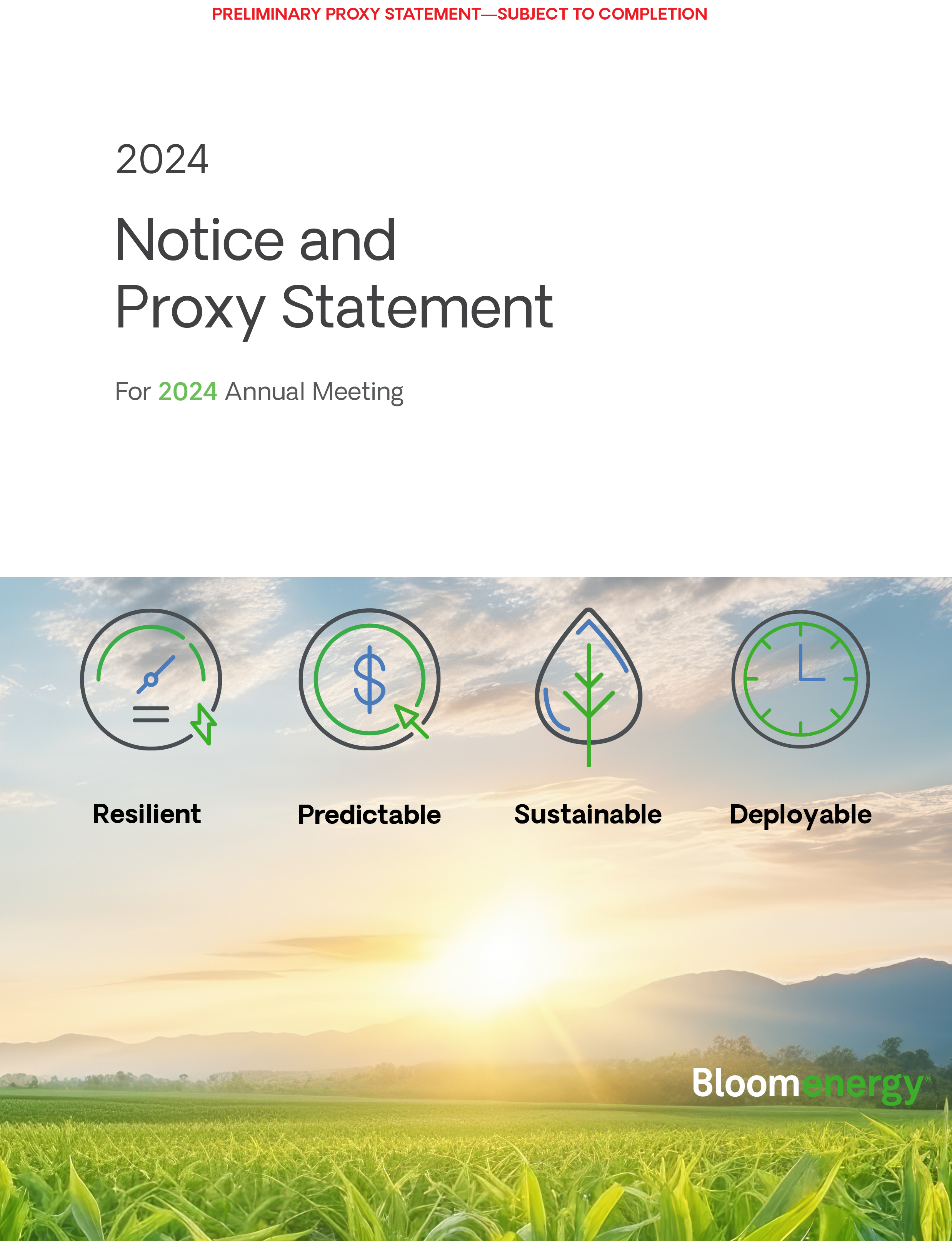
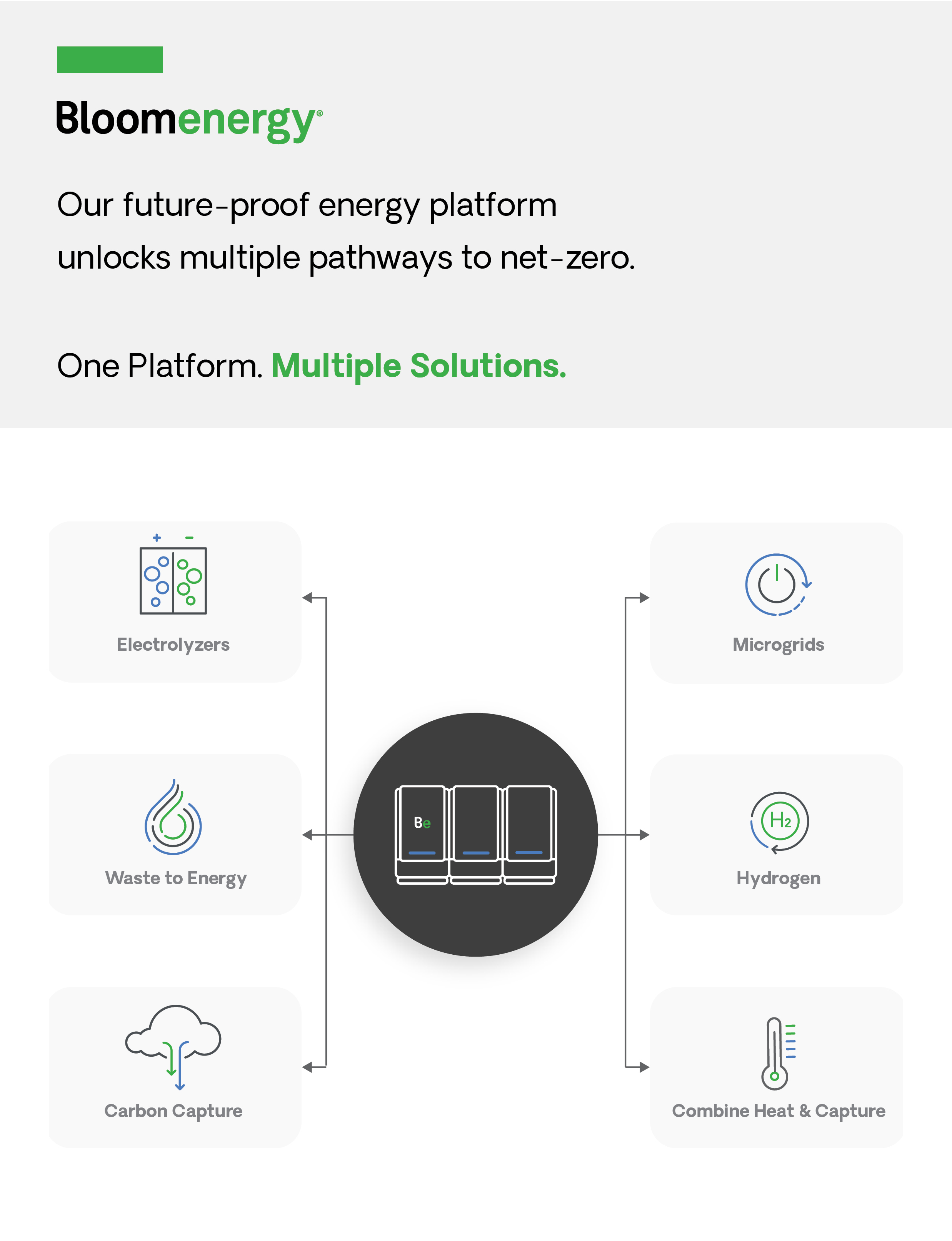




























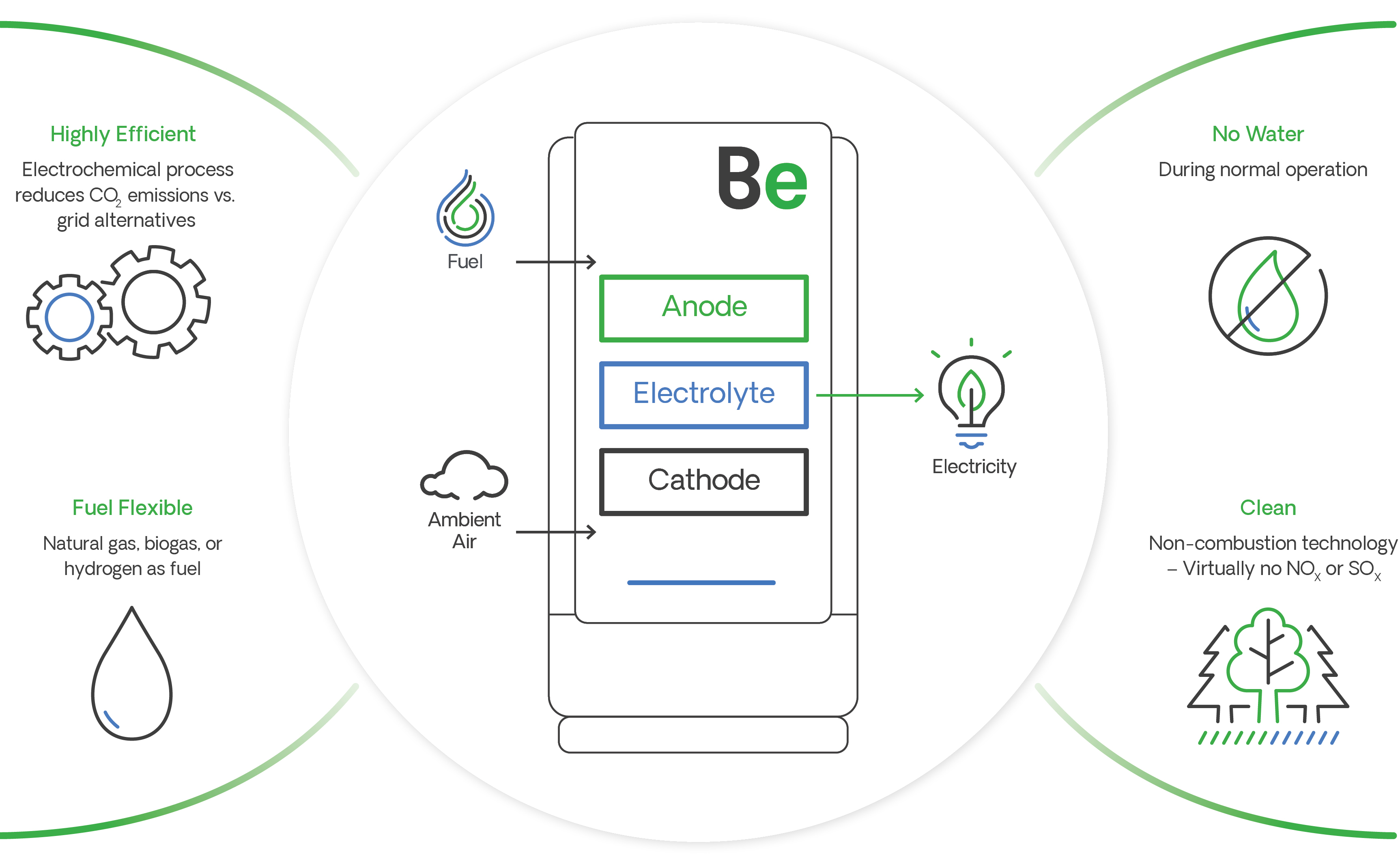
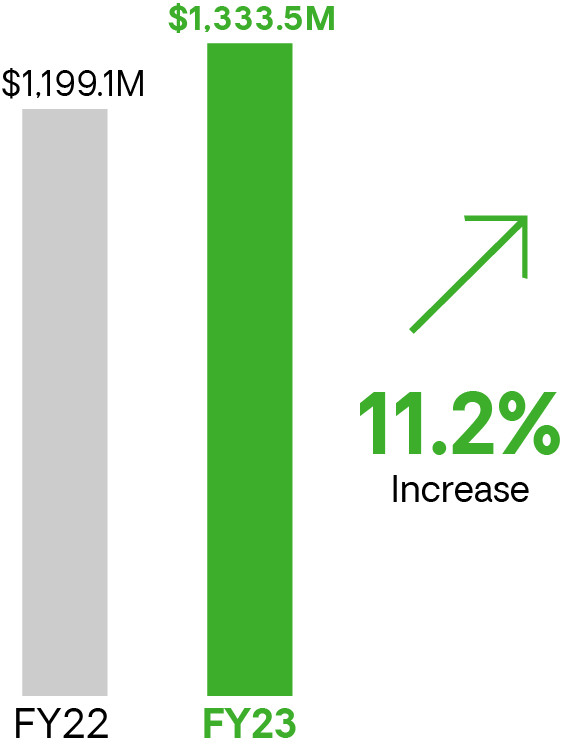
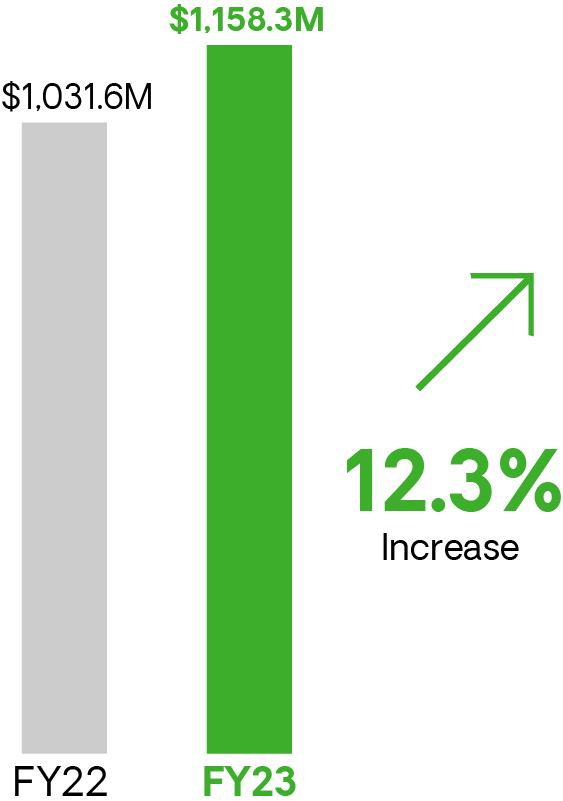
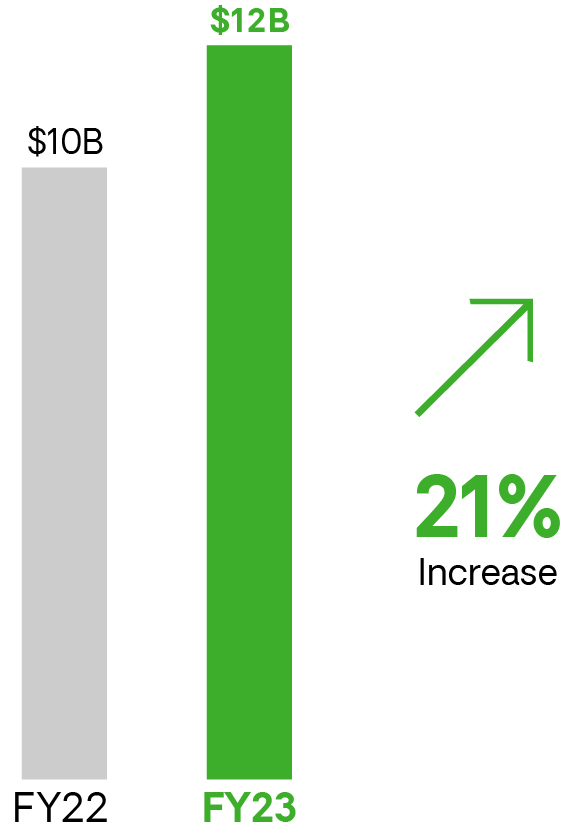
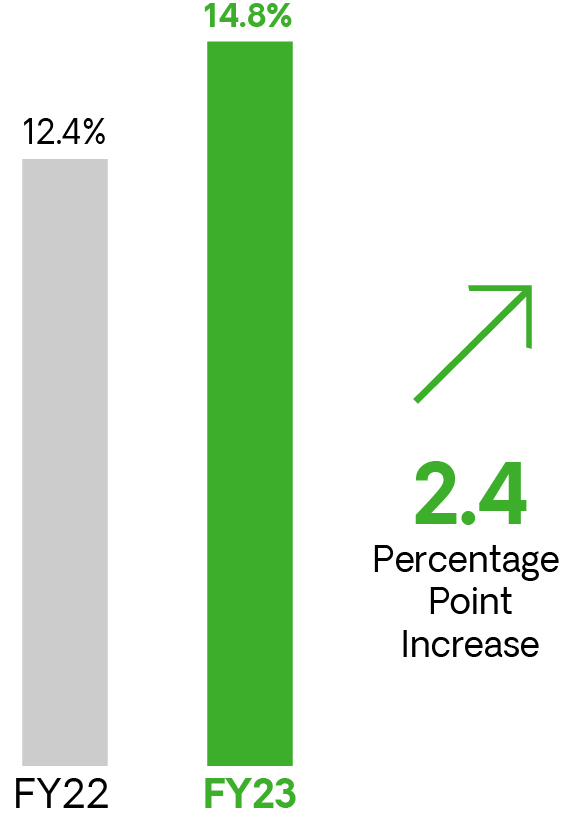
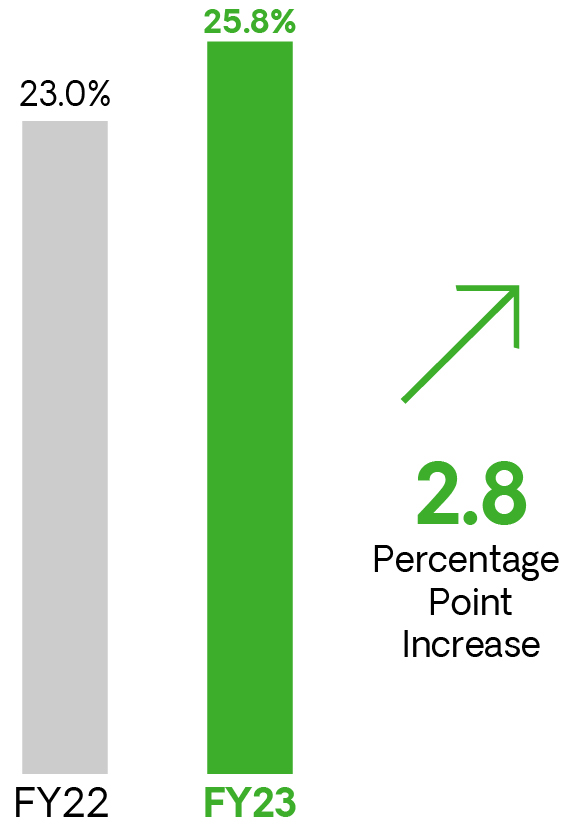



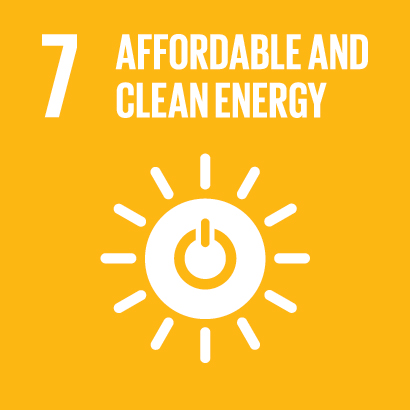
















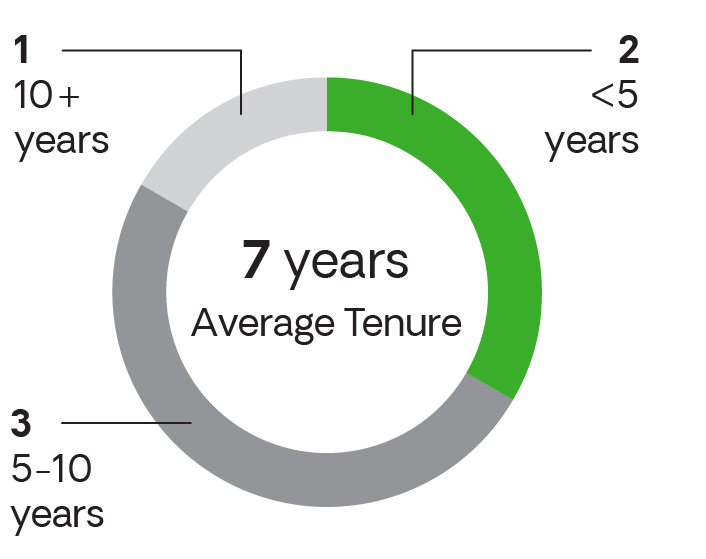
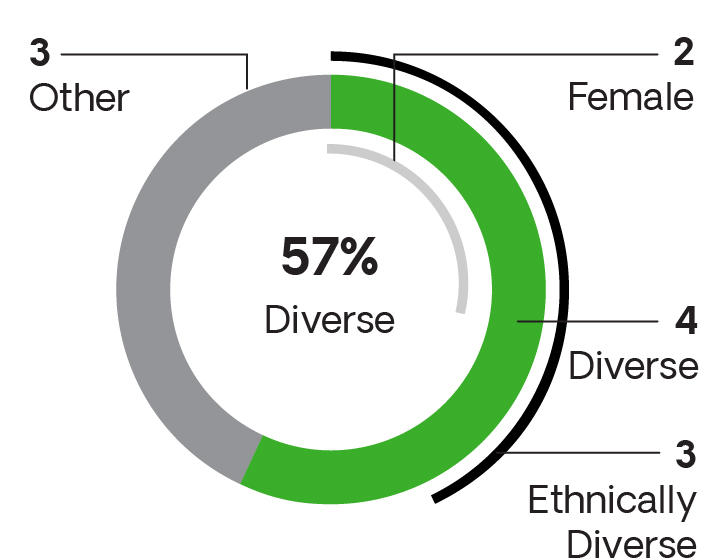
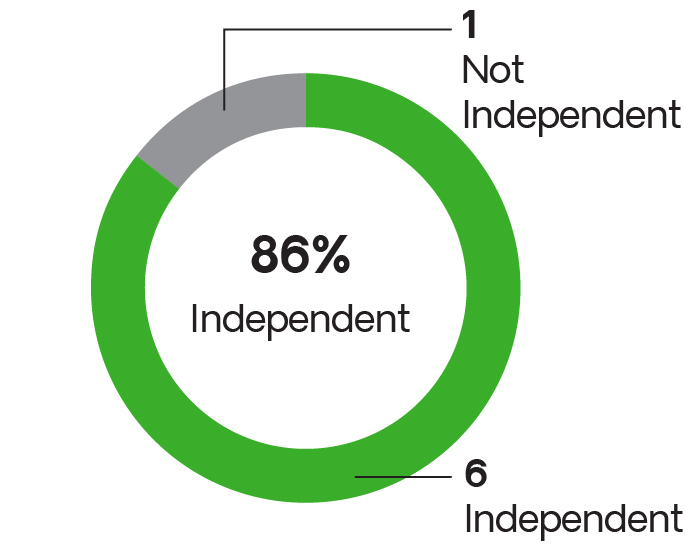
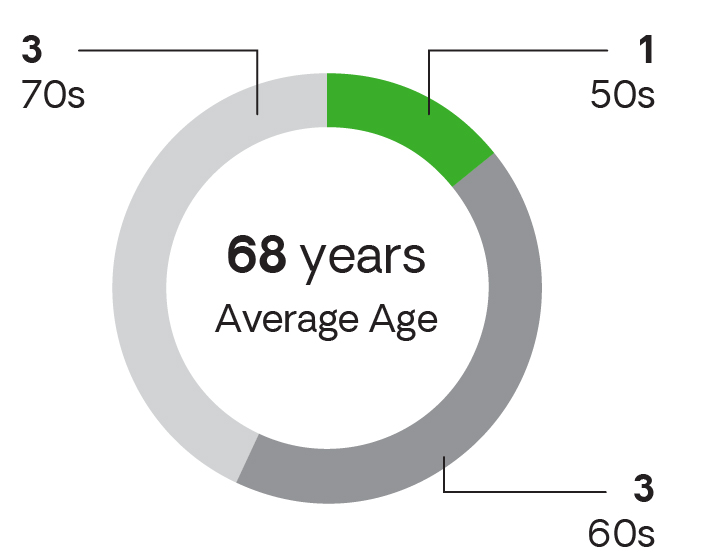
 Single class of common stock (dual-class sunset in July 2023)
Single class of common stock (dual-class sunset in July 2023) Strong lead independent director
Strong lead independent director 100% independent Board committees
100% independent Board committees Annual Board, committee, and director performance assessments
Annual Board, committee, and director performance assessments Regular executive sessions of independent directors
Regular executive sessions of independent directors Stock ownership guidelines to promote alignment with stockholder interests
Stock ownership guidelines to promote alignment with stockholder interests Board- and committee-level oversight of sustainability matters
Board- and committee-level oversight of sustainability matters Board- and committee-level oversight of risk and compliance
Board- and committee-level oversight of risk and compliance Overboarding limits on outside board service
Overboarding limits on outside board service Director resignation requirement following a substantial change in professional circumstances
Director resignation requirement following a substantial change in professional circumstances Prohibition on hedging and pledging
Prohibition on hedging and pledging Clawback policies applicable to cash and equity-based incentive compensation, whether vested or unvested
Clawback policies applicable to cash and equity-based incentive compensation, whether vested or unvested The Board of Directors unanimously recommends a vote FOR the election to the Board of Directors of each of the Class III director nominees, Michael Boskin, John Chambers, and Cynthia (CJ) Warner, each for a three-year term.
The Board of Directors unanimously recommends a vote FOR the election to the Board of Directors of each of the Class III director nominees, Michael Boskin, John Chambers, and Cynthia (CJ) Warner, each for a three-year term.










































 Strong lead independent director with robust and transparent authority and clearly defined responsibilities
Strong lead independent director with robust and transparent authority and clearly defined responsibilities 100% independent Board committees
100% independent Board committees  Majority independent Board (6 out of 7 directors are independent)
Majority independent Board (6 out of 7 directors are independent) Regular executive sessions of independent directors at Board and committee meetings
Regular executive sessions of independent directors at Board and committee meetings Annual Board, committee, and director performance assessments through self-evaluations conducted by an independent third party
Annual Board, committee, and director performance assessments through self-evaluations conducted by an independent third party Annual review of combined chair/CEO leadership structure
Annual review of combined chair/CEO leadership structure Board- and committee-level oversight of sustainability matters and reporting, including a Sustainability Report that aligns with TCFD and SASB disclosure principles
Board- and committee-level oversight of sustainability matters and reporting, including a Sustainability Report that aligns with TCFD and SASB disclosure principles Year-round engagement program for proactive outreach to understand stockholder perspectives, including one-on-one meetings and numerous investor relations touchpoints (e.g., investor day)
Year-round engagement program for proactive outreach to understand stockholder perspectives, including one-on-one meetings and numerous investor relations touchpoints (e.g., investor day) Regular sessions of directors outside of the planned quarterly meetings
Regular sessions of directors outside of the planned quarterly meetings Overboarding limits on outside board service (including Bloom: 5 boards for directors generally; 3 boards for public company CEO directors)
Overboarding limits on outside board service (including Bloom: 5 boards for directors generally; 3 boards for public company CEO directors) Required resignation if substantial change in job circumstances
Required resignation if substantial change in job circumstances Single class of common stock
Single class of common stock  Prohibition on hedging and pledging
Prohibition on hedging and pledging Orientation program for new directors
Orientation program for new directors Long-standing commitment to sustainability
Long-standing commitment to sustainability Robust stock ownership requirements for executive officers and directors
Robust stock ownership requirements for executive officers and directors Clawback policies applicable to cash and equity-based incentive compensation, whether vested or unvested
Clawback policies applicable to cash and equity-based incentive compensation, whether vested or unvested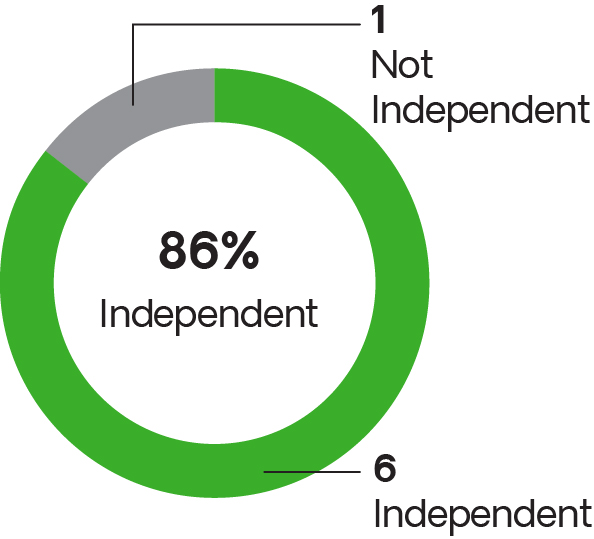
 Mr. Sridhar’s direct involvement as CEO in our operations, enabling him to communicate knowledgeably, timely, and openly with the Board on short- and long-term objectives, and to identify strategic priorities and recommend ways to execute these strategies. We believe this helps the Board focus on important strategic objectives, yet also understand the challenges we face on a day-to-day basis.
Mr. Sridhar’s direct involvement as CEO in our operations, enabling him to communicate knowledgeably, timely, and openly with the Board on short- and long-term objectives, and to identify strategic priorities and recommend ways to execute these strategies. We believe this helps the Board focus on important strategic objectives, yet also understand the challenges we face on a day-to-day basis. Mr. Sridhar’s knowledge of Bloom Energy and the industry in which it operates, which comes from being a founder of Bloom Energy and our CEO for over 20 years
Mr. Sridhar’s knowledge of Bloom Energy and the industry in which it operates, which comes from being a founder of Bloom Energy and our CEO for over 20 years  Mr. Sridhar’s vision for Bloom Energy
Mr. Sridhar’s vision for Bloom Energy  The importance of unified leadership to execute and oversee our strategy during this time of growth and evolution in the business and the energy industry
The importance of unified leadership to execute and oversee our strategy during this time of growth and evolution in the business and the energy industry  The Board’s overall independence (6/7 directors, or 86%)
The Board’s overall independence (6/7 directors, or 86%)  The lead independent director’s strong leadership and meaningful authority over Board governance and operations
The lead independent director’s strong leadership and meaningful authority over Board governance and operations 
































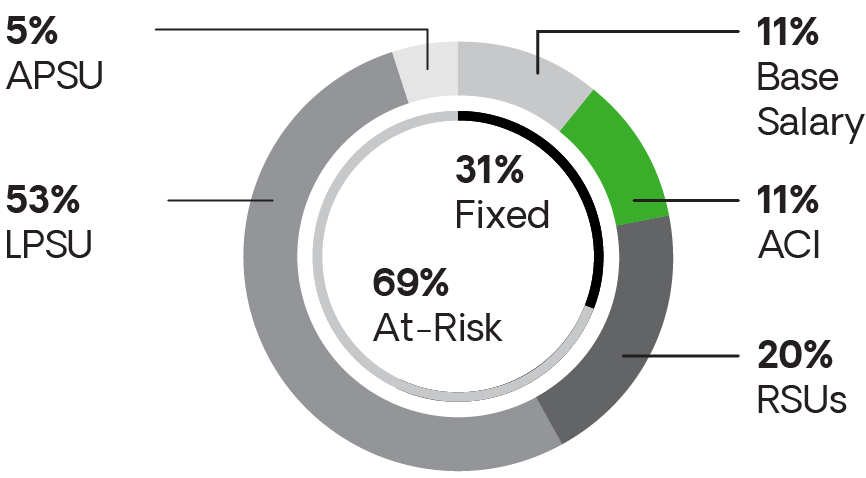
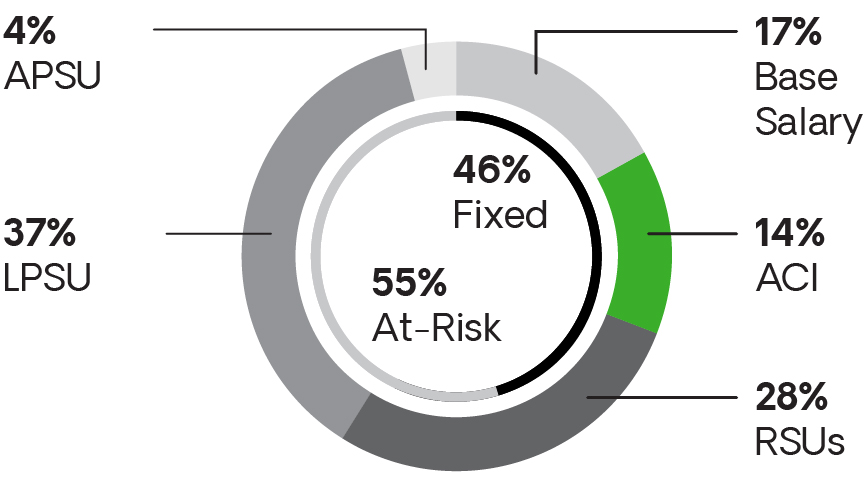
 Compensation Committee Independence – Our Board of Directors maintains a Compensation Committee comprised solely of independent directors.
Compensation Committee Independence – Our Board of Directors maintains a Compensation Committee comprised solely of independent directors. Independent Compensation Committee Advisors – The Compensation Committee engages and retains its own independent advisors and reviews their independence annually.
Independent Compensation Committee Advisors – The Compensation Committee engages and retains its own independent advisors and reviews their independence annually. Annual Compensation Review – The Compensation Committee conducts an annual review of our executive compensation philosophy and strategy, including a review of the compensation peer group and other information used for comparative purposes.
Annual Compensation Review – The Compensation Committee conducts an annual review of our executive compensation philosophy and strategy, including a review of the compensation peer group and other information used for comparative purposes.  Compensation-Related Risk Assessment – The Compensation Committee conducts an annual evaluation of our compensation programs, policies, and practices, to ensure that they are designed to reflect an appropriate level of risk-taking but do not encourage our employees to take excessive or unnecessary risks that could have a material adverse impact on the Company.
Compensation-Related Risk Assessment – The Compensation Committee conducts an annual evaluation of our compensation programs, policies, and practices, to ensure that they are designed to reflect an appropriate level of risk-taking but do not encourage our employees to take excessive or unnecessary risks that could have a material adverse impact on the Company. Emphasize Performance-Based Incentive Compensation – The Compensation Committee designs our executive compensation program to use performance-based short-term and long-term incentive compensation awards to align the interests of our executive officers with the interests of our stockholders. A significant majority of total compensation is performance-based.
Emphasize Performance-Based Incentive Compensation – The Compensation Committee designs our executive compensation program to use performance-based short-term and long-term incentive compensation awards to align the interests of our executive officers with the interests of our stockholders. A significant majority of total compensation is performance-based. Emphasize Long-Term Equity Compensation – The Compensation Committee uses equity awards to deliver long-term incentive compensation opportunities to our executive officers. These equity awards vest over multi-year periods and may be earned over a multi-year period, supporting long-term alignment of the interests of our executives and stockholders and promoting value creation goals and retention objectives.
Emphasize Long-Term Equity Compensation – The Compensation Committee uses equity awards to deliver long-term incentive compensation opportunities to our executive officers. These equity awards vest over multi-year periods and may be earned over a multi-year period, supporting long-term alignment of the interests of our executives and stockholders and promoting value creation goals and retention objectives. Limited Executive Perquisites – We provide limited perquisites or other personal benefits to our executive officers.
Limited Executive Perquisites – We provide limited perquisites or other personal benefits to our executive officers. Stock Ownership Policy – We maintain a stock ownership policy for our directors and executive officers which requires each of them to own a specified amount of our shares as a multiple of their base salary or annual board retainer.
Stock Ownership Policy – We maintain a stock ownership policy for our directors and executive officers which requires each of them to own a specified amount of our shares as a multiple of their base salary or annual board retainer. Compensation Recovery Policies – We have adopted policies that provide for the recoupment of cash and equity incentive compensation from our executive officers resulting from fraud, intentional misconduct, or gross negligence, or in the event of a restatement.
Compensation Recovery Policies – We have adopted policies that provide for the recoupment of cash and equity incentive compensation from our executive officers resulting from fraud, intentional misconduct, or gross negligence, or in the event of a restatement. Prohibition on Hedging and Pledging – Under our Insider Trading Policy, we prohibit our executive officers from hedging any Company securities owned by them and from pledging any Company securities owned by them as collateral for a loan.
Prohibition on Hedging and Pledging – Under our Insider Trading Policy, we prohibit our executive officers from hedging any Company securities owned by them and from pledging any Company securities owned by them as collateral for a loan. Succession Planning – Our Board of Directors reviews on an annual basis our succession strategies and plans for our most critical positions.
Succession Planning – Our Board of Directors reviews on an annual basis our succession strategies and plans for our most critical positions. No Single Trigger Equity Acceleration Upon a Change of Control – Our executive officers’ Change of Control Agreements require a double trigger (termination following the change of control) to accelerate vesting of equity awards.
No Single Trigger Equity Acceleration Upon a Change of Control – Our executive officers’ Change of Control Agreements require a double trigger (termination following the change of control) to accelerate vesting of equity awards. No Supplemental Executive Retirement or Defined Benefit Pension Plan – Other than our Section 401(k) plan generally available to all employees in the U.S., we do not offer a supplemental executive retirement plan or a defined benefit pension plan for our executive officers.
No Supplemental Executive Retirement or Defined Benefit Pension Plan – Other than our Section 401(k) plan generally available to all employees in the U.S., we do not offer a supplemental executive retirement plan or a defined benefit pension plan for our executive officers. No Tax “Gross-Ups” or Payments – We do not provide any “gross-ups” or tax payments in connection with any compensation element for our executive officers, other than our standard relocation benefits. This means we do not provide any excise tax “gross-up” or tax reimbursement in connection with any change of control payments or benefits.
No Tax “Gross-Ups” or Payments – We do not provide any “gross-ups” or tax payments in connection with any compensation element for our executive officers, other than our standard relocation benefits. This means we do not provide any excise tax “gross-up” or tax reimbursement in connection with any change of control payments or benefits. No Unearned Dividends – We do not pay dividends or dividend equivalents on unvested or unearned restricted stock unit or performance-based restricted stock unit awards.
No Unearned Dividends – We do not pay dividends or dividend equivalents on unvested or unearned restricted stock unit or performance-based restricted stock unit awards. No Stock Option Repricing – We do not reprice options to purchase our registered shares without stockholder approval.
No Stock Option Repricing – We do not reprice options to purchase our registered shares without stockholder approval.


 The Board unanimously recommends a vote FOR the approval of the compensation of our NEOs.
The Board unanimously recommends a vote FOR the approval of the compensation of our NEOs. The Board of Directors unanimously recommends a vote FOR the ratification of the appointment of Deloitte & Touche as our independent auditor for 2024.
The Board of Directors unanimously recommends a vote FOR the ratification of the appointment of Deloitte & Touche as our independent auditor for 2024. The Board unanimously recommends a vote FOR the approval of an amendment to our restated certificate of incorporation to add officer exculpation provisions and remove outdated references to Class B common stock.
The Board unanimously recommends a vote FOR the approval of an amendment to our restated certificate of incorporation to add officer exculpation provisions and remove outdated references to Class B common stock.

